
* A Distributed Proofreaders Canada eBook *
This eBook is made available at no cost and with very few restrictions. These restrictions apply only if (1) you make a change in the eBook (other than alteration for different display devices), or (2) you are making commercial use of the eBook. If either of these conditions applies, please contact a https://www.fadedpage.com administrator before proceeding. Thousands more FREE eBooks are available at https://www.fadedpage.com.
This work is in the Canadian public domain, but may be under copyright in some countries. If you live outside Canada, check your country's copyright laws. IF THE BOOK IS UNDER COPYRIGHT IN YOUR COUNTRY, DO NOT DOWNLOAD OR REDISTRIBUTE THIS FILE.
Title: Nine Lives. A Cat of London in Peace and War
Date of first publication: 1941
Author: Alice Grant Rosman (1887-1961)
Illustrator: Diana Thorne
Date first posted: Oct. 4, 2022
Date last updated: Oct. 4, 2022
Faded Page eBook #20221010
This eBook was produced by: Delphine Lettau, Al Haines, Pat McCoy & the online Distributed Proofreaders Canada team at https://www.pgdpcanada.net

By Alice Grant Rosman
| THE WINDOW | ||
| VISITORS TO HUGO | ||
| THE YOUNG AND SECRET | ||
| JOCK THE SCOT | ||
| THE SIXTH JOURNEY | ||
| BENEFITS RECEIVED | ||
| PROTECTING MARGOT | ||
| SOMEBODY MUST | ||
| THE SLEEPING CHILD | ||
| MOTHER OF THE BRIDE | ||
| TRUTH TO TELL | ||
| UNFAMILIAR FACES | ||
| WILLIAM’S ROOM | ||
| NINE LIVES |

COPYRIGHT, 1941, BY ALICE GRANT ROSMAN
MANUFACTURED IN THE UNITED STATES OF AMERICA
Van Rees Press • New York
TO
AGNES AND BETTY
CIVIL AMBULANCE-DRIVERS
IN LONDON UNDER FIRE
London,
1941.
CONTENTS
| I | First Meeting | 3 |
| II | A Strong, Silent Cat | 13 |
| III | Return from the Country | 22 |
| IV | He Acquires a High Garden | 30 |
| V | Mice and Men | 41 |
| VI | A Cat Is a Tie | 51 |
| VII | The Rich Train | 59 |
| VIII | A Cat of No Mean City | 75 |
| IX | Interview with a Royal Cat | 89 |
| X | In the Silly Season | 98 |
| XI | He Smiles | 108 |
| XII | Prelude to War | 118 |
| XIII | London Waits | 128 |
| XIV | Empires, Dead and Alive | 140 |
| XV | Lest We Forget | 149 |
| XVI | In the Battle Area | 158 |
| XVII | The Rug that Went to Hospital | 170 |
| XVIII | Noises in the Night | 181 |
| XIX | London Calling | 192 |
| XX | The Backbone of Britain | 201 |
| XXI | “A Military Objective” | 209 |
| XXII | In the Morning | 218 |
| XXIII | V for Victory | 230 |
Nine Lives
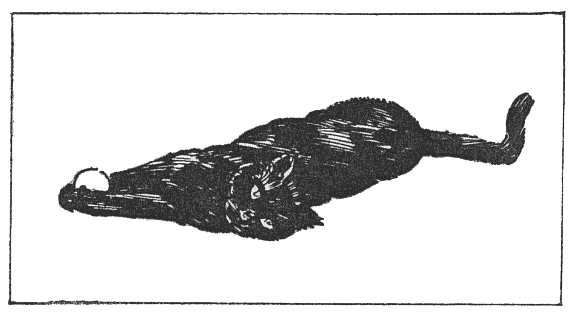
 s a race cats are not gregarious or co-operative,”
says my encyclopedia, approaching a
serious subject in a properly respectful
manner. Gregarious and co-operative are
adjectives no compiler would use about a nonentity, for
example. If he had said “the cat is an unfriendly beast”
I should have despised the man, but this judicious
handling of the subject at once acknowledges a cat’s
natural reserve and his right to indulge it.
s a race cats are not gregarious or co-operative,”
says my encyclopedia, approaching a
serious subject in a properly respectful
manner. Gregarious and co-operative are
adjectives no compiler would use about a nonentity, for
example. If he had said “the cat is an unfriendly beast”
I should have despised the man, but this judicious
handling of the subject at once acknowledges a cat’s
natural reserve and his right to indulge it.
“The dog has an extraordinarily keen intelligence,” proceeds the same authority, “and more highly developed mental qualities than any other animal.”
Ridiculous! Let us beware of sweeping statements. The man does not know everything. He has never met your cat or mine.
He has never seen Samuel Penguin who, far from “lashing his tail to denote anger” as laid down in the encyclopedia, waves it for pleasure or in response to conversation; who is a fellow of infinite capacity and often seems more dog than cat and sometimes more penguin than either.
This pleasing chameleon has now ruled our household for more than ten years and shown his mettle in peace and war.
This world of total war would have seemed utterly fantastic on that day years ago when we came to the conclusion that life seemed rather unfurnished without a cat.
An old friend, recalling our faraway home where there had been a long succession of animals, brought the matter to a head.
“I did think I should be sure to find a black cat sitting by the fire,” she said, calling to see us in London. “It seems the one thing lacking.”
It was. For some years there had been reasons against it, but now these were gone and we decided to put the matter in hand at once.
There was an element of the ridiculous in the transaction which followed, and, seen at this distance of time, it seems the fitting prelude to our acquaintance with Sam. In no other way could we have acquired such a cat.
We discarded pet shops as unlikely to supply what we needed. We wanted no curled darling with a long pedigree, but a fellow of character and personality, one orphaned perhaps or lost and consigned to a Cats’ Home.
We knew nothing of such institutions, however, so telephoned the nearest Animal Society to ask for advice.
“Oh, I shouldn’t apply there if I were you,” exclaimed a sympathetic voice at the other end.
“Really?”
“Not on any account.” She was firm about it, though we never discovered why. Perhaps it was a question of professional jealousy. “Now, what kind of cat do you want?” she inquired, in a considering voice.
“A large, ordinary, influential house cat.”
We had come to the right place. The firm young woman was not to be daunted by adjectives or the fact that finding cats for casual strangers was no part of her ordinary routine.
Having asked our address she triumphantly produced the name and telephone number of a member of her Society’s Council living in the neighborhood.
“Ring her up,” she advised kindly. “I am sure she will be able to help you.”
Clearly this was a most amiable organization, which we had chosen by random from the telephone book, and unencumbered with red tape.
We therefore lost no time in getting in touch with Mrs. Cross of the Council—to give her a random name—and she proved as prompt as the Secretary.
“Can you wait a week or ten days?” she asked.
Rather dazed at such unquestioning affability we agreed that we could.
Half an hour later Mrs. Cross was announced and there walked in a delightful looking stranger in early middle age.
“Do forgive me, but I had to come and see the kind of home the cat was going to have,” she said.
We were friends in a moment. Mrs. Cross is like that, amusing, preposterous, and even at times devastating, but with an air that nobody could resist, and while she remained in the district she was a source of continual entertainment to us, even though dogs and not cats were the interest of her life.
One day the family doctor who had brought her into the world called to see her and in the course of conversation she said suddenly:
“By the way, doctor, I have often meant to ask you. Do you believe in vivisection?”
“Certainly, my dear, certainly,” said the old man beaming.
“Oh, you do! Then please leave my house at once,” said the lady firmly. “And never come here again. Our acquaintance is at an end.”
“If you’ll believe me,” she told us, “he actually argued and protested and I almost had to eject him by force.”
After a year or two we suddenly discovered that she had left the neighborhood, but it was not till Christmas that we learned the reason.
“You will probably be surprised to hear I have married again,” she wrote on her card of greeting. “The point was that the brute of a landlord gave me a fortnight to remove my dog or leave the flat.”
It seemed a new and original reason for marriage but I hope it was a success. We lost sight of her, but she remains the kind intermediary who introduced to us the most wonderful cat in the world.
That first day, having looked over our proposed arrangements for his comfort, she told us that he was black and had been discovered—a stray—at an animal shelter and taken home by one of her friends on the Council.
“But she will be willing to part with him because she has four cats already and the Colonel is complaining that he can never find a vacant chair. Cats,” said Mrs. Cross, “are like the ticket agencies. They always have the best seats in the house.”
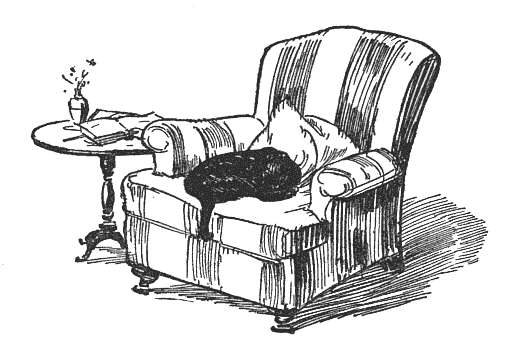
The circumstances seemed propitious. The stray had been rescued for conscientious reasons and would be no deprivation. The profits in the transaction would be fairly matched, the strange Colonel regaining his chair and we acquiring a cat of the house.
His temporary guardian brought him herself in due course, and he was not merely wearing a smart red leather collar but a silver medal engraved with our name and address. The latter was for his protection rather than our pleasure, of course, to guard him from further adventures in the underworld.
The streets of London are full of self-contained and competent cats, going about their lawful occasions, but we quite lost sight of this as we listened to her warnings on the dangers he might encounter if we let him out. Luckily this is a top flat, which eased her mind a little, and more than ever impressed by the sense of responsibility of this excellent Society, we promised to guard him like diamonds, as the melodramas say.
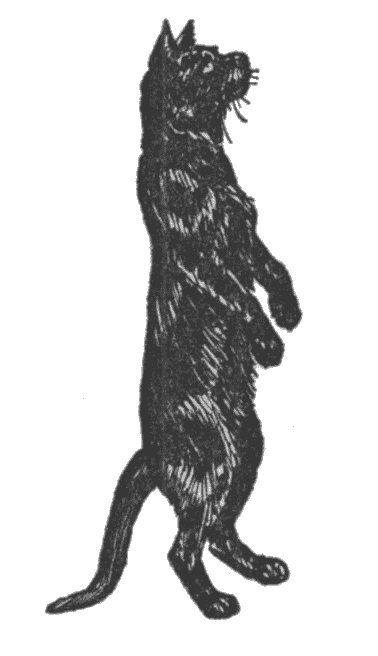
The new inmate of the house, meanwhile, released from his basket, was taking stock of the premises with natural suspicion, ignoring the company. He retreated before our words of welcome and at last vanished behind the couch, where he sat stolidly, peering out with a noncommittal expression.
A bowl of lunch was ready, fortunately, and his guardian was left to do the honors, as the cat seemed highly temperamental. This had the desired effect, though we were unprepared for his response.
“Sit up, Samuel Penguin,” she said, standing before him, bowl in hand.
The creature rose to his hind legs, dangling his forepaws like fins in a balancing manner. With his small, neat head and shining satin figure he was a penguin almost to the life.
“How can you bear to part with him?” we exclaimed.
She laughed.
“Sam,” she said, “you are a success.”
On this May morning in the London of 1941 he lies spread out in an easy chair, sleeping the sleep of the just. Has he not sent some of his breakfast to a Persian colleague who was bombed from his home last week, and so done his bit for England, Home, and Beauty? What cat could do more?
A burst of spring sunshine breaks through the clouds and Samuel Penguin expresses his appreciation in the usual way, rolling over on one ear, then dropping to sleep again, all his form stretched out to the warm rays.
The barrage balloons, a myriad of silver fishes far overhead, descend as the sky clears and float half way, and “George,” the nearest, turns in the breeze and bows politely. Seen at this angle he is no longer a fish but a prize ram with a horned nose. And now he is coming down after all, panting with hunger you would say, to lie like a fainting elephant under the ministering hands of his crew.
George almost looks in at our windows, yet when, in the winter of 1939, we went to find his resting place, we searched in vain for hours. Some of the households under his protection had thought of the men who serve him, far from their homes at Christmas, doing this important work, yet perhaps forgotten because unseen. A Christmas cake with almond icing, rich, fruity and homemade, was the first production, then mince pies, nuts, games, cards, biscuits, chocolate, sweets, cigarettes, and hand-knitted socks. George, it seemed, was popular, and contributions came rolling in, even the little shops adding their quota as the news went round.
It was an icy day when some of us set out in search of George’s habitat. The postman did not know the address, or the passersby. We ruled out the police, who might have thought we were seeking military information, and it was the coal man who finally led us to the wooden door.
A sentry, in tin hat and Air Force blue, opened it a few inches and looked out suspiciously.
“May we come in?” we asked.
“No,” said the sentry.
The corporal in charge thought otherwise, however, and we were invited into the mess room, already garlanded for Christmas and with a brave fire at each end.
Outside in a desolation of frozen mud lay George, tucked under his tarpaulin on which snow had been falling intermittently since dawn, but not one of the men wore his overcoat, and their cheeks were glowing.
They felt fine, they said.
Things have developed since those days (for we still sometimes knock at the wooden door, when some suitable gift has come into our hands). The crew have built better quarters and made themselves a garden. A cat has taken charge of the crew. He basks on a ground sheet, directing operations when weather permits, otherwise sleeps by the mess room fire, they say.
Like Samuel he wears a white disc, denoting that he has been registered by Narpac—National Air Raid Precautions for Animals, so that if the worst should befall, he will not be left injured, homeless, or neglected.
News has just come up that Fluff the Persian is very ill and would not touch his breakfast. He belongs to a work-woman whose little home was bombed out the other night and who is accommodated nearby for the moment with her family. As soon as she finds new quarters the authorities will provide for the furnishing.
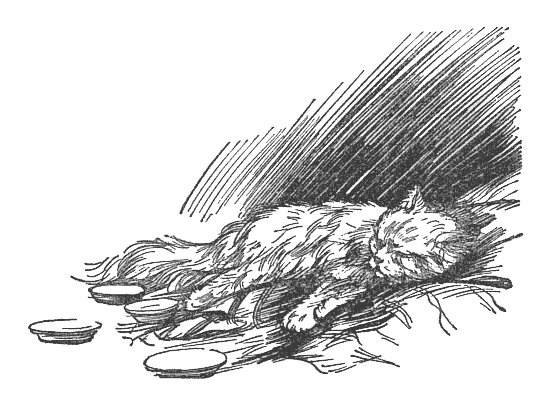
Fluff, the canary, the eight-day clock, and her youngest daughter’s best hat were rescued at the height of the raid. It was a bad night and even Sam was exhausted afterwards for days and only woke from his dreams to eat.
The smoke-gray Persian with orange eyes is the idol of his family and has not the stamina of S. Penguin.
Taken to the Animal First Aid Post where hundreds of his fellows have found shelter and care, he fretted for his friends and his familiar place and would not be persuaded to eat. Expert opinion called it shock and ordered warmth, care, and food if he could be persuaded to take it.
They have him in their room now, and perhaps the canary and the eight-day clock will comfort him as he lies in his blanket, hearing the voices he knows. Four saucers surround him, milk, meat, water, and fish.
Even Sir Samuel Penguin could not ask for more.
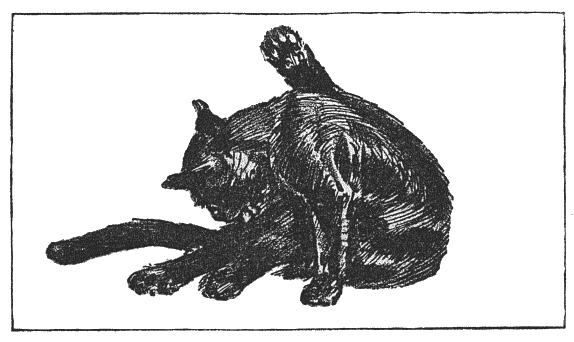
 t is hard to believe that the Sam of today, who
lifts his head at the sound of the Air Raid Siren
and glances from one to the other of us to see
if anything is going to be done about it, is the
same cat who for many months looked us over and
went his own way, revealing nothing.
t is hard to believe that the Sam of today, who
lifts his head at the sound of the Air Raid Siren
and glances from one to the other of us to see
if anything is going to be done about it, is the
same cat who for many months looked us over and
went his own way, revealing nothing.
One might imagine he sensed the fact that we had each secretly been a little disappointed in his appearance, except that he was far too impersonal to be suspected of any interest in the matter.
Though we did not put the heresy into words at the time, we agreed later that he was not quite the cat we had hoped him to be; he was too long and thin; he was an odd-looking cat with none of the debonair charm of his predecessors in the family.
There used to be a theory when we were children that to attach a cat to a new home you must thoroughly butter his paws, the idea being that by the time he had licked them clean again, he would have forgotten his old address and settle down contentedly. This is of course a libel on a cat’s memory and mental attainments. If he stayed it must have been because he liked the butter or had no fault to find with his new surroundings.
There was no necessity to try this or any other experiment on Sam because he accepted the situation and saw his guardian depart without making any attempt to escape. His manner, however, lacked enthusiasm, and when he could at last be persuaded to sit on the hearthrug by the fire he did so with shoulders hunched and with none of that pleasant abandon of the comfortable cat.
“Don’t you like the place, Sam?”
No answer. He stared ahead of him at a world of lost delights we could not see and where no alien voice could reach him.
Carried to my bed that first night, he sat there in the same unyielding manner and had not attempted to move when I fell asleep. Next morning he had vanished. We called and searched for half an hour without avail, until suddenly a black head appeared over the top of my wardrobe.
This walled fortress could have been reached only by way of the dressing table, the mantelpiece, and a flying leap, unless the cat had wings, yet nothing had been knocked over or disarranged.
“He must be a witch’s cat,” we decided. “Better go and lock up the broomsticks. We shall have to be careful.”
It required a ladder to bring him back to earth, for he sat there stubbornly, watching our efforts to entice him with gold, unwinking eyes.
He was in fact ungregarious and non-co-operative, and, having revealed his hiding place, he never went there again.
It was not a good beginning, but we made excuses for him, for he had his virtues. His manners were above suspicion, and in the kitchen it was reported that he could be left with fish, flesh, or fowl, and he would not dream of touching it unless invited. Nothing would induce him to come in to meals and ask for food. It might be that too much discipline in early youth had soured the cat, we thought, and tried to coax him with saucers of milk and cream. It was no use; he turned his back and marched off, and we soon discovered that he drank nothing whatever.
In fact, like the good young man he neither drank nor swore.
When after a month or two he had still never been heard to make a sound of any kind we came to the conclusion that he must be dumb, but his late guardian denied it. She revealed, however, that he had never been a cat of the first consequence in her house, where she had had her favorite and the cook another. This did not suggest a very intimate knowledge of his disabilities, and it seemed likely there was something wrong with his vocal chords.
We tried a little gentle massage, but he still retreated before all advances, and if too much pressed he would retire to a distance, aloof and proud, or stand on his hind legs and impatiently push open the door. When it was shut he would rattle the handle at first from the floor and then sitting on the nearest chair, eyes dark with indignation, hitting out at it with a long arm.
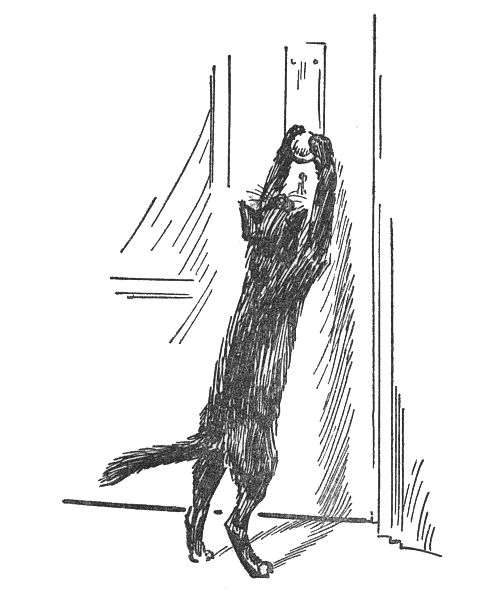
After all, the cat was clever and entertaining, and what more could anybody ask? As we grew accustomed to his looks we began to find graces in them as we forget the plainness of a human friend.
His fur was of the finest, and he was always beautifully groomed. Visitors began to remark his magnificent and shining coat and make fun of his oddities, for he would sit looking them in the face with a steady and most uncatlike gaze, his small forepaws neatly together, head up, sides sleek, and a ridge of upstanding fur neatly tracing his spine.
This peculiarity puzzled everybody. It was as though his coat had been put on back to front, or as one critic disrespectfully suggested:
“Sam, I regret to say you have an incompetent furrier.”
Presently we discovered that he could think, in spite of those who like to declare that animals have instincts but nothing more.
He would stroll in looking for a resting place and examine every chair and couch with a considering air. Often he would discard them all and make off down the passage, looking into the bedrooms, one by one, pausing a moment to make up his mind and then going on again until the perfect place was discovered. He would take no advice and cared for no preparations. If followed he would retire indignantly.
He learned all the ways of the household and how to use them to his own advantage. When a shrill whistle announced that stores were on the way up in the service lift you would see him racing, a black streak, for the kitchen. We had been advised that a diet of raw steak was the proper food for a cat of his color, and this may have been a pleasing change for Samuel Penguin, who certainly thrived on it and began to fill out, now there were no longer four rivals to compete with him for the meal. Soon we were amused to notice a change in his tactics.
Ethel in the kitchen liked his company and left the dividing door ajar on the ground that the rattling of handles was liable to fuss her when she was at work. Now when the whistle blew Sam would cock his ears and listen for further developments. He had soon discovered that other things besides his dinner came up in the lift and learned to distinguish one thud from another as they were transferred to the table. Resounding bangs or the rolling of fruit and vegetables were of no interest to a cat. A soft thud and rustle of paper announced that the butcher had done his duty and it was worth while to get up and have a look.
The strict training of his youth still held, however. He would sit on a chair and watch the parcel opened with dignity and self-restraint, never venturing to touch it until invited.
“No one could ever call him a greedy cat,” defended Ethel, showing us the bowl with one piece of meat uneaten. “He always does that—what my granny used to call leaving something on your plate for Mary Manners.”
In time his interest in parcels, thanks to Ethel’s indulgence of the fancy, began to include anything we brought in from town. He would rise on his hind legs, paws spreading until his curiosity was satisfied, and, when the wrapping was large enough, sit in it and wash his shining nose.
It was at least something that he made no complaint of our hospitality and had begun even to tolerate conversation, but still obstinately he held his tongue, a strong, silent cat who neither meowed nor purred.
The sun has passed from his chair, and Samuel Penguin has just drawn attention to the fact by a sound between a cough and a grunt, hinting that he would like to be moved back into the glow, thank you.
Oh, yes, he was deceiving us all those months for some reason best known to himself. His vocal chords are in excellent order, and he often has much to say to his intimates though still reserved in general company.
However, he has long mastered the establishment, whereas ten years ago we were on our trial, and he cared little who came or went.
To say the least of it this was unflattering and we told him so. We boasted of the charms and attainments of his predecessors in the family.
Sam turned his back on these puling reminiscences or mounted a chair by the window and, paws on sill, looked down on the passersby. Pigeons wheeled across from one tall building to another out of the wind to settle in galleried rows for the night. The cars and taxis running past had yellow eyes like his own, and they twinkled back at him through the gathering mist. He seemed to like them.
By day when the weather grew milder, he would spend hours sitting aloft on the stone coping of a little balcony set in an angle of the wall, but one morning just before breakfast he was missed and we called him in vain. Every nook and corner was searched, and the coping was so wide that nobody thought of its danger.
This is an odd building with stone ornaments here and there and balconies tucked at different points on different floors, as though the architect had detested uniformity and determined to give every flat its own individual character.
The plan has its virtues, not the least among them that it saved the life (or one life) of Samuel Penguin. He must have leapt after a bird on to a ledge and slipped, for we discovered him at last on another balcony, twenty feet below.
A rescue party brought him back, whole but subdued, and for days he walked like a cat on hot bricks. His paws were very sore and his relieved family waited on him hand and foot as he slept off the nerve strain of his perilous adventure. A small piece of liver was ordered with his steak as likely to tempt the appetite of the invalid; a little cream was offered in a particularly attractive saucer. Eiderdowns were put down for his bed. He accepted the first and last, but turned from the cream with distaste. Nothing would induce him to drink.
“It will oil your works, Sam, and help you to purr.”
He had no intention of purring or taking anyone’s advice. Yet perhaps he listened though he gave no sign. Who can say?
“You are beautiful but not very gracious, Sam,” said the head of the house between indignation and amusement. “Why will you never sit on my knee?”
A day came when he got up and sat there one whole long afternoon, as though he alone of any of us knew that it was the last chance he would ever have.
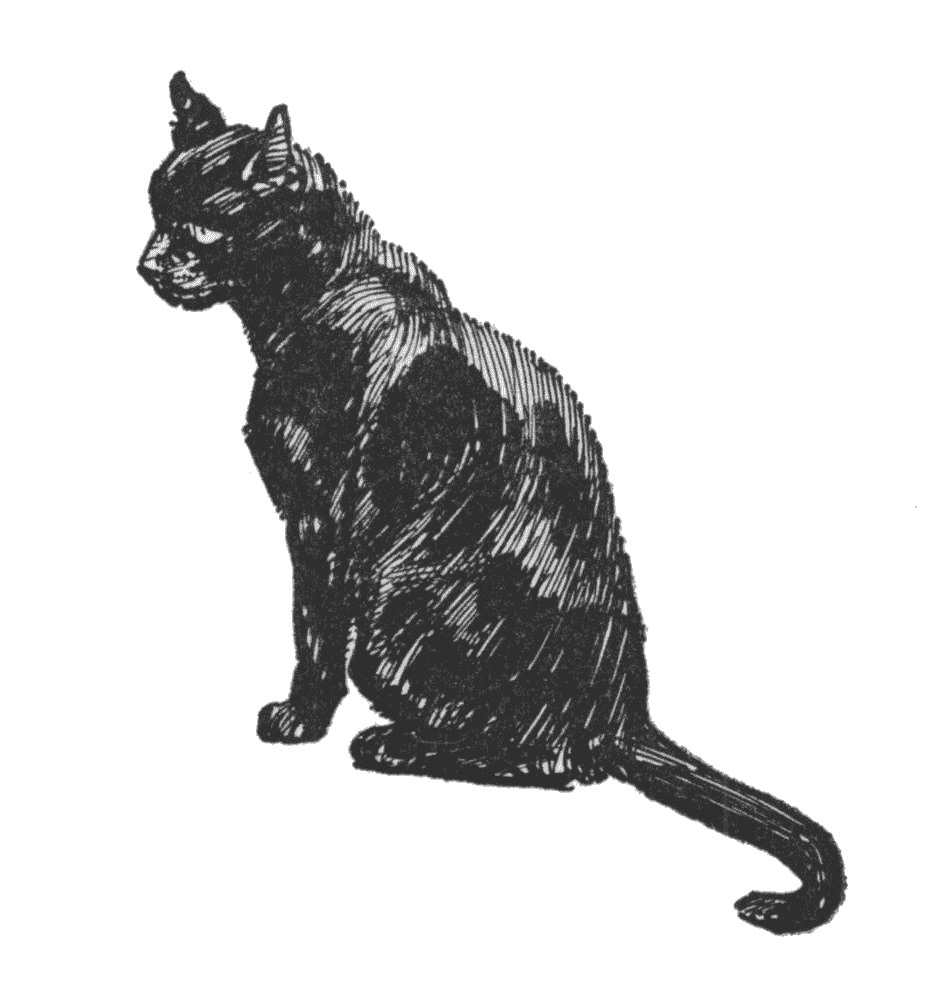
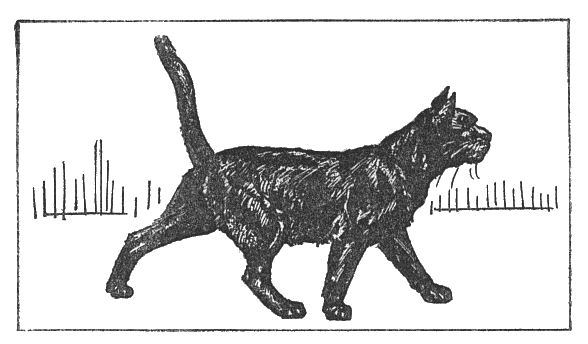
 arkness fell upon Sammy Penguin’s family,
and we who were left decided to go away
from London to the country for a little
while taking the cat of the house with us.
arkness fell upon Sammy Penguin’s family,
and we who were left decided to go away
from London to the country for a little
while taking the cat of the house with us.
We bought a red leather lead to match his collar and a traveling-basket, dubiously displaying them before him. His response was better than we could have hoped, for he leapt into the basket and promptly went to sleep.
Having the railway compartment to ourselves next day, we set him free and he stood with his forepaws on the window ledge gazing out with evident interest. He even accompanied us to the restaurant car for luncheon and ignored in a dignified manner the advances of fellow travelers and the familiarity of the waiter’s “Well, puss, what can I do for you?”
Puss indeed! Never in his life has Samuel Penguin responded to this childish form of address.
The hotel had not been warned to expect a cat visitor but the reception clerk was a reasonable man.
“If we take dogs, why not cats?” he said.
Superstition may have played its part in Sam’s cordial reception. The hotel was newly opened and the cat was black. What better omen for a prosperous season? His collar hid the fact which even we had been slow to discover, that he wore a neat white tie, but no harm was done. He became not merely a welcome but also a popular guest.
This was some of the most beautiful country in England, deeply wooded hills and flowering valleys ringed by old cities rich in history. It was now early summer, hard perhaps for a cat not to be out and free in a world full of bird song and deep grass. Yet Samuel Penguin showed no disposition to escape to these delights but would sit by the window which looked towards Bredon, enjoying the sun and the flash of passing wings, or move to the dressing table, to sniff with obvious delight the flowers brought in to us from friendly gardens.
“The cat is esthetic,” we said, but quickly learned better.
As soon as we fastened his lead and led him out of doors, he raced for the lawn, in search of the salad which every cat requires. Never having owned a purely indoor cat before, we had not realized the need. He passed the larkspurs, delphiniums, and roses, which had seemed to charm him, without a glance and eagerly cropped the coarse grass, sneezing from time to time as it tickled his whiskers.
This refreshment over he was ready to go indoors, walking with great dignity, tail aloft, and retire for a bath and a sleep.
He was soon a familiar resident. The porters knew him; the head waiter gave us counsel about his diet; chambermaids from upper floors came down to our room to entertain him when we were out; the manager made inquiries as to his health and comfort.
At night he slept in his basket, rising at dawn to push aside the window curtains and look out at the new day.
Then “half-term” came at the public school in the town, and early in the morning parties of tall lads invaded the hotel to breakfast with visiting parents. Somehow Sam eluded us and slipped downstairs to the vestibule. There we found him, blandly sitting in the center of a concourse of boys.
We should have expected him to run for his life, and we should have expected them to be self-conscious, but not a bit of it. They addressed him, showed him off, and introduced him to assembling parents.
They said to us: “Your cat is the talk of the place. Is it true he has been seen walking on a lead in the public gardens?”
It was not true, but it didn’t matter. Sam was a success and he knew it. His silken coat glowed in the morning sunshine; his eyes turned in rather smug approval from one young lord of creation to another. This was his world and we were nowhere.
We began to suspect that in the past of which he could not tell us the Penguin had been a man’s cat.
What then had become of the monster? Had he basely deserted his good companion and left him to fend for himself, or died perhaps, forgetting to provide for his orphaned cat?
The wiseacres tell us cats care only for places and nothing whatever for their human friends, but Sam, in an acquaintance of years, has disproved all theories, and still faithfully he is the friend of man.
There is an alternative explanation, of course, for we soon discovered that if caught up, however gently from behind, he would turn and fight like a demon. Had he, in that tragic past, been stolen, carried away, and then escaped from his captor far from home; stolen to be sold to the vivisectionists perhaps, or to some lesser villain dealing in hides and skins? I had a friend once who used to take pleasure in reading me the daily advertisements—“damaged house cat, one and eleven pence.”
There are scores of well authenticated instances in which cats, moved to a distance, have returned to the old address, finding their way across strange country and tramping incredible miles.
We once met an even more remarkable traveler. He was a cosmopolitan cat who regularly went round the world in an ocean liner, waited on by a steward in an officer’s cabin. When the ship touched port he liked to go ashore with the rest of the passengers and would hurry down the gangway ahead of them.
One night in Bombay he was late returning and, alas, the liner sailed without him. His friends on board were loud in their lamentations, believing him lost forever. The traveler cat, however, knew his way about. He was no tyro. He simply boarded the next ship of the line, sailed home in her to Tilbury, stepped ashore and crossed the docks.
There in her familiar berth was his own vessel getting ready for sea again. He walked up the gangway and into the officer’s cabin.
Samuel Penguin, an individualist, seemed quite indifferent to his change of residence, and never during his six months in London had he shown any disposition to run away. Yet, when our stay in the country came to an end and we returned home by road, he exhibited the greatest excitement whenever we entered a town. Otherwise he sat humped in his corner with an air of dejection or fidgeted from seat to seat.
The passing fields and little woods, the flowering hedgerows, and even the birds meant nothing to him. It was evident that he was no country cat, but a man about town.
At length the tiresome journey was over and the car drew up before our block of flats. Directly the door opened he jumped out and raced for the lift, as though he had never lived anywhere else in his life.
Stranger still, quite suddenly that night he purred to us!
He was not dumb; he had been shamming, looking us over with natural suspicion. For two years he had been moved here, there, and everywhere—from some life we could not guess to the comparative haven of an animals’ shelter; from there to the Colonel’s house where four more favored cats were already in possession; and then to our flat and finally to a hotel in the country. What could a reasonable cat think of these perpetual changes? No sooner had he become accustomed to one habitation than he was thrust out, a stranger, into the world again.
Returning to the familiar flat perhaps restored his sense of security, and so he broke his long and determined silence and blissfully sang himself to sleep.
Or was it just that the daily salad had oiled his works? Discussing this knotty point we saw that somehow and from somewhere, now we were back in town, we must find time to fetch him grass.
It is not to be supposed that he threw off all reserve and unbent completely, but he was now the cat in possession.
When friends came to stay he would bustle after them and survey the luggage as it was unpacked like one making an inventory. While the window cleaner did his work he would follow him from room to room and sit watching until it was done, like a suspicious housewife. The man was one of his satellites but this made no difference; and when anyone moved a piece of furniture he showed real agitation. (That wretched first owner surely must have deserted the cat.)
Slowly we began to see that in some ways he was more dog than cat. He walked, for instance, with his tail aloft like a banner and waving a little at the tip; and when the hall door bell rang, he would point his ears and rush to see who was there.
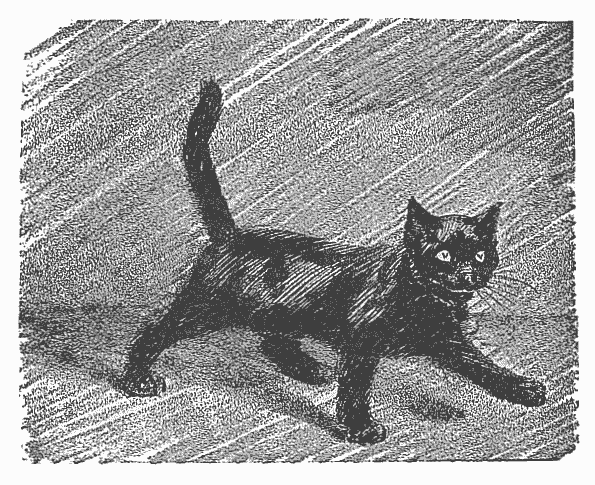
On the other hand it cannot be said that he was hospitable after nightfall. He liked early hours, and after ten p.m. would begin to give visitors a hint that it was time to depart. At first he stared them out of countenance, and if this had no effect would try physical means, leaping on the chair arms and at last tearing madly about the flat until the door was shut in his face. No sooner did they make a move than he was still again and would pompously see them to the lift like an early Victorian papa who meant to have no nonsense.
He slept at night on somebody’s bed or easy chair that autumn, but by and by when all was still except for the passing of late cars on the road, or the whistle of a distant train, he would get up and march about on his own affairs. By day his steps were soundless, but now he positively tramped, so that one of us, waking, would call out to the other: “What is the matter? Can’t you sleep?”
This peculiarity at last gave us the clue to Samuel Penguin’s difference from other cats we had known. In spite of his black coat and golden eyes he was largely Siamese. The original Puss-in-Boots an expert has called these curious and lovely creatures from their habit of striding heavily about in the dead of night. We should have known it from his small delicate head and doggy way and the exquisite texture of his fur.
We were grateful that the meow had been omitted from Sam’s attainments, at least in the ancestral minor key. The distressing voice of the Siamese is the only drawback to a brilliant cat. Whether the ridge down Samuel’s spine is another inheritance we have never discovered, but the clear proof of his mixed descent was to come with the years, and he wears it now with pride.
NEWS BULLETIN: Fluff, the Persian, has licked a little butter from his mistress’s finger. In a case of life and death rations cannot be considered.
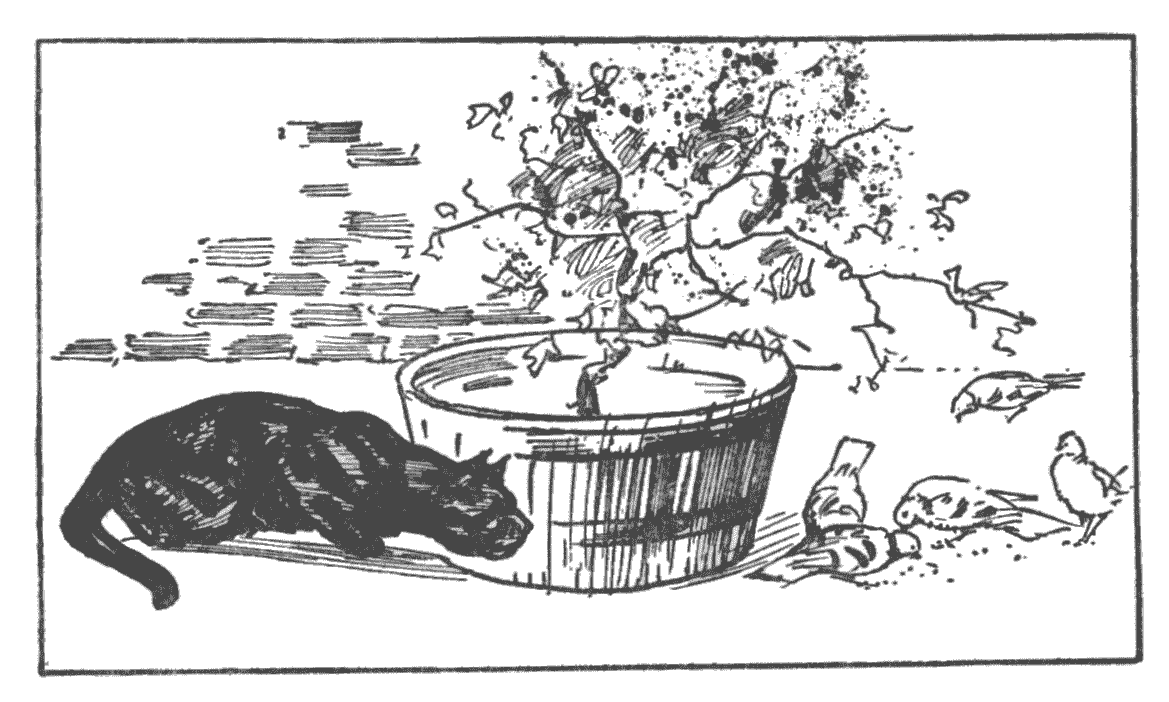
 t was a great moment for the cat of the house
when a member of his family who possesses
“green fingers” decided to have a roof garden.
It was to be in tubs and boxes, but the place was
there to her hand with a delightful view over the roofs
of London to the distant Surrey Hills. There was even
an iron fence and gate for privacy and walls east and
west to stay the wind. Best of all there were innumerable
posts against which a cat could rub his person and
many hideouts where he could lurk in secret, to persuade
his distracted friends that he was lost to them
forever.
t was a great moment for the cat of the house
when a member of his family who possesses
“green fingers” decided to have a roof garden.
It was to be in tubs and boxes, but the place was
there to her hand with a delightful view over the roofs
of London to the distant Surrey Hills. There was even
an iron fence and gate for privacy and walls east and
west to stay the wind. Best of all there were innumerable
posts against which a cat could rub his person and
many hideouts where he could lurk in secret, to persuade
his distracted friends that he was lost to them
forever.
Directly breakfast was over, it became his practice to follow the gardener like a shadow, and soon if anyone mentioned the word roof, he would race to the door.
“The cat understands English,” she exclaimed. “If he can spell we are done.”
Fortunately in this particular his education had been neglected and from then on certain words had to be spelled in the presence of our precocious beast.
The little garden was an experiment, but to the onlooker it seemed that everything grew for green fingers. People possessed of these useful attributes seem to need no garden hints. They simply thrust something into the earth and presently there is a bush or a budding flower.
Sticks put into a pot of daffodils by the florist to prop the blooms, burst into leaf when in the presence of such fingers and next thing they have developed into a privet hedge or bush of laurel.
On the small balcony we have a spreading chestnut tree four feet high which was once a nut in the gardener’s hands; and in these days of war when money should not be spent on merely decorative plants, it glows with beauty for our refreshment through the open door.
Our neighbors opposite are growing tomatoes “for victory” on their window ledges, but we can go one better than that. The roof garden has become a vegetable plot in miniature, and even the window boxes round the balcony are green with young carrot tops in place of the tulips which usually delight us.
Last summer an enterprising firm grew lettuces in pots in Regent Street, but the gardener beat even that curious record with excellent runner beans as well as the humbler vegetables, all grown on a London rooftop.
That first year the soil she bought was so rich that even the pansies tried to grow into trees, and asters, pinks, and carnations flourished between the tubs of ornamental shrubs.
Around this block of flats and others close by an army of pigeons had for years led a more or less unmolested existence. They slept on the narrow ridges of stonework under our windows and woke us every morning with a murmur of cooing song. Sam was often discovered balancing on the back of a chair and gazing out at this attractive noise, opening his mouth in what should have been a meow if he had not decided early in life that meowing is simply not done.
He was strictly ordered not to touch the birds and, understanding “No, Sam” perfectly well, has never once in a long life transgressed since his fall from the balcony. The cynical may argue that he has never been hungry, which is true, and there was an “incident,” as the communiqués say, but it ended happily. An odd noise was heard in the drawing-room and pulling out a couch beneath a corner window, we found a young pigeon, fluttering and terrified, at one end of it and Sam, hardly less astonished, at the other. He had done it no harm and was praised accordingly, while the young visitor was restored to its mother.
Naturally the installation of a bird bath and feeding bowl for the birds on the roof garden soon attracted the pigeons, as well as starlings, sparrows, and other small fry. It was not only a humanitarian gesture. The gardener meant to give them no excuse to eat her young shoots and you would think the pigeons knew it by the way they clamor when the bowl is empty.
The London pigeons, however, are the most pampered of birds. Who has not seen them fluttering down in battalions in Trafalgar Square, to sit on the heads, shoulders and even hands of strangers with crumbs and grain to give them? Ours, moreover, were living a double life, had we but known it, for they had a friend and protector who walked down the road every morning to scatter seed for their breakfast.
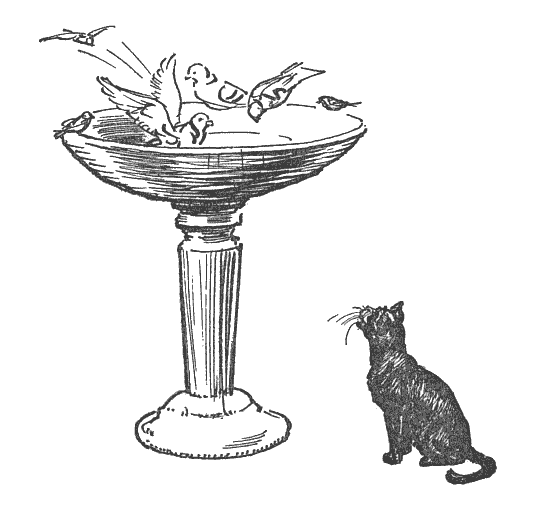
It is credibly reported that they not only expected this good friend, but kept a lookout bird to give due warning as soon as he turned the corner.
Meanwhile, the deceitful creatures, feigning hunger, moved at ease among us, almost beneath our feet, and, more surprising, Samuel Penguin’s.
This was the life for him. He would stalk them silently crouching between the tubs, or leap into the middle of the party and stand there as though astonished at their fluttering and indignant retreat, and, when called to order, lie on his stomach with the most innocent expression imaginable. What, he seemed to ask, was all the fuss about? He wasn’t doing anything.
He discovered a narrow ledge below the parapet and here he would lie watching, with narrowed golden eyes, the moving clouds or perhaps the distant spires of the City.
For all we know he may be a direct descendant on his mother’s side of that fine fellow who, six hundred years ago, followed young Dick Whittington to the metropolis and helped to found his fortunes. It was at the foot of Highgate Hill not many miles to the north of us that Dick sat discouraged on a stone by the wayside with his bundle over his shoulder and his cat beside him and heard the pealing of Bow Bells:
“Turn again, Whittington,
Thrice Lord Mayor of London.”
A little wind from the southeast carried the message distinctly, and the cat (if I know anything) arose and stretched and wound himself round his master’s legs.
So doubly advised Dick turned again, pushing down the country road with his friend at his heels. Perhaps he passed this very spot, a sunny English meadow, starred with daisies, and found before he reached the City a stream where he could drink and wash away the stains of travel to make a good impression; and the wise cat with the same end in view carefully groomed his whiskers.
There is a sinister silence in my reference books about this illustrious predecessor of Samuel Penguin. One goes so far as to say the origin of the Whittington legend is lost in the mists of time. This is “fifth-column” work, undoubtedly, by some brute who would banish from the world all magical or pleasant things.
For let us look at the facts. There must have been thousands of Lord Mayors since, good citizens all, to have attained that high position, but which of them do we remember, as we remember Dick?
Highgate is a suburb now. London has reached out and gathered it into the fold. And there, at the foot of the hill, carefully railed for all the world to see, is the very stone, commemorating the fact that here, with his cat, rested in 1341 (shall we say?) the poor apprentice who was to become Sir Richard Whittington, thrice Lord Mayor of London and benefactor of the City.
Obviously Bow Bells and the cat between them did the whole thing.
Besides the birds, the growing plants were a source of constant delight. Sam went from box to box, sniffing the different entrancing smells and finding blades of grass to eat.
Soon the gardener provided him with his own salad box, to which was presently added a larger one containing his private lawn. To shade him from the wind she planted a border of michaelmas daisies round it and here he would lie stretched at his ease, peering through the forest of daisy stems at the visiting birds or enjoying the warmth of the sun.
Then, turning, we would find he had gone, over the roof perhaps to the strange and exciting territory of the other block, or swift as an arrow down the stairs to slip in at any available open door. All his suspicions of the human kind had gradually worn away. He approached these strange households affably as one certain of welcome, examined their rooms one by one, and, if he liked the place, went to sleep in the laundry basket or under the bed. Half the time they didn’t see him come in and he was only found after long and frantic searching. We bought him a bell for his collar, and this helped a little, but with all this coming and going he had become a marked cat. The workmen were on excellent terms with him, and he would sit among their trestles and paste as they redecorated an empty flat, yet return spotless and immaculate as ever.
The porter would ring the bell, Sam under his arm, or perhaps to say:
“Have you lost him, Madam? Because I hear he was seen passing the time of day with the coal man at the entrance door.”
The porter had a cat of his own. Moreover, he has served the tenants here for more than half a century. He saw the place built in his boyhood, when flats in London were new and rare and these were known in the Victorian manner as “suites.” Many of the stage celebrities of the time came to live in them (for flat dwelling was probably considered rather Bohemian in those days), and he knew them all. He saw the place altered and brought up to date, gas succeeded by electricity, box-rooms below give place to furnaces for central heating, the nearby mews change to a garage.
“You won’t find such doors nowadays,” he says, fingering the fine-grained wood which defies draughts and noise. “Nor such sound walls.”
I believe he looks upon the new blocks springing up with their vast vestibules and poky rooms as a vulgar mushroom growth, all very well in their way, but not at all suitable to “my tenants.”
He remembers when the last toll bars up the road were swept away, because a famous lord of the time missed his train to the country; and from the roof garden he will point out the charming curved back windows in what was once a duke’s town house. The drawing-room still has its fine painted ceiling, he says. “Ah! those were the days.”
The ducal family owns much of the property in the neighborhood and to that we owe the pleasant space of grass and trees visible from our windows and serving no other purpose than to add grace to a London street.
There are trees too, rising above the housetops, and the delicate spire of a church containing a reredos painted by Burne-Jones to the memory of Christina Rossetti. The Rossettis lived in the neighborhood long ago, the father having come to England from Italy, a political refugee, as men who love freedom have come throughout the centuries and as they are coming now.
Not more than a hundred yards away Sir John Millais painted some of his most famous pictures, and round the corner the great Siddons had a country house and garden.
Samuel Penguin, caring for none of these things, nevertheless seemed to enjoy the view.
“Perhaps,” said the gardener, watching him with his forepaws on the sill, “he wants to exercise his catty privilege of looking at a King.” If so he had a grand stand view, for often the royal car drove by without any other fuss or ceremony than an extra policeman here and there to keep the traffic moving. Seeing these, people would gather in little groups in the street to wave and raise a cheer.
And today when we hear of the dictators’ armored trains scuttling about Europe, bristling with machine guns and bodyguards, we smile and hum the latest popular song:
“The King is still in London town
Like Mr. Jones and Mr. Brown.”
We bought a sundial, a garden seat, and a hammock shelter with a waterproof cover to shut out the wind and rain.
Samuel Penguin preferred to occupy the shelter in solitary state, except in hot summer nights when his lawn grew chilly and he would curl up between us rather than be banished indoors.
By day the view contained too many roofs and chimneypots in the foreground, but with dusk it became mysterious and enchanting. Southward suddenly the face of Big Ben seemed to be hanging like a friendly lantern in the sky and the massed roofs melted into pools and bridges and towers and the masts of phantom ships on a phantom river, and here and there a floodlit building like a ghostly windjammer added to the illusion of a city new and strange, and everywhere a myriad of twinkling lights threaded and girdled the scene.
Remembering the brilliant skies of southern latitudes, we were always sorry that London seemed to have few stars, but this was an illusion. They were there and waiting for the dark nights to come. Charles’s Wain, Orion’s Belt, and the Pleiades keep watch with the Fire-Spotter, the Air Raid Warden, and the Home Guard above the darkened city, symbol that the little lights of man, though dimmed, shall burn again.
By November the garden shelter had to be dismantled and packed away lest the winter gales should hurl it into the road, for even in mild weather we had found it necessary to clamp it securely to the iron railing.
Gusts of wind would billow the canvas covers as if it were a ship at sea, parting at the same time the fur of an indignant cat in all directions.
Once an open tin of green paint set down on a newspaper was lifted into the air and sent careering over the face of the building to the pavement eight stories below where it missed by only a few yards a Rolls Royce standing at the curb and a passing pedestrian.
The tragicomedy of the lost hat on another occasion was due to a summer breeze. Inevitably it was a favorite hat, and the gardener, coming in from town, had forgotten to change it before going on the roof.
In a moment it was gone. Moreover, the lift was in use by one of those slow and stolid people who seem doomed to appear in moments of emergency and clog the wheels of progress. By the time she reached the street there was no sign of the hat. It had, however, been seen.
A passing minx had picked it up from the pavement, put it on her head, examined the effect in a neighboring window and coolly walked off with it.
MEMO: Perhaps a little grass from Sam’s salad box might be good for Fluff the invalid.
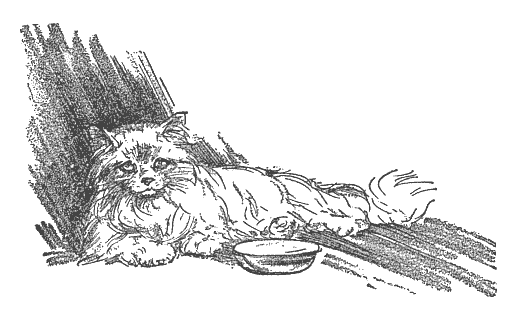
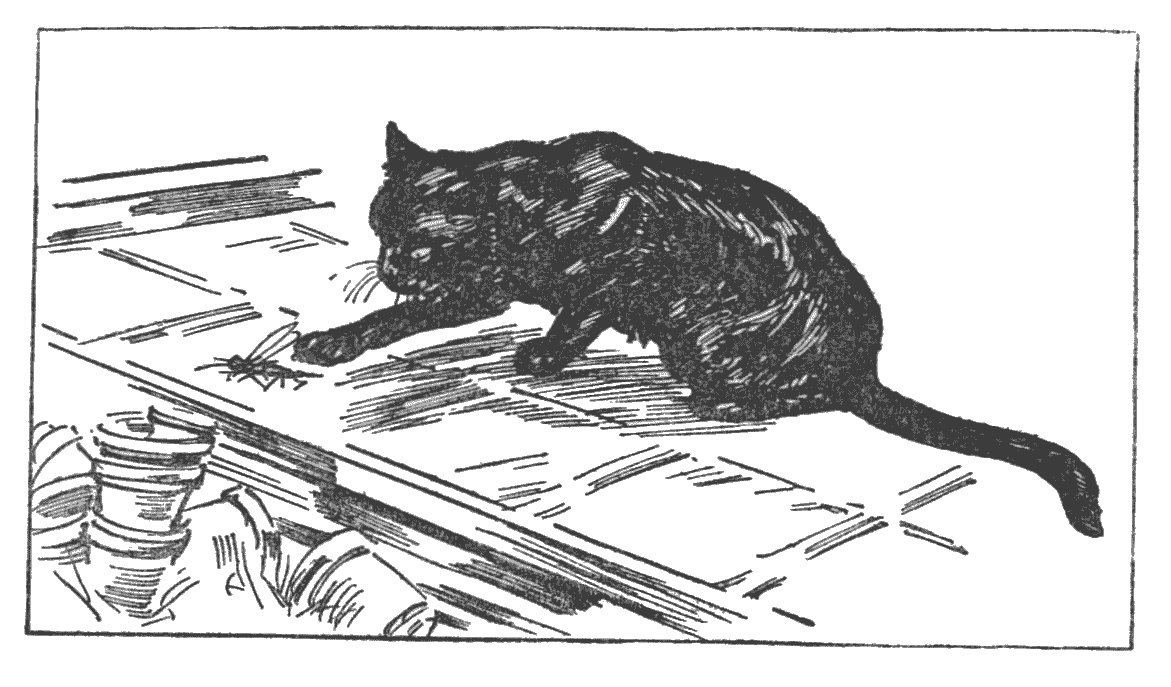
 amuel Penguin is no mousekeeper. As far as
we are aware he has never seen a mouse in
real life, though it is possible that his reputation
as a hunter may have kept such visitors
away from our premises. These things must get about
in the underworld, or how should a mouse survive?
amuel Penguin is no mousekeeper. As far as
we are aware he has never seen a mouse in
real life, though it is possible that his reputation
as a hunter may have kept such visitors
away from our premises. These things must get about
in the underworld, or how should a mouse survive?
Sam’s friends, anxious to bring him a present, tried every kind of toy mouse in vain for some time. Like Queen Victoria on a celebrated occasion, he was not amused.
He had attached himself to a doctor neighbor of ours, so much so that when this man came in for a game of bridge, Sam would sit a whole evening on the arm of his chair watching his play like an expert, and then offer to accompany him home.
As a slight return for these attentions, no doubt, the doctor brought him a clock-work mouse. This was a success, though I believe it was less its mousiness which attracted him than the delectable noises it made. He liked to hear it wound up and would then knock it over in order to listen to the works running down. Though it has long vanished from the scene, he remembers this attractive sound and attends all clock-winding occasions with an alert and hopeful air.
An American visitor, having met Samuel, kindly sent him one Christmas a different mouse—a soft affair filled with catnip. This caused him intense excitement. Sam the Silent actually muttered with joy, half growl, half gurgle, clasped it to his heart, tossed it in the air to catch it again and after a hilarious morning dropped to sleep with it under his arm.
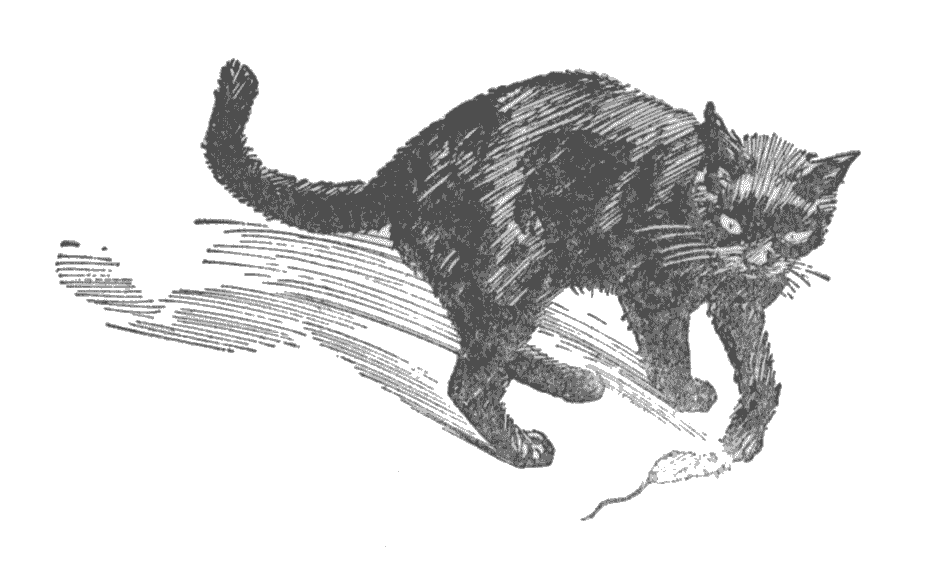
Then began a nightly ritual. Before bedtime Sam would climb to an arm of the couch and sit there expectantly. He was no more the long slim cat of earlier days but a stout fellow with bulging satin sides, but he had not lost his agility. When the mouse was thrown to him he would rise on his haunches and catch it, or using one paw as a bat, launch it back to the “bowler.” Bradman himself—that ace of all cricketers—could not have put more grace into the stroke.
This talent is another Siamese trait, I have been told; also the delicacy of tread which permits Samuel Penguin to walk through the glass or china cupboard without disarranging or breaking anything.
The catnip mouse, alas, wore out, but a favorite friend in New York, learning of the tragedy, sent him a whole box of them and throughout the years he has never forgotten to keep him supplied. So enriched, he has been able to introduce this attractive plaything to certain other favored cats. One Persian gentleman, David Garrick, has earned this attention by sending him each winter when grass is hard to come by (as every house cat knows) a magnificent tin of it growing, tied up with scarlet ribbons.
The man in New York, though seen only at intervals, has a high place in Sam’s regard. After all, they have much in common, a passion for warm rooms, good fires, salads, and a well-groomed appearance. It is true that the man doesn’t wear a white tie and tails in the day time and Sam has no alternative, but he has a quiet voice and knows how to address a cat.
“Dr. Livingstone, I presume,” he said, on meeting Mr. Penguin unexpectedly the first time.
Sam may not have known the reference, but he was visibly impressed by such a respectful salutation.
Moreover, the visitor brought a little music into the house, and the top of the grand piano was a perfect place to lie and enjoy the vibrations. Once when the lid was open for a Beethoven sonata he leapt on the strings in a praiseworthy endeavor to provide orchestral accompaniment, but for the most part he was an excellent audience and would roll over with ecstasy at certain notes in the bass.
One day there arrived from America an enormous box addressed to “Samuel Penguin, Esq.” much to the mystification of the postman, who delivered it with doubt:
“Would it be for you, Miss?”
“Oh, yes, it is for the cat of the house.”
The gift proved to be a fine scratching post and I suspect it had a double purpose—to please Sam and to assist a domestic dilemma.
The rascal had reduced one leg of the kitchen table almost to matchwood, and about this time we had learned from an expert that it was sheer brutality to deny your cat somewhere to sharpen his claws. He should have a piece of carpet nailed up firmly somewhere within his reach.
Having bought a yard of stair carpet and nailed it round the table leg however, we had been disappointed. A fig for your experts!
Sam evidently regarded this proceeding as an insult and a reproach. He retreated from the hated thing and washed his hands of it, transferring his attentions instead to the side of a cupboard well out of the public view.
The scratching post was a magnificent affair, not merely covered with carpet, but impregnated with his favorite scent. Our hopes were high, but who really likes a useful present?
Sam enjoyed sniffing it and rubbing his body round it, but scratch the thing? Not he. The box it came in was a different matter,—a brand new bed with masses of fresh tissue paper from foreign parts. He rustled and reveled in it for hours on end.
A wire brush brought to him was a great success, though it was certainly gilding the lily to assist his toilet in this way, when his tongue could do all that was required.
The sharp bristles gave him exquisite pleasure. He rolled, he squirmed, he opened his fingers and closed his eyes, and finally rubbed his teeth on them as the crowning joy of the whole performance, purring loudly. To this day he will follow anyone who produces the brush, demanding service.
Independent still, he went his own way and could not be persuaded, and constantly some new doglike quality was discerned in him.
When given food he disliked or more than he needed he tried to dig up the floor round his plate and bury it. Indeed he carried this peculiarity further and endeavored to hide the signs of his guilt in the same way.
Although he has never once broken anything he did one morning knock over a bowl of flowers while seeking green shoots, and was found in the drawing-room frantically trying to dig up the carpet, pausing from time to time to shake his wet paws.
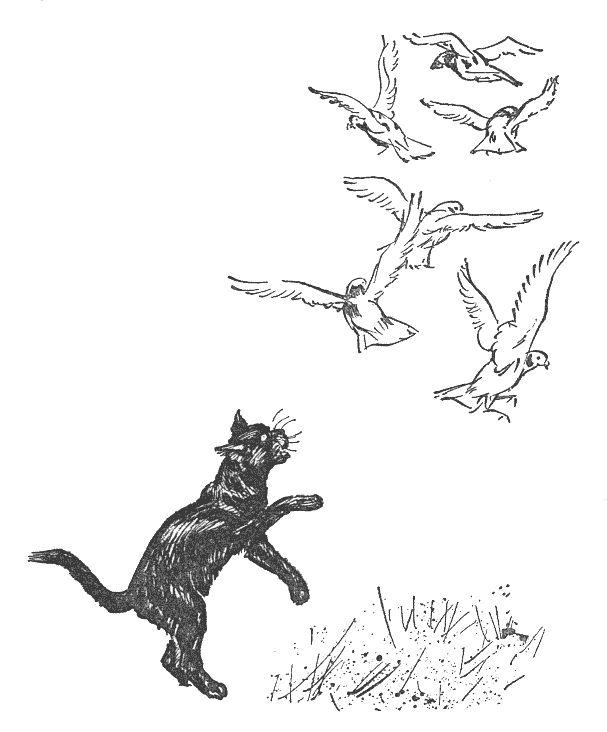
Our methods of clearing up the wreck did not meet with his approval, and all day long he returned to the place to try again until we concealed the scene of the disaster under a rug.
Doggishly too, he recognized friends from strangers and would come to the door and sit there peering round it, moving his head when any obstacle obscured his view. Friendly invitations to enter were ignored. He was determined to keep his freedom of action and was often disconcerting.
We had an Italian guest one night who announced bluntly:
“Your cat is too fat.”
Samuel, without wasting a moment, climbed on his knee and sat there unhindered throughout the evening. We heard no more criticism of the master of the house.
Italian cats, at least as the tourist knows them, must be among the thinnest in the world; so perhaps our guest’s opinion was quite natural. In a totalitarian country no doubt Sam would have been expected to catch mice for the state.
Another incident of that evening gave us, had we but seen it, a hint of the sinister days ahead. At the time the Fascist régime had not begun its lust for saber rattling at the expense of other people’s territories, and our friends were intelligent, traveled, and charming. Yet when we told them that the gardener called Sam “Pussolini,” owing to his dictatorial ways, one of them exclaimed:
“Oh, hush!”
Hush! It was to be the cry of millions of poor wretches in many countries, in fear of the Gestapo or spying neighbors or servants or corrupted children.
We were astounded, supposing they thought the cat’s nickname almost lese majesté. Instead I daresay it was the inadvertent warning of one who had already seen the beginning of the new tyranny. People in Europe had already vanished from the sight of men for statements hardly less innocent than the gardener’s pun.
Some years later we offered a lift to a stranger stranded on a country road in a torrent of rain, and felt constrained to explain the rather dingy bunch of winter grass we were carrying home to Sam.
The stranger smiled.
“I have lately been feeding eleven starving cats in the English cemetery in Rome, if you happen to know the place,” she said.
We knew it and the headstone to “one whose name was writ in water,” though in truth it was to ring across the world.
Her American husband had been buried there, she said, and it looked so desolate that she had been trying to tidy it up a little, to the incidental comfort of the starving cats.
Sanctions had begun to ruffle the international waters by this time and a nightly broadcast from Rome by a woman who spoke English with an Oxford accent was causing considerable amusement.
Much of her time was spent abusing the foreign press for lying about her country. One paper, she said, had actually dared to say Italy was buying mules for Abyssinia. This was monstrous when she already had 40,000 mules, all of pure Italian breed.
Our new friend agreed that this seemed to be an understatement but said that the atmosphere was not so amusing at close quarters. Things she had seen had induced her to leave the country after a residence of many years, and she gave us some illuminating examples.
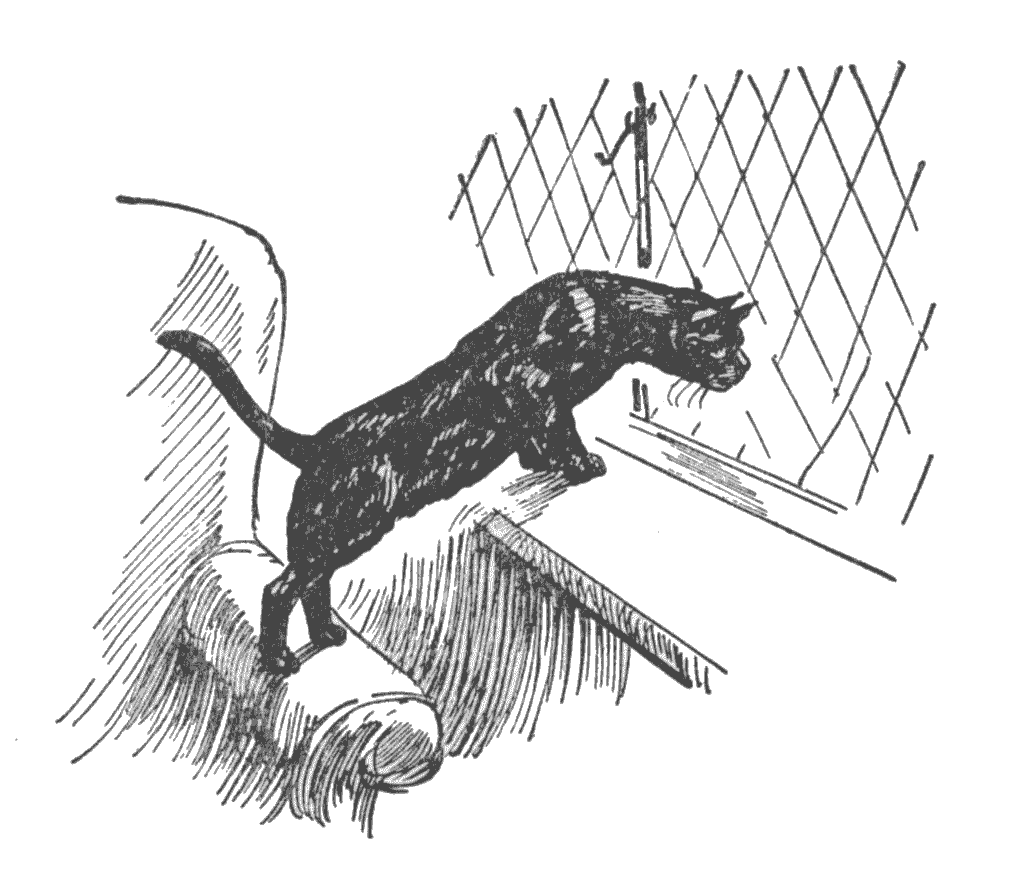
“I just couldn’t breathe the air any more,” she said.
All roads lead to Rome, they used to say, but there is only one road now and it echoes to the tread of heavy German feet.
Do Axis visitors trouble to throw their coins into the Trevi Fountain, I wonder?
Does the Gestapo pounce on the urchins of the quarter as they fish the money out? At least it is safe to believe that the cats of Italy grow no fatter, for the locust is over the land.
How fortunate that Samuel Penguin is a free born British cat!
The invalid downstairs may possibly recover. His owner smiles hopefully this morning as she answers inquiries.
Fluff is the apple of her eye, or one of them. The other is her youngest daughter Molly, to whom the Persian belongs.
“He’s ever so well bred,” she says. “We got a paper with him and Molly was given him when she was fourteen. She’s nineteen now and I lay she was anxious about him last night, because she was working, you see. She’s in the War Cabinet.”
No wonder it was necessary to rescue her best hat!
But I suspect her mother was not really suggesting that Molly was Mr. Churchill’s right hand. What with losing her home, nursing her invalid cat and having a daughter clever enough to do night work for the Government, she was a little mixed.
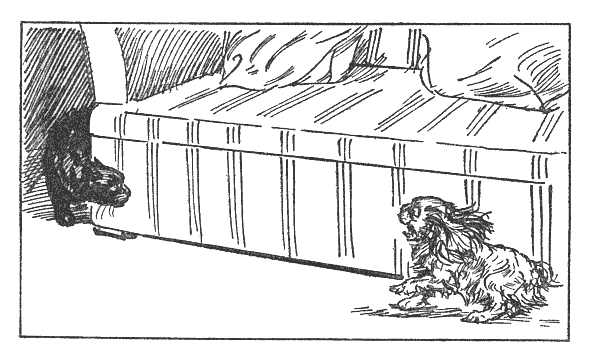
 haracter is the essence of a cat, though he
often chooses to conceal it. Posing like the
sphinx at one moment, forepaws neatly together,
he is equally inscrutable, and his
eyes, changing from gold to green, two shining, empty
pools; yet he can respond when it suits his fancy and
convenience.
haracter is the essence of a cat, though he
often chooses to conceal it. Posing like the
sphinx at one moment, forepaws neatly together,
he is equally inscrutable, and his
eyes, changing from gold to green, two shining, empty
pools; yet he can respond when it suits his fancy and
convenience.
Samuel Penguin now followed at the gardeners heels, and his glance, which had at first been a steady stare at each of us in turn, melted at the sound of her voice. When she went out, particularly at night, he sat facing the door with an anxious and expectant air, walked into the hall and back again continually, refusing to go to bed—the man of the house pacing the room and ready to read the riot act about late hours!
It was useless to offer consolation, and at last he would station himself at a point where he could peer round a bookcase at the hall door, his head on one side, listening for the upcoming lift.
He seemed to know by some sixth sense when she was in it and would leap to meet her.
He would leave us for hours at a time but seemed to see no reason why we should be permitted to return the compliment and began to follow us suspiciously when we went to our rooms to change. If, as occasionally happened, we had to leave him alone in the flat, he never failed to make it plain that this was an outrage.
He knew what coats and hats meant and would dog our footsteps to the door, meeting us there when we returned to prove that he had never moved from the spot.
Our ruses to get away unobserved were rarely successful, but one day we slipped out, leaving the radio on for company and came home to find him contentedly listening to a political speech. A man’s voice had not lost its hold upon him.
“George,” said our friend Evelyn to her husband one evening, watching Sam lying with his heels to the blaze, “we ought to have a cat. I want one and so does the cook.”
“No,” said George firmly.
“But why not?”
“Because a cat is a tie.”
“Almost everything in life is a tie if you choose to make it so, including a husband,” retorted Evelyn with spirit, but George merely observed that he should hope so indeed, looking obstinate.
We were all going to a theater and, as luck would have it, met an amusing illustration of the argument. Just in front of us sat a girl in a black satin evening frock, with what appeared to be a black fur over her right shoulder, until it opened its mouth and yawned.
It was a spaniel puppy, very sleepy and comfortable, and Evelyn stroked its silken head.
“He looks very young to be taken out,” she said.
The girl’s escort glanced over his shoulder with an indulgent smile.
“The point is he is too young to be left at home,” he explained confidentially.
They must have smuggled the pup into the stalls under the nose of the management, and we were delighted when he lay perfectly still all the evening and did not make a sound.
“There you see. Ties are what you make them, George.”
“They might have been ejected from the theater,” said George, in the tone of the outraged citizen, who sees someone break a law which he has no desire to break, and get away with it. “Besides a dog is not a cat.”
“How wonderful of you to have noticed that, darling. Then let us have a dog,” suggested Evelyn.
“No.”
“Or a monkey?”
“NO!”
“Or a dear gazelle?”
“We shall have nothing,” said George, and he was probably right.
Our “tie,” if you can call him that, was not quite on terms with the kitchen. Ethel’s successor protested her devotion, but he had a way of looking over his shoulder at her with a dubious air as though he could have told a different story. And one day the murder was out. He came running through the dividing door with thunder in his eyes and five floury finger marks on his coat. An unprovoked assault.
“I was only playing with him, Madam,” defended the aggressor.
We hoped there would be no fur in the pie and advised Sam, unnecessarily perhaps, against keeping bad company.
The discovery came at an awkward moment, for we had arranged to go to the South of France for a few weeks and did not care to leave him in hostile hands. Luckily a friend in the country wanted to come up to town, and she was already one of his intimates—that is to say, the kind of acquaintance who did not pounce but understood that a cat prefers to make his own advances. She came to stay therefore and kept us informed of his health and spirits.
For two nights he sat at the hall door from dusk till dawn, incredulous at our base desertion. Then he seemed to give us up for lost and adjusted himself to the new order. Once he frightened his guardian nearly out of her wits by leaping across space from a window to a balcony several yards away, but otherwise he was a perfect host, she said.
When we returned, however, for the first time no Samuel Penguin met us at the door. He was stretched at his ease on a couch in the drawing-room, and there he remained, ignoring our existence. We showed him parcels and rustled paper in vain. He turned his eyes away or stared with contempt and when bedtime came he resisted all invitations and made his own arrangements.
We supposed he had forgotten us, but later events proved otherwise and why after all should cats be more consistent than their human brothers?
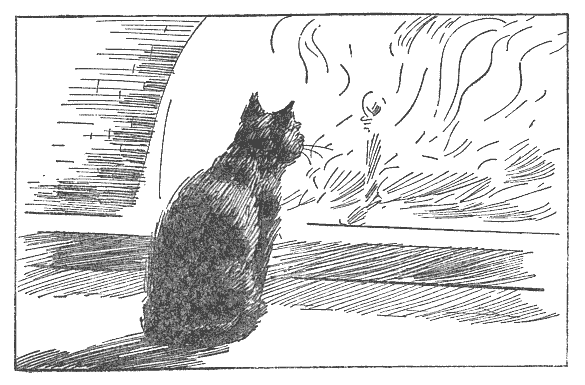
That summer we were going on a visit to America, closing the flat and leaving Sam with friends on the other side of London. His whole behavior about this event was entirely different. He superintended our packing arrangements, sat in the trunks, and was full of interest and benevolence. He even made no objection when the shipping people carried the trunks away, though as a rule he treated such visitors with deep suspicion. (The man must have deserted him.)
He had developed an incurable fondness for lying on our clothes; so we packed his basket with a familiar frock and sweater, hoping it would prove a consolation. Poor fools, he was as ready for a holiday as anybody else, and all our consideration was wasted.
In due course we took him by taxi to his new home before joining our ship. He had loathed the drive from the country, but, a true townsman, he seemed to feel this was another matter. He sat up at the window enjoying the streets, the racing traffic, and the river flowing away under Westminster bridge.
His hosts were not strange to him, and he was allowed to go through their flat at once and see how he liked it. The day was one of the hottest in what was to be a record summer, and an oak dining table pushed against a wall, he found, was deliciously cool to the fur.
We found him there fast asleep when the moment came to say good-by and crept away without waking him.
Faithfully by every mail they sent us news of him. He was well, happy, much admired, and the life of the party; he had not run away, been poisoned, or stolen for his fine fur coat. Indeed, he had taken possession, and we had better stay in America for years, because they didn’t want to part with him.
The morning after our return home we hastened to collect the cat of the house from these bandits who had designs upon him, and found him fast asleep in a drawer of the kitchen dresser. This was the cool side of the house, and the weather was still oppressive enough to exhaust any cat, said his hostess in extenuation.
She should have been glad to be rid of him, for in our absence a King Charles’s spaniel had come to stay with her and it was necessary to keep the two visitors apart. Not on Sam’s account. Oh, dear, no. He didn’t mind the dog in the least. She demonstrated as much by bringing in the little spaniel, who whimpered like a child at the sight of its natural enemy. Sam viewed this exhibition with an air of benevolent astonishment.
There was no cold dignity this time. He rode home with us in triumph and went at once to visit all his favorite haunts.
He examined everything that came out of the trunks and sniffed all the foreign smells with evident pleasure. There was a Micky Mouse clock bought for a young friend and we wound it up for his entertainment. He gave it a push but it was too large a mouse for a black fur cat in the height of summer, so he sank to rest in the packing paper.
“Walk on roof, Sam?” said the gardener experimentally.
He leaped up and ran to the front door. It was evident that there was nothing wrong with the memory of the cat of the house.
The garden had been watered though no one would have thought so. The bay trees in their tubs were dead, but here and there a dwarf rose or carnation raised a brave head in welcome; Sam’s lawn was lank and run to seed; the bird bath was dry, the bowl empty, and across the way the pigeons perched in drowsy festoons, seeking the shade. The roof tops seemed a little dizzy in the sun, yet white and cool above the trees of an intervening square rose the lovely towers of Westminster. The hands of Big Ben pointed to six o’clock and his voice boomed the hour with a slow and sonorous precision and a fidelity one could not doubt.
London again, unrivalled still to those who love her, whatever the pleasures and delights behind! Always we have experienced the same sense of enchantment in coming home to her busy, winding streets, her often shabby buildings, her steady voice, which by some strange magic has become for us, born far away, the very rhythm of life.
The gardener doused the thirsty plants, and the water ran into little pools about the roof, leaving damp patches where it was very cooling for a cat to lie.
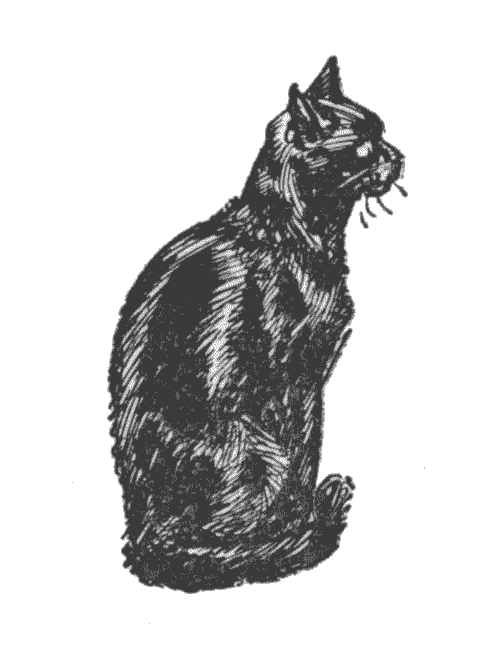
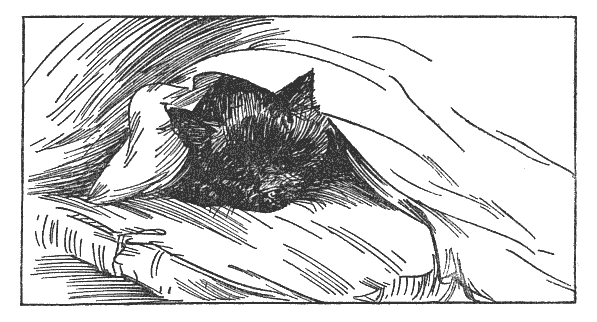
 he cat is a total abstainer.”
he cat is a total abstainer.”
“I beg your pardon,” said the veterinary surgeon.
He was a rosy-cheeked young man and a stranger. We had never had occasion to send for him before, but Samuel Penguin seemed to be out of sorts and wore his ears down like a pair of porch verandahs.
The vet had quickly diagnosed canker, remarking with a nod, as he prepared his lotions:
“Too much rich living. That’s the trouble with him.”
Naturally some defense had to be put up against such a scandalous insinuation; so we told him that, believe it or not, the cat had never once, during a residence of four years with us, been known to drink anything, though offered both milk and water every day. This peculiarity had often worried us, but his medical adviser remained calm.
“That’s all right,” he said. “He knows what he needs.”
He had seized the patient with a firm hand and begun to probe one ear, and Sam assisted the operation, raising his head as the instrument went down, as though indeed he knew. “Nature’s pretty clever,” explained the vet, “and between you and me, the less we interfere with her the better, though it is bad business for me to say it.”
It certainly was, for his fee was little below our own doctor’s. Still he dealt very skillfully with the cat of the house and showed us how to do so ourselves in future, instead of wrapping the whole procedure in mystery.
His work lay largely among horses, but he had also a talking macaw among his patients and had once driven a sick bear in a taxi; “rather an exciting journey,” he said mildly.
The operation completed, he opened Sam’s jaws and examined his teeth with an exclamation of dismay.
“Hullo! I’m afraid you’ll have to come to the surgery and have some of those out,” he said.
“May I be with him?” demanded the gardener suspiciously.
“In the next room, of course,” agreed the vet.
“NO!”
Like two combatants they faced each other over the head of Samuel Penguin, who, now released, had not attempted to move away, but was washing his ears.
“We—ell,” began the vet in a dubious tone. He seemed to realize he was no match for this fanatical family, and becoming aware of the cat still at his feet, he gave him a comical look, between astonishment and amusement.
“You’re a cool customer, I must say. What’s your name?” he asked.
“Sam.”
The hero ceased washing and looked up at the gardener with an air of inquiry. The man laughed.
“Meat, Sam?”
Of course the cat responded to this invitation in the usual way, hurrying to the door, and thereafter there was no more talk of surgeries, as his other talents were reported and discussed.
The young veterinary surgeon had the right touch with cats and understood them. He was to die, alas, in a few years and we have never found his equal. He did not stride in and seize the patient by the scruff of the neck like one of his successors, or address him as “Good Pussy” like the other. Sam loathed both these men in spite of their skill and always retreated at sight of them, but from the first the young vet was a friend.
He even understood our reluctance to let him go to the surgery and after observing Sam for some time and consulting him on the subject, he agreed to bring his instruments to the flat and see what could be done about the teeth. This operation was to clinch the friendship between them.
It was now early winter and we had bought him a dog basket large enough to give him squirming room when he lay before the fire.
He was dozing when the dentist arrived and before he was quite awake his mouth was gently opened for inspection.
After all, the teeth were sound, but covered with acid which must have caused him acute discomfort. Deftly the vet removed great lumps of it before our incredulous eyes, and the patient neither struggled nor made a sound. After that the teeth were scraped and polished and the man stood up.
Sam, released, leant back in his basket and surveyed the operator with glowing eyes. It was the grand climax and quite absurd.
“Walk on roof, Sam?” suggested the vet and was delighted when the hint was taken. It became his regular greeting on future visits for, while the young vet lived, Sam became his prize patient and his sensitive intelligence a source of discussion in veterinary circles.
He had a curious taste in medicine. Once ordered a liniment containing bitter aloes, he liked it so much that he would lick it off the paint brush by which it was supposed to be applied and then ask for more, though he still refused either milk or water.
Years later he had a loose tooth pulled by the “Good Pussy” vet and swore at him fiercely throughout the ceremony, but who can wonder! The creature held him, like a rabbit, by the ears.
It was this last outrage which persuaded us this morning to seek a fresh opinion, for Sam, now getting on in years, is not very well, though he has stood up to the trials of nearly two years of war like a veteran.
We took him to an animal hospital where he sat in the waiting room among dogs of every breed and shade of opinion, sundry other cats and an ancient parrot going blind, who said “Good-by all,” pointedly, at intervals. Horses, mules and donkeys, according to the notice on the gate, were seen in the early afternoon, but I doubt if a whole menagerie would have troubled Sam, who surveyed with interest this new world.
The spotless, air-conditioned room, with rows of well-spaced seats, had the genuine hospital look about it. Men and women in fresh white overalls passed in and out, summoning or releasing patients. Anxious “relatives” received a brief but reassuring smile.
“Animals should be kept apart.”
The warning was painted in good large type on the wall, but except for a Sealyham which clearly wanted to eat an Alsatian, the behavior of the patients was above reproach.
The examination was a great improvement on the pussy vet’s. Samuel is to have a few drops of halibut liver oil daily, a fishy cure which strikes us as distinctly tactful, combining business with pleasure, and to return in a fortnight to report progress.
He and the parrot went to the surgery together but the bird was taken elsewhere for his examination and returned indignantly flapping his wings. The verdict was cataract in one eye, but the second eye was found to be still in good order.
“Did he say anything?” asked the owner rather anxiously.
“Did he not?” returned the vet, grinning.
Sam enjoyed the drive there and back and now wears the pleased and important expression of one who has been seeing life. Moreover, the fee was so small that he will be able to afford his contribution to Animal Day tomorrow.
We shall be out at dawn with thousands of others selling emblems for this cause. The gardener is an Animal Guard, attached to the First Aid Post, and her one male colleague, full of zeal and efficiency, has just delivered our boxes.
His name is David and he walked into the post out of nowhere one day.
“How old do you have to be?” he asked.
“To be an animal guard?” suggested the keeper of the post. “Well, let me see, how old are you?”
“Eleven,” said the applicant firmly.
It seemed a useful age in a busy world, so he was passed for active service and now wears an armlet and a quite unnecessary tin hat, exercises the dogs, runs messages, and is very much the man on the spot.
David will be out at dawn, I suspect, lying in wait for the girls going to work or coming off duty at ambulance stations and wardens’ posts, and unless the world has changed, his bright eyes will bring in a rich harvest of pennies.
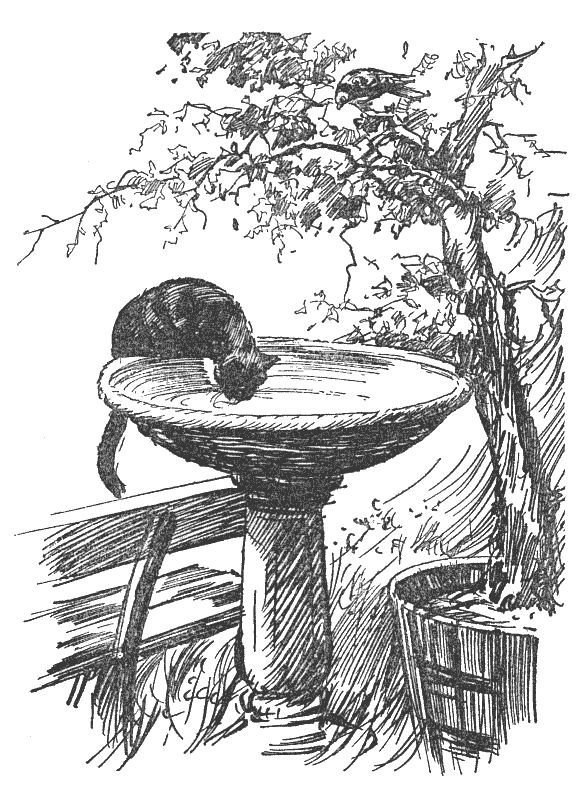
It was a few months after his dental operation that Samuel Penguin was actually discovered drinking water out of the bird bath. Perhaps it had a gamey flavor, but that he should drink at all after so long an abstinence was sensational news.
Bowls of water and milk, long discarded, appeared again daily to tempt him, and a morning offering of cream for breakfast. He grew first to accept and then to expect the cream, but has never become a milk addict. Water yes. He soon drank pints of it, preferably from a pail, which saved him the trouble of stooping.
And then he seemed to throw off all reserve and began to talk in a Siamese fashion. Though limited, his vocabulary was expressive and often entertaining. If offered food when not hungry he would grunt shortly—a decided negative, but a little fish or liver as a treat to vary the diet of good British beef would bring forth a long drawn oo-oo of appreciation. In moments of impatience at someone’s neglect he would produce the ghost of a bark and this was always successful.
Generally he preferred to spend the night in the middle of a heaped-up eiderdown, but liked variety. Therefore we each provided one, leaving our doors ajar for his convenience. When lights were out a voice would be sure to ask:
“Are you all right, Sam?”
“Mm—um.”
With such murmurs he would continue a conversation until he fell asleep.
He now had an elderly slave in the kitchen and in her eyes everything he did was wonderful. On winter afternoons they dozed together by the kitchen fire, she in her easy chair with her feet on a pouff to make her lap more comfortable for the cat. Her organdie aprons became pierced with little holes by his kneading claws, but she darned them with the fine stitches she had been taught in her Victorian childhood and never said a word.
Hers was the speech of a gentler world than most of her kind today as became one who had come from the country at fifteen as tweeny in a large London household and risen to be parlormaid under “Mr. Tompkins, the Butler.”
She called herself firmly a domestic servant, despising the snobbery of those who are ashamed of their trade.
“Wanting to look like film stars, with curls to their shoulders and no training whatever, Madam. Flibbety-gibbets, nothing more nor less!”
It was to avoid these hussies that she had now sought a single place and a kitchen where she could call her soul her own.
Her occasional observations were like flashes from an earlier “Cavalcade.” She had seen the old Queen’s Jubilee from a window especially engaged by the master for the staff, dressed in her Sunday best and a new straw hat and standing by request behind the housekeeper’s chair. (“For she had her fancies, Madam.”)
Then there was the marriage of Mr. Edmond at St. George’s, Hanover Square, when the bride’s family had been much upset by the behavior of a rejected suitor. This arch-villain had somehow slipped into a front pew in order to sob loudly and make himself felt.
And again, the dreadful fuss there was when it was discovered that Miss Geraldine had actually been seen driving in a hansom cab!!
But the old woman had her more modern pictures too, of the minx for instance who came to stay with her Granny and returned from a party at five a.m. Granny, quite unnecessarily, had waited up for her and inquired with crushing politeness at what hour she would require breakfast.
“Oh, I’ve had it, thanks,” said the minx, “at a coffee stall.”
“Indeed? You must give me the address so that I can try that myself sometime,” said Granny, neatly retrieving the situation.
“For Time Marches On, Madam, as they say in the films.”
Here obviously was a woman after Sam’s heart, who would never vulgarly assault him with a floury hand.
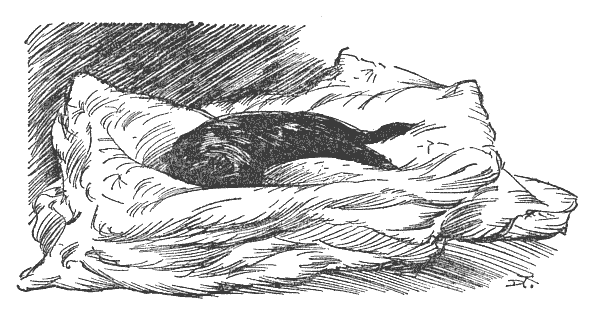
Every night she carried him to her room to bed and always fondly believed that he remained there. Not he; when all was quiet he would slip out and come tramping to one of his eiderdowns which were more to his taste, keeping his catty independence to the end, yet careful not to hurt her feelings. The cat is always a gentleman.
The emblem sellers were at every corner. Ranging down the streets with our laden boxes, we paused sometimes to compare notes with rival sellers, in the intervals of business. Flag Days, strictly limited in peace time, are more numerous now when there is so much to be done in so many directions that subscriptions to good causes fall away. Ours was a minor day in the calendar and would help to provide care for the sick and wounded creatures of the poor.
You soon come to know the potentialities of your approaching quarry. The peevish mouth or the carefully inattentive are unlikely to give; the overdressed—underbred at any time and in war an affront—will stare and pass on. But the opening handbag or dawning smile are signals of success.
“I don’t know how I shall get through the week, but I’ll chance it,” said one shabby little woman, putting twopence in the slot.
Women, we agreed in council at this point, were the best, and it could not be said nowadays that they had more to spare or less responsibility. Women, we repeated firmly, were marvelous, even the very poor giving, while men rushed by as though they had a train to catch.
“We ought not to keep any animals at a time like this,” declared one man, when cornered.
“Then who would kill the mice and rats and who would draw the heavy transport and save petrol?”
“Oh, that is how you look at it, is it?”
The collector had evidently scored a point, and the rest of us looked on with envy as a large silver coin went into her box with a heartening thud.
“Is this a private war or can anyone join in?”
The quotation came from an Irishman, of course, actually volunteering to buy. He was assured it was the most public war known to history and decorated with a cat, a dog, and a horse as the nearest thing to a shamrock among the emblems.
“Say, can I be in on this?”
A Canadian private had joined the group. He came from Winnipeg, he said, and he didn’t know what it was all about, but he would take a handful.
We don’t ask our Service men, but never refuse a good offer. Besides, we knew the ways of these lads from across the Atlantic by now. They collect everything and anything. We have it on the authority of one bright group that they would have collected the propeller off the ship that brought them, if they could have got ashore with it.
They had come to tea with us, their first Christmas in England, four young strangers far from home, and a few days later turned up to demand a guide and protector to the nearest postoffice, laden with parcels for their mothers, sweethearts, and wives.
“We figure we don’t know the ways you do things over here yet,” they said, “and we’re not too hot on the money.
“Say, will this be enough, do you think?”
Handfuls of silver were produced, and the gardener separated a few coins from the rest.
“Gosh! Is that all?”
She led them off to the little sub-postoffice which has a large experience of young men from far countries—foreign and Dominions students from hostels round about. And in a few minutes the old postmistress was being shown their snapshots from home, while the staff produced forms, gave advice and swore by all the authority of the Postmaster-General that their parcels would not be sent to Paris, France, or Halifax, England.
This expression “Paris, France” amused us greatly, yet what are the Champs Elysées or the Arc de Triomphe beside the charms of Paris, Ontario, to the native born? It was very natural.
The lad from Winnipeg went swinging off with a frill of emblems round his cap.
“Men are not mean. They are shy, if you ask me,” said a collector. Stop one and the others gather. If they weren’t so scarce just now it would have been a sound scheme to bring one as a decoy.
Cunning, in fact, seemed the order of the day. A little further on a girl was selling before a burnt-out house, while a cat trod daintily among the charred and fallen beams behind her.
The Animal Guard stopped with professional zeal to watch the cat.
“You don’t know anything about him, I suppose?” she asked the collector.
“Hush!” was the unexpected reply. “Actually the scamp followed me—he’s ours and we live close by—but unofficially he is the poor refugee returned to the ruins of his former home. You can’t think how well the story goes down.
“Don’t think I invented it,” added the girl modestly. “A dear old thing assumed it and before I knew where I was I had promised to see him safely at the Animal Post before leaving. Five shillings she paid up, so what could I do?”
We left her to her life of crime, to meet a sheep dog, beautiful and newly washed, who shook hands and smiled, tossing his long hair out of his eyes.
“He’s just come up to town with me for a few days because we’ve been parted so long. You see, I’m on leave,” said the dog’s owner.
She was about twenty, her cheeks glowing, her suit perfect. Wren, Waaf, Land Girl, or Ambulance Driver, she had earned her fun and we hoped the Huns would be kept out of the sky while the handsome pair remained in London.
We reached finally a main railway station, where buses were unloading parties of small children for evacuation to the country. None could have been over six, and each little group had its own attendants.
“Ought to have gone long ago, like mine,” said a porter. “No sense, some of these mothers haven’t. Won’t go themselves and won’t let the kids go. Ought to be made compulsory.”
Dropping his penny in the box and selecting an emblem, he added in parenthesis: “I wouldn’t like anything to happen to my old dog—But you oughtn’t to be standing here, lady. You want to be on the platform where the rich trains come in. The 10.15, that’s a rich train—Good for half crowns. You follow me and don’t let them get by you.”
He was a good prophet. The rich train kept us busy, and shillings and half crowns were duly forthcoming. As it moved out of the station another rich train was filling up. The children were to travel in the unaccustomed luxury of pullman cars and, a little awed perhaps by this magnificence, sat solemnly at their tables.
But the steady movement of the train would alter that. Tired heads would droop on the softly cushioned seats, and soon they would have forgotten the scarred streets, the strange absence of once familiar playmates, and the nightly trek to the air raid shelter.
We waited to see them begin their journey into safety.
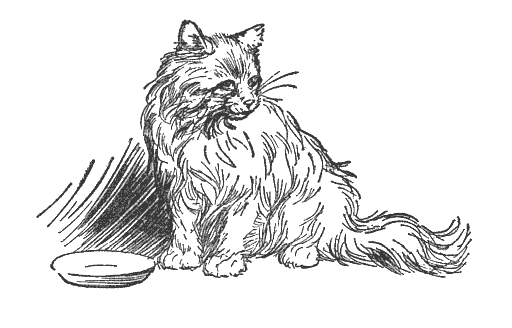
The Persian invalid had a teaspoonful of whisky and milk last night, and this morning he actually sat up and looked at the canary. It is considered an excellent sign by his human family but I wonder what the canary thinks—probably that this kind of cure may be carried too far.
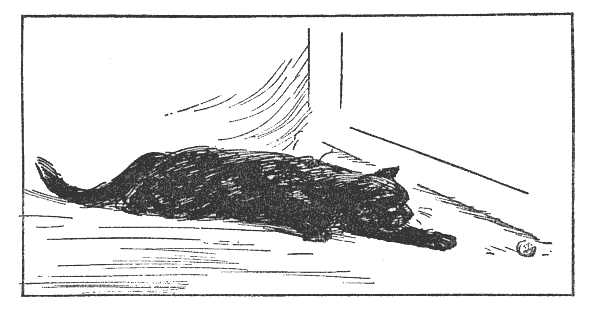
 ucky to be you, Sam. Nothing to do but sleep
and eat,” was a frequent apostrophe to the
cat of the house by friendly visitors. But
how dull! Why do we pretend to envy
the cat, while we speak of “a dog’s life” to describe
our periods of disappointment and depression? Why,
at the same time, do we use the term “cat” as a deadly
insult to our acquaintances while “a gay dog” conveys
the idea of a rather attractive and dashing fellow? The
inference seems to be that we cannot be at once either
comfortable and pleasant or popular and reasonably
happy, and that is defeatist; so let us resist it to the
death. Otherwise the world will go to the dogs and
that will be enough to make a cat laugh.
ucky to be you, Sam. Nothing to do but sleep
and eat,” was a frequent apostrophe to the
cat of the house by friendly visitors. But
how dull! Why do we pretend to envy
the cat, while we speak of “a dog’s life” to describe
our periods of disappointment and depression? Why,
at the same time, do we use the term “cat” as a deadly
insult to our acquaintances while “a gay dog” conveys
the idea of a rather attractive and dashing fellow? The
inference seems to be that we cannot be at once either
comfortable and pleasant or popular and reasonably
happy, and that is defeatist; so let us resist it to the
death. Otherwise the world will go to the dogs and
that will be enough to make a cat laugh.
Sometimes we looked rather guiltily at our sheltered cat, putting on weight under the new régime, but of course our solicitude was wasted. He topped sixteen pounds, seventeen, eighteen, and at last twenty, but he still had his own secret diversions.
In winter, when the garden was lost to him, the dark and often foggy days had their own charm. A black cat could lurk near the hall door invisible and slip out when it was opened and down the stairs.
He had calls to pay on other landings and, when at length brought home to the fold, always behaved as though his day were made, listening with a smug expression to the old woman’s reproaches.
“You will be the death of me,” she would say, pale from anxiety on his behalf. “You are as artful as a wagonload of monkeys and I need eyes in the back of my head.”
Sam knew well these lectures were a prelude to the opening of the larder door and would follow her in importantly to see what provender she had.
She was wax in his hands, and it was no wonder his girth increased, even though the kitchen suddenly began to produce unlimited ping-pong balls, which he would chase under the frigidaire and all other cupboards and corners.
His toilet, always a matter of great concern to him, now became a problem, with such a vast expanse for one tongue to cover. Yet he was supple enough and could tuck his head under his front legs and reach the base of his spine without musical accompaniment.
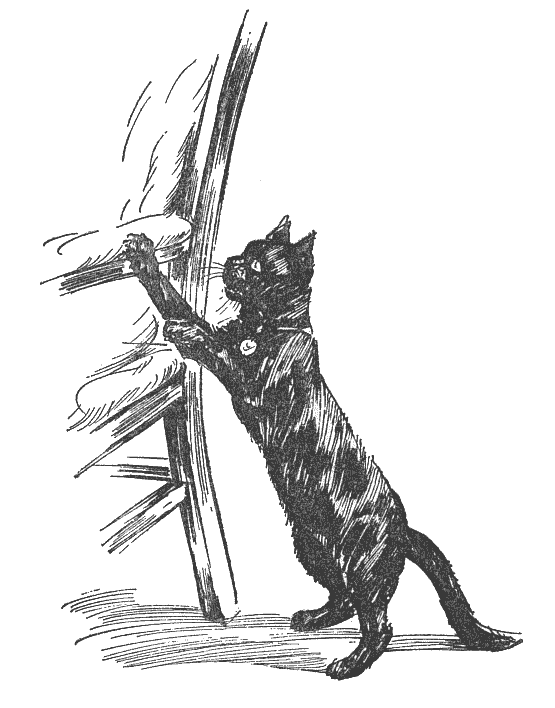
Having thoroughly groomed his back and washed every finger and toe in turn, he liked the support of a chair for more advanced physical jerks. Who doesn’t? It had to be an easy chair, however, with a soft arm to which he could hang on with one claw. Thus established, his back well supported, his long legs spread out before him, he would begin to wash his front from the neck downwards, the free paw waving like a balancing rod as he came to the more inaccessible parts.
That done he was ready to meet the world and if necessary to coerce it.
If someone sat writing or working when he desired attention he soon found a way to settle that. He would give due warning, perched on the arm of the chair and muttering from time to time until, goaded beyond endurance, he would at last take a flying leap into the middle of the offender’s materials. Then one discovered how much territory twenty pounds of cat can cover, for he would spread himself all over them and make further industry impossible.
These exhibitions were confined to the family circle, and he was much more circumspect when visitors were present. He seemed to like them in reason now and would look in to greet them. When they responded he would lie on the hearthrug or in his basket contentedly, but if they were anti-cat or even unnoticing, retire to the kitchen where people had better manners.
Now that he possessed two worlds, as it were, he could dispense with either, and we for our part could leave home with an easy mind, sure that the autocrat would have proper attention.
He disliked the clamor of parties, but once made a most tactful and timely appearance at a New Year’s Eve gathering, walking in and sitting in the middle of the circle at midnight for the drinking of healths, and “Auld Lang Syne.”
A black cat for luck! This incident rounded off the evening and sent everyone home certain of riches and good health. It was proclaimed almost as potent an augury as a dark man “first-footing” with a piece of coal in his hand.
A wirehaired terrier had come to dwell some floors below and occasionally took his walks on the roof. If Sam was in the garden, Paddy would race to the gate quivering with excitement, but the cat viewed him with the same unconcern which he had bestowed on the spaniel years before.
The dog’s bark of protest at being dragged away by his mistress seemed to fill him with puzzled interest rather than any other emotion and he would look up at us inquiringly as though to ask what all the fuss was about, then walk to the gate and peer after the intruder.
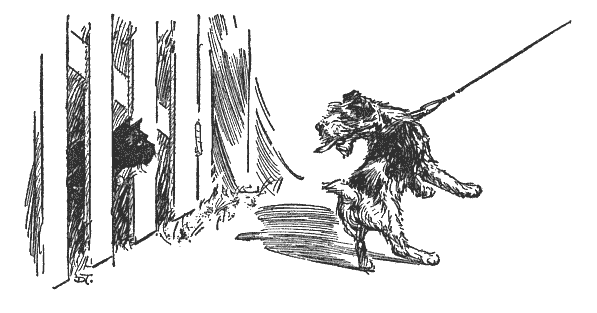
Still he is a cat of London and has his own position in the great metropolis. Dogs must be kept on a leash in certain places, but the cats are free as air. Friendly policemen hold up the traffic when they want to cross the road, and even bus drivers have been known to stop their snorting chariots and remove from the fairway a cat which has been too busy with its toilet to notice the danger. Powerful societies protect their interests, and for long they shared a cemetery with the dogs in Hyde Park where you may read inscriptions to their virtues and standing in the community on countless little headstones.
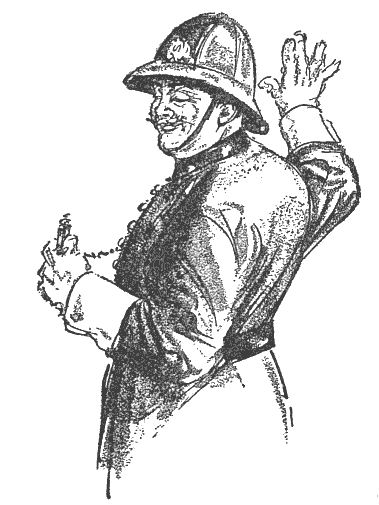
Samuel Penguin’s poise after all is natural, for he belongs to the kindliest and most tolerant as well as the greatest city in the world.
Of course people of other cities and other countries will try to dispute this fact and call it the result of pride and prejudice, but not at all.
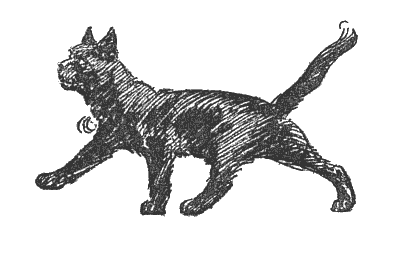
Continental visitors may complain that there are no outdoor cafés for their entertainment and Americans that there is too much ice in the atmosphere and too little in the glass, but that is just their funny foreign way.
Then there are some who have never seen the place and simply detest it as the capital of a country which hurt their national feelings in “1066 and All That” or a little later; but if Londoners thought along similar lines they would be too busy hating to get on with the serious business of life, seeing that nearly every other nation in the world has had a shot at them in the course of their long history. This is known in the inverted language of enemy circles today as “British aggression,” the phantom bogey used as a smoke screen by the gangsters of Europe.
“There are some people whose bad opinion we cannot afford to be without,” it has been said.
London, nursing no grievance out of the past, is content to leave it at that, perhaps, and looks on the noisy barking world much as Sam looks at the dog.
We came to London on a May evening out of Australia many years ago, only the one of us now gone having known and loved it before.
Some had warned us that it was always dull and gray, that we should miss the sunshine, the flowers, and gardens of our own young, glowing country, that we should die of the cold.
“You’ll never see a blade of grass in London,” said another.
Travelers’ Tales!
Outside one bedroom window at the hotel a slender plane tree was breaking into leaf; from another we saw the old square, green as only English grass is green, and lilacs and laburnums already in bloom.
“Roses, dear?” invited the Cockney flower woman in a feathered hat, as we came into the street. “Lovely roses, only a penny.”
London on a May evening thirty years ago almost to the very hour! Then as now the glow of twilight—a miracle unknown in our southern latitudes where night comes suddenly—filled all the sky and against it, above the crowding roofs, rose ancient spires whose beauty caught the heart. Big streets and little streets twisted and turned and ran away in bewildering confusion; odd little shops elbowed their richer neighbors; the dignified old Mansions in the squares were bright with window boxes—geraniums, daisies, and lobelias, red, white, and blue, for this was Coronation year. The gay Edwardian period was over and King George V would be crowned in June.
How those rather formal flowers amused us, as we met them everywhere, in the parks, on the balconies and even round the neat suburban lawns, yet looking back we can see that they fall into pattern with those more formal days.
There was grandeur then and the dignity of a long and rich tradition. Crowned heads were assembling from all over Europe (some uncrowned in the troublous times ahead to return for refuge and quiet days). The great town houses were filling with famous guests.
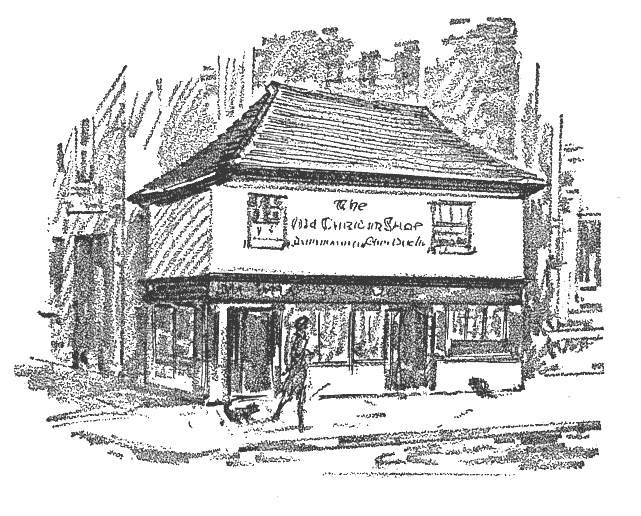
It was the London Season of a gala year in an age that has passed; stately receptions beginning at ten p.m. or later; red carpets before great doorways over the pavements, powdered footmen, gleaming satin, and Orders and Decorations at the head of the stairs; Melba singing at Covent Garden and every box flashing with jewels; garden parties on turf the centuries have planted and under splendid trees.
Although we had not thought of it we were to have our glimpse of all this simply because we were Britons from afar, come Home for a great occasion. Stranger hostesses were vague but kind.
“You are from Canada? . . . Australia, of course, how stupid of me! Then you must be presented to the Princess.”
Hastily and in some alarm we collected our wits to curtsey and retreat backwards as gracefully as might be.
Nothing of all this, however, was in our minds as we trod the magic pavements for the first time. It was enough that we were in London, and all the history and the literature of our race seemed to crowd about us.
Many foreign cities have that charm to some extent, but this was part of our blood and sinew and woven into the fashioning of our minds.
Yet no fervent patriotism had any part in the spell which London cast on me that night. Even the excitement of familiar names had been long anticipated and I had come with the usual mental reservations of the young towards something so long praised.
I can still recall the astounded and even slightly shocked certainty, as I breathed the air and saw the shape of London round me, that I should never, as long as I lived, want to leave it again.
The other morning we walked through one of the old squares. Cherry blossom in rosy clouds and crocuses and daffodils running through the grass over the trench shelters seemed to deny the war, but a Nazi bomb had struck two houses, which were being taken down.
They are not “town houses” any more, but pleasant homes, though rather difficult to run without the big staffs of former days. In one high room from which a wall had been struck away, firm and unharmed stood a walnut desk and a chair, which someone would be glad to see again. A mirror in a round gold frame hung behind them.
The things which survive this devastation are incalculable, and the blast from a bomb may travel hundreds of yards doing no harm, turn a corner, and knock out a window as though of malign choice.
Next door to the bombed premises a brass plate announced the offices of a Travel Society, and a banner the surprising legend, “Business as usual.”
A little distance from the square, seeking a short cut, we came upon a charming passage way, paved between small shops and leading down shallow curving steps to a road at the far end. There were daffodils in a greengrocer’s window and, less romantic but more to the point, spring onions. The onion shortage has become the stock music hall joke of the moment, and the orchid was outclassed as a popular gift by this hitherto rather vulgar vegetable. It was agreed that rations were no hardship, but without an onion the cook was lost.
The delicate looking young man behind the counter, as he wrapped up this treasure, spoke of the little court and its old world air. It would, he supposed, be swept away even if the bombs didn’t get it, when the war was over. Thackeray had lived in the house and there had been a plaque to say so at one time, but for some reason it had been taken away, he said. Perhaps there were doubts about it.
“But certainly Dickens lived round the corner,” added the young greengrocer. “He must have passed this way a thousand times.”
Of course he must, not merely the small unhappy boy trudging to his work in the blacking factory at Hungerford Stairs, but the wealthy and successful owner of Tavistock House, where great men came to dine or to join in private theatricals with the Dickens children.
It may be remembered that Thackeray, in the audience at one of these performances, set the house in a roar by rolling off his chair with laughter. Bulwer-Lytton would have been there too and the Carlyles, Mrs. Gaskell, Wilkie Collins, perhaps Charles Kemble or “the Admirable Emerson,” as Foster calls him, and once Hans Andersen.
And when the play was over it may be that Thackeray strolled out to choose the house where, in a year or two, he was to send Becky Sharp from Miss Pinkerton’s Academy to stay with her dear friend Amelia Sedley in Russell Square.
We had identified the place to our own satisfaction long ago and now walked home that way to see how it fared.
All was well. A tree at the square railing had been uprooted by a bomb, but the kindly grass was already hiding the wound. This is one of the largest squares in London, a place of quiet and shade to refresh the eye. Gray squirrels, wise in such matters, have long made their homes in it or had before death rained from the skies.
Thinking of Mr. Sedley’s comfort, Amelia’s mother would have chosen a south aspect, and so we had placed the house from “Vanity Fair” not far from the real one where Miss Mitford, a hundred years ago, was entertaining “Mr. Wordsworth and young Mr. Browning” at dinner. The Osbornes on the other hand faced east undoubtedly, and a very proper situation for this gloomy family, whose head, when he wished to dismiss a footman, simply kicked him downstairs.
From the window where I write I can see the tower and weathercock of the hotel at which we stayed when we came to London so long ago. It was new then and had replaced the home of a famous Royal Academician. The story goes that he once painted the portrait of a Russian General and throughout the sitting fierce Cossacks on white horses and with grounded spears stood on guard at the door. Those were certainly the days!
Not far away in an old church are the tombs of French aristocrats who fled to England from the Terror and the Guillotine. Now a new terror is abroad in Europe, and people speaking many tongues, escaped by what stratagems we cannot guess, tread the streets among us, citizens for a little while of what one of them has called “this wonderful and impossible island.”
But Samuel Penguin walks in, waving his tail, and I am reminded that this is the history of a cat of London, who was still, a few pages back, living in the piping times of peace.
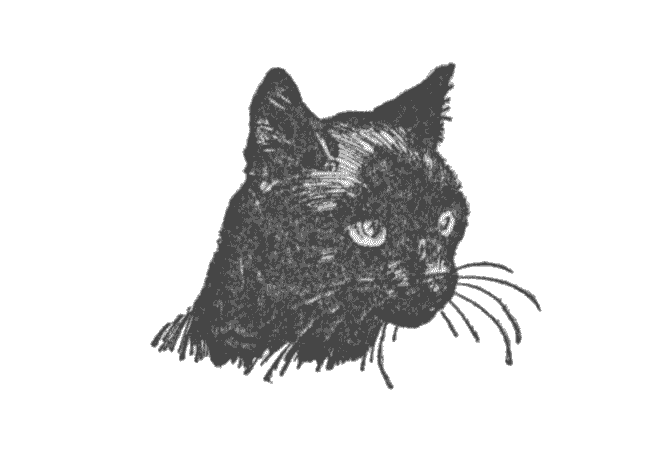
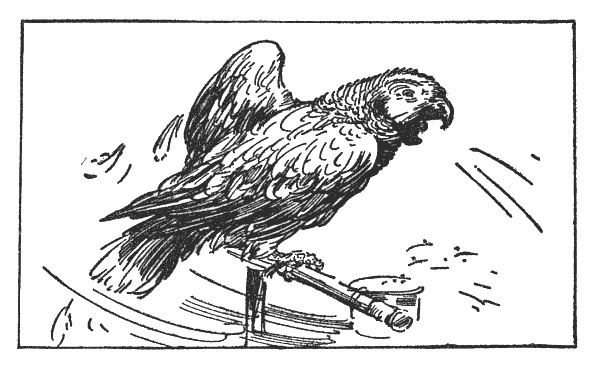
 parrot downstairs is reputed to have
second sight. Before an air raid he becomes
uneasy, fidgets on his perch and
refuses to go to sleep. It must be admitted,
however, that we know a hardier bird of the same
species who has used the national emergency to increase
his repertoire. His imitation of a whistling bomb
is a masterpiece.
parrot downstairs is reputed to have
second sight. Before an air raid he becomes
uneasy, fidgets on his perch and
refuses to go to sleep. It must be admitted,
however, that we know a hardier bird of the same
species who has used the national emergency to increase
his repertoire. His imitation of a whistling bomb
is a masterpiece.
Samuel Penguin is either not the seventh son of a seventh son, or else he knows too much about the future to worry. A wise cat, he does not tell all his thoughts, but as with Kipling’s Englishman
. . . “through clouds of Ers and Ums,
Obliquely and by inference illumination comes.”
And so, while from this distance the pre-war years may seem slightly fantastic to us and difficult to focus, his collaboration becomes important.
“Do you remember how frightened you used to be by the fireworks on Guy Fawkes Night, Sam?”
The cat of the house closes his eyes in a bored manner. He was a mere child at the time, and there is surely no point in raking the matter up, his look seems to suggest.
It was the only sign of fear we ever saw in him and so he was never left alone on that particular night. His estimate is probably correct therefore. He grew out of this terror of his youth on reaching years of discretion, but was far too cunning to let it out and lose the protecting care which sat beside him, produced his supper to the minute and arranged his bed.
“How old are you really, Lord Penguin?”
No response! The question is indelicate, and flattering titles cannot alter that. Helpful friends, anxious to settle the point, used to try to examine his teeth, having heard this is an infallible test with horses. They would then, according to their several dispositions, recall all the cats they had heard of who lived to be 17, 20, 26, or produce irrefutable evidence that ten years is the allotted span and we must prepare for the worst.
As to the latter idea, Sam has passed the Rubicon, and perhaps those two gratuitous opinions were fairly representative of the larger world just then.
Whatever history may have to say about the ’thirties, he wishes to state being an honest cat that they may have had their ups and downs like any other period but that, as far as he was concerned, the ups predominated.
His family were busy enough to earn him the comforts he required, and if their amusements were not his idea of fun, he doubtless remembered the old saying that it takes all kinds to make a world and did not interfere too often. There were of course periods of anxiety, such as the occasion when his friend was seriously ill in a nursing home. However, he went over to see the man, and after that his convalescence was only a matter of time.
Occasionally people of taste invited him out in a social way. There was the Russian lady who desired his acquaintance, for instance, and he was glad his bells and medals were kept as bright as the Georgian silver when he saw her sparkling gown. Thus they met as equals and “clicked” in the vulgar phrase of the day.
She belonged to the old régime, having escaped from the revolution, but was certainly post-Tchekov, for she neither moaned nor drooped, and when she spoke to the cat in her own soft tongue, shivers of ecstasy went up his spine and he rose on his haunches to caress her, a most affecting illustration of love at first sight.
There must be something about these Russians.
The “synthetic” kind, on the other hand, made no appeal to him, and they were beginning to be prevalent just then. It was considered highbrow for some strange reason. They went on conducted tours of the Soviet and obediently looked upon the bright side, though nothing would have induced them to do this at home.
One arty young woman on a very brief acquaintance delivered almost an ultimatum to us in our own drawing-room, after an impromptu lecture on the proletariat, the bourgeoisie, and Comrade This and That, had stifled all general conversation.
“You should go to Russia,” she finished.
We mentioned that it would not amuse us, being of those simple people who travel for relaxation, and turned in self-defense to speak to another guest of some distinction who was engrossed with the cat of the house.
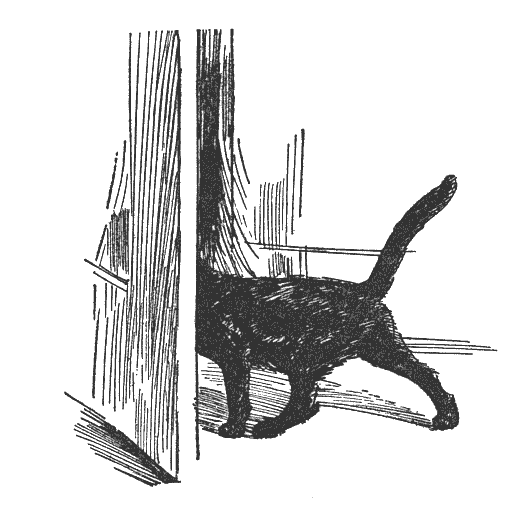
“Amuse?” said the self-appointed lecturer. “I am not talking of amusement. You ought to want to go there. You must go to Russia.”
Sam, as though he could bear no more, walked out of the room and created a diversion, and soon the arty one went away feeling us too trivial for further attention.
“Those women and their cat!” she was heard to describe us.
Our other guest smiled tolerantly at her departing back. “I have only known one real revolutionary,” she said, “and he was a disappointed man. He told me he found he had pulled down the overlords to be ruled by the underworld.”
Clearly a German!
Fluff the Persian jumped from his chair last night and walked—weakly, it is true, but still he walked—round the room.
This is important news, for it would be serious if “my daughter who is in the War Cabinet” were to send the army marching in the wrong direction, owing to personal anxiety.
“It was the whisky done it, dear,” said her mother, who in moments of excitement forgets her exalted child and uses this term of affection to all comers and both sexes.
The gardener, making a note of the cure, is filling a small phial of the precious stuff for the First Aid Post, where a ginger Tom has failed to respond to treatment. Our patient sniffs it and turns away in disgust, fortunately. Halibut oil is cheaper.
Perhaps it works outwards, for his coat has taken on a new gloss since our call at the hospital, and his eyes are like twin flash lamps in the gloom of a wet afternoon.
Having occasion to look up an article on the care of cats, I have been charmed to learn that “the short-haired British cat is noted for its graceful carriage and vigorous, swinging gait.” The Siamese, moreover, is “a Royal Cat, resembling the British but more delicately formed.”
No wonder the combination is irresistible.
“Sam, you are a King Penguin.”
“Or at least a half-crown Prince,” puts in the gardener.
The article, however, provided further information and now we know that our cat is old. “The Siamese,” it says, “is of a clear cream color, but as it ages the cream turns to fawn and the fawn to chocolate. Its face, ears, paws and tail have rich seal-brown markings.”
And there you have the picture of Prince Samuel Penguin in the year 1941. (You will have noticed that his titles came gradually, but that was sheer instinct. We must have sensed his royal blood.)
It was several years ago that the final proof of his ancestry appeared. In the dark days of that winter he was still a shining black cat, exquisitely groomed, with a spotless little white cravat just visible beneath his leather collar. His elderly slave removed the collar at nights, shocked at a stiffness which had never given him the least discomfort. To placate her he was provided with a softer article from a famous Cat and Dog Outfitters in the Burlington Arcade. Nevertheless, she was wrong. He liked to be fully dressed and ran to anyone who offered to put his collar on. He has never been a cat who cared to trail about in dressing gown and slippers.
When the spring came and he lay in the sun, he began to turn brown. It seemed at first an optical illusion, though occasionally the cat was accused by frivolous acquaintances of dyeing his hair. No one suspected the truth, that his Siamese strain was becoming visible, until quite suddenly there it was.
Samuel Penguin in the garden on a summer day was a chocolate-colored cat, with deep seal face, ears, paws and tail.
The Prince requires my chair and has just hooked a claw in the upholstery to draw attention to the fact. The claw has come out in the process, which clinches the matter. The chair must be given up for his toilet but at least the Audience may continue.
“What else does your Royal Highness remember of the passing years?”
He is reserved about it, though he pauses at the question, one hand in air, before folding this and washing it gently to help the young claw to grow. He looks very well against the rose and cream cushions, but he has always had an eye for color, a red coat or a gold blanket to lie on and the striped awning of the garden seat and the blaze of the gladioli in their tubs which made so fine a forest for him.
Up in the garden were ladybirds in scarlet jackets all the summer and bumble bees and a succeeding host of butterflies against which he would lift a furry arm.
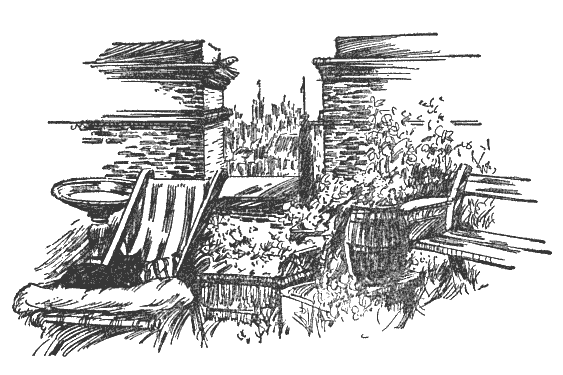
They were finer summers for a salamander than usual, so that sometimes breakfast and luncheon were laid on the roof, including of course his own. He had begun, by following at the old woman’s heels, to accompany us to the dining-room and would often be found already seated at table when she rang the gong.
He came to superintend, or look the menu over, nothing more, and would soon retire, though occasionally if pressed he would accept a morsel of bacon or baked meat, as though feeling he required a little fat for his digestion. This was his winter medicine, when following phenomenal summers London was dressed in snow for long spells and gleaming white roof tops spread before our eyes. Then the bird bath froze and had to be melted with boiling water, but Prince Samuel did not accompany these chilly expeditions. His basket, spread with a gold shawl, awaited him by the kitchen fire; the drawing-room hearthrug was there for his pleasure, and for variety the radiators were piping hot for a cold cat’s bones.
The gardener’s eiderdown was blue-green, another excellent color and a most superior article fat enough to engulf him in its silken folds. Towards the chilly hours of the dawn after making his usual round, he would pull her bedclothes aside and be welcomed in under the blankets, to lie with his head on the pillow beside her own.
“Cat of my heart and prop of my declining years, you were pretty comfortable, so don’t deny it.”
He is resting but waves the tip of his tail, giving the royal assent.
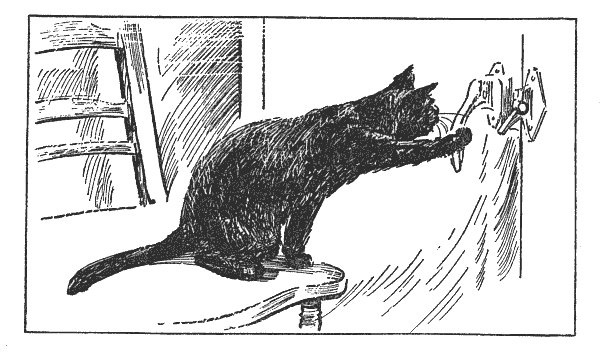
 f there are serious persons who consider it scandalous
that Samuel Penguin should have enjoyed
life during the dangerous ’thirties, it may
be urged in extenuation that at least he held his
tongue, when many less qualified were making
speeches, writing books, or issuing pamphlets to the
detriment of civilization.
f there are serious persons who consider it scandalous
that Samuel Penguin should have enjoyed
life during the dangerous ’thirties, it may
be urged in extenuation that at least he held his
tongue, when many less qualified were making
speeches, writing books, or issuing pamphlets to the
detriment of civilization.
There can surely never have been a time when so many people who had no responsibility for the proper running of the world wished to teach their grandmothers in ten easy lessons. Perhaps it will rank in history as the Silly Season when sounding brass and tinkling cymbals were the most popular and paying instruments.
It was a grand opportunity for the dictators who, while corrupting their peoples at home, now set out to corrupt the language of the human race. For instance, when they wanted bombing practice for their airmen they sent them down to Spain to kill Spaniards and called this non-intervention; and when they wanted to try out a new battleship, they turned the guns on more Spaniards, thus, if we are to believe all we hear, making that country their firm friend for life.
Similarly these fine fellows, full of youth and virility, never went to war, oh, dear, no! They simply set out to “pacify” peaceful and inoffensive countries, with tanks, bombs, poison gas, murder, and pillage.
All this was done, they said, in the interests of the Anti-Comintern pact, which naturally led to a grand alliance between the Antis and the Comintern, until they were ready to turn round and attack Russia.
Meanwhile the pupils of Dr. Goebbels’ Academy, willing and unwilling, were being misinstructed about Britain. She was decadent, she was done and her Empire falling away. This has always been a popular theme in times of peace, partly because the downfall of the great is always pleasing to contemplate in imagination, and partly because her insignificant size on the map is rather an affront to patriotic citizens of larger territories. “Besides, empires do fall. Look at Rome,” said the knowing ones, and budding Gibbons began to sharpen their pencils.
Even some of our best friends grew to believe it. She was pro-Nazi, thought some; she isn’t aware of the Communist menace, feared others; which was all very handy for the dictators because it kept the pupils’ eyes off these factions at home.
In the next course of lessons it was proclaimed that the Germans didn’t lose the last war, but won it, and that Britain not Germany invaded Belgium, also that Britain had spent her whole life in aggression, and at the same time she never did any fighting but left it to other people to pull her chestnuts out of the fire.
It would have been awkward if the pupils had looked up the statistics at this point, for they would have discovered that Britannia lost more in killed and wounded than any one of her Allies in the last war and spent on it many thousands of millions more than the richest of them.
All this time, if Britain raised her voice, what she said was immediately condemned as propaganda, and if she said nothing at all, her silence was immediately condemned as propaganda. No wonder the Ark Royal after being many times “sunk” by German submarines and again “sunk” by Italian submarines, rose from the deep and smote the Bismarck the other day.
It was very odd too how directly any other power began a war, people seemed to expect Britain to rush out and intervene.
| Britain | ought | to | stop | the | Japanese in Manchuria. |
| ” | ” | ” | ” | ” | Italians in Abyssinia. |
| ” | ” | ” | ” | ” | Spaniards in Spain. |
| ” | ” | ” | ” | ” | Japanese in China. |
| ” | ” | ” | ” | ” | Germans in Czecho-Slovakia. |
Yet when, according to her word, she set out to stop the Germans in Poland, Norway, Holland, Belgium, etc., etc., Dr. Goebbels’ faithful pupils asked what she was fighting for.
Never in all his nine lives had a cat heard such a fantasia, and thus I daresay were the Quislings raised—an international band of dupes and rogues, to sell their countries into slavery.
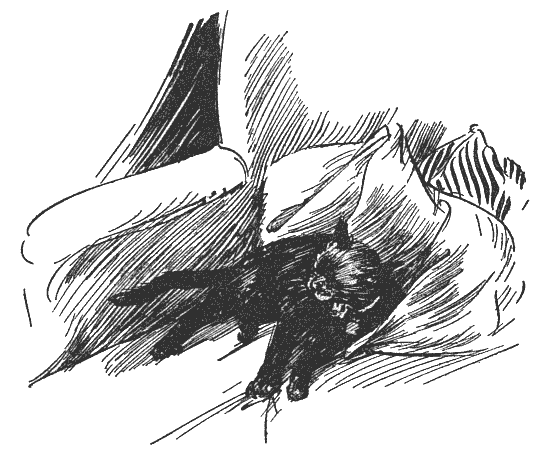
In these peace-loving and non-military islands meanwhile it was most unwise that we were not arming to the teeth, but as every one of our friends was even more nonchalant on this point, it can hardly be called nefarious. Why should others have had the monopoly of wishful thinking? Fair is fair.
Samuel Penguin, a wise fellow, devoted his time and attention to real events and avoided illusions. He was all for punctuality and, if his meals were not forthcoming to the minute, took steps to enforce it. Marching into the kitchen he would mount a chair near the larder door and thump the handle with his fist, thus distracting the cook and bringing her to her senses.
He had views about early rising, too, and had gradually perfected a technique of his own to get the household up at dawn. The first move was to sit on the gardener’s dressing chest and with a long arm roll a pencil round and round in a china jar until the noise awakened her. The jar was a tall one, but he never once knocked it over and only gave up when the pencil was removed. Next he tried standing on two legs by the bed and drawing his claws down the sheet with a rending sound; or he put them in the pillow case and withdraw them sharply. If this had no effect he climbed to her pillow and sat there grunting loudly and touching her face from time to time with a paddy paw.
When finally exasperated, a claw would come out and it was as well for the quarry to retire from view under the sheet. At that he would leap down with an indignant thud and attack another sleeper in the same way. It mattered little to him who got up as long as somebody did. There was an empty bowl in the kitchen, and he couldn’t bear the sight of it.
Thus he not merely maintained discipline in the home but conserved his strength against alarms and excursions to come. How else are we to explain that his old acquaintance Paddy has to take a bromide to quieten his nerves when raids disturb the night, while he sits through the din and terror with all the dignity of his royal descent?
They frequently meet on the stairs going down to bed in the air raid shelter, Paddy on a lead and Sam pausing to sharpen his claws where the carpet is a little worn. This he does with great vigor as though to have his weapons ready should the enemy come his way. The terrier greets him with a wag of the ex-tail and the two, if left to their own devices, would probably be very good friends.
Let it not be thought, however, that Paddy is a dog without spirit. He has a bosom foe who lives round the corner, quite a pleasing fellow to human eyes, though perhaps a little loud in the bark for good breeding. He sits in his owner’s car panting importantly, tongue out. This may appear offensive to a dog who has no car. At all events, neither can pass within sight of the other without an uproar. Their private war has reached such a pitch that their outgoings and incomings have to be regulated by consultation between the two families.
In peace time it might have led to polite recriminations, but not now. The enemy dog belongs to an Animal Guard, the car is an animal “ambulance”; Paddy’s mother, who gives her time to a poor children’s nursery, supports by subscription the Animal Post. Honors therefore are even.
Hotel Dog on the other hand doesn’t mind in the least who sits in cars. He lives at a public house, or more generally outside it, rather unkempt but benevolent—a goodhearted, vulgar dog who seems to have no other name. He was one of the pioneer patients at the First Aid Post, for he cut his paws on broken glass in the early days of the “blitz” and sat like a stoic while the splinters were taken out and stout bandage footwear provided. This danger in conjunction with the blackout must have made life rather complicated for the dogs of London. Samuel Penguin, having lamps in his head, is in a superior position.
The war was still some years away when the old one departed to draw her pension and Samuel Penguin acquired a new adherent, at the opposite end of the scale—a creature young and smiling, who sang about the house when the first shyness wore off and was enchanted to have a cat for company.
She came straight from a little town in Eire, a lovely land where they believe in many fairies but only one dragon, called England. She had been told that it wasn’t safe for a decent lass to set foot in the place, with odds and ends of history about a scoundrel named Cromwell and the “Norman tyrants,” or it may be Norsemen, she is not sure which, but anyway England was responsible and it was a black shame.
Considering that several million of her compatriots earned their living here and survived to tell the tale, she decided to take the risk and, turning her bright face on London, quickly loved it.
She liked its quiet voices and peaceable citizens, but equally no doubt the good wages, lighter work, and greater leisure, the exciting new fruits and other food never seen in her corner of the world. It seems that in her last place she had rarely had time to sit down to a meal, had no half day off and never a present. Her first birthday cake, complete with sugar roses, presented by Samuel Penguin was sent, almost in its entirety, straight home to her family to show what London could do.
He of course was in his element. He could always spread himself out in her easy chair because she had not learned to sit down. She soon knew exactly how to warm his meat under the hot tap when it came from the frigidaire and never failed to shake up his cushions or provide clean shawls for his basket. All this exactly suited a large and influential house cat getting on in years; yet her youth was good for him too and at times he would race like a kitten at her heels.
The gulf between life with the highly-trained and dignified old woman and the new régime was bridged by the amusement it afforded us, assisted by Irish charm and quick intelligence. Contrary to custom in her calling, the girl loved visitors, greeted all comers with a brilliant smile of welcome, and made light of the extra work they gave her.
We have always liked Ireland, and if she became a beacon for the bombing of British cities and the sinking of the ships of all civilized nations, that is hardly the fault of her people, kept ignorant and nourished on a hate past all reason and amendment and belief in a power and grandeur which never existed. Whatever you gave Eire she would want something else, and because hatred is the most self-destroying emotion, she has become a menace to herself and us.
Her sons, declared one of their leaders the other day, would rather die than fight for Britain (making this, by implication as some others try to do, a British War). A grand and flashing statement by a speaker who knew full well that many thousands of Eire’s sons are in fact doing just that—fighting, dying, winning distinction for valor and even going home on leave!
A friend of Irish descent, after a visit home some years ago, declared that Eire had “frightened England” into giving up the bases and also that we should shortly witness from Dublin the greatest renaissance in history.
Dragons and fairy tales!
About the same time young gangsters of the so-called I.R.A., financed by foreign “sympathizers,” indicted for murder of the most cowardly description in a British Court, were shouting belligerently “Up the Republic!” as though somebody were trying to put it down.
Poor Ireland, land of illusions. The renaissance she needs is not to be found in airy talk and vain imaginings.
Rumor says that some empty luxury flats have been taken over by the authorities and that Fluff the Persian and family are to be installed in one. This should certainly effect a cure.
“There’s constant hot water and central heating, dear, and there may be a frig.,” announced his owner eagerly. “We shall be posh.”
The cat’s illness has reduced him to the size of a poor little rabbit. It has been impossible to wash his lovely hair, an office performed for him since infancy hitherto, to save him from eating it, she says. In the new flat all things will be possible; even the canary, hitherto disregarded, may sing again in a sunny window. In fact, the glass is set fair.
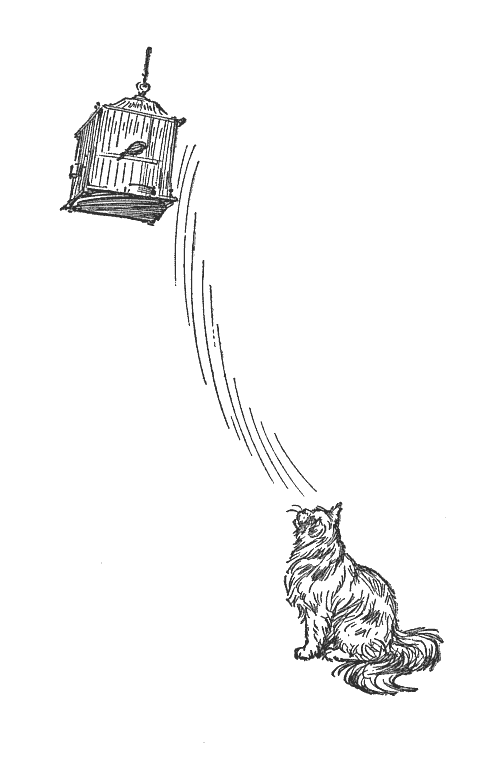
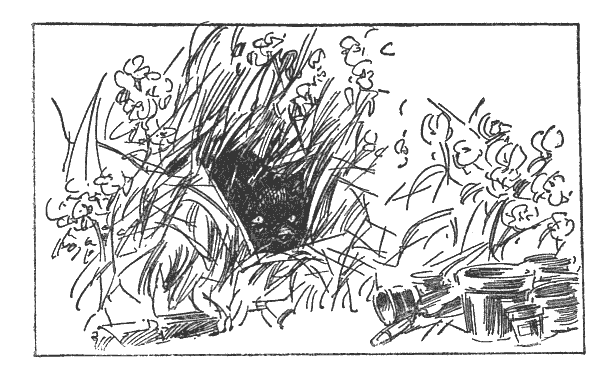
 ife was pleasant that summer of 1938 and the
little garden a blaze of color, flowers spilling
over the tubs and up the fences and making
a brave and glowing forest through which
a cat could watch the feasting birds.
ife was pleasant that summer of 1938 and the
little garden a blaze of color, flowers spilling
over the tubs and up the fences and making
a brave and glowing forest through which
a cat could watch the feasting birds.
Strange things seeded or took root there—a blackberry bush and some buttercups brought in from a drive in the country, the latter blooming now, and even a baby vine. We had hopes that this would flourish and envelop the railings with a panoply of refreshing green, but it did not survive the winter. Yet round the corner where a hundred years ago or so there were country gardens and vineries, areas of some of the close-built houses are filled with trailing vines, lineal descendants, no doubt, of those which provided fruit for the tables of the great.
Old associations die hard. Coming from a fruitful country, we missed the vine leaves which always made so cooling our dessert dishes on a summer day at home. It was strange to see grapes in the London shops preciously laid on nests of cotton wool instead and even the oranges in paper jackets.
Nevertheless, in this neighborhood we found a famous shop where even the more bizarre tropical fruits could be bought in season. We had not been here many months before a magnificent box of flowers with silver trimmings arrived from the management, in celebration of the fact that the firm had served the district for fifty years. It is still there, though the tropic fruits are absent for the moment. If it were bombed tomorrow it would rise up next door or across the road like its greater and lesser brethren. In this permanence or persistence, I think, is Britain’s strength.
The newspaper this morning mentions a village church which still receives an annual payment for prayers for the Danes and Englishmen who fought each other there in the year a.d. 1001. These islands are full of such old bequests still faithfully paid, but this one must be the oldest and strangest. Perhaps after nine hundred and forty years the congregation will feel at liberty to stretch a point and pray instead for our friends the living Danes in duress to the enemy.
Our Irish lassie, carrying up water for the garden, or sometimes a cat who liked to pretend he was too exhausted to walk, planted some shamrocks and saw them disprove the legend that this patriotic weed would not condescend to grow in English soil. Her widening experience of the outer world was often illuminating. She was rather shocked to discover that this was a small island and not as she had been led to believe the largest as well as the most villainous country in the world, and astounded to learn that Cromwell played the tyrant in England as well as Ireland. Here we could give her full satisfaction, for we cherish no fondness for the so-called Protector and hate to see his squat effigy before the Houses of Parliament.
It seems the fashion to admire the man, yet he stirred up class hatred and religious strife and set himself above the law, like dictators before and since.
And here is another “continuity” item from the morning paper. A mill owner writes that a portion of a German bomb which penetrated his roof now hangs side by side in his office with a cannon ball fired into the same premises by Oliver Cromwell. He dates his communication from A Loyalist Town in England, thus neatly expressing his opinion of Oliver. Perhaps it is
“. . . the little mill that clacks
So busy by the brook,
She has grown her corn and paid her tax
Ever since Domesday Book.”
Loyalist, the old word ringing back to us across the centuries, has a certain fitness to a united people now and shows up Fascist, Communist, and National Socialist for the narrow creeds they are.
The gardener has just returned from duty at the Animal Post with a reward of merit. It is not an official decoration but an orange, thin-skinned, juicy, and of stout proportions and was presented to her by a stranger. Her colleague on duty received another, after which the philanthropist with her bag of gold moved on.
Nothing surprises one any more. Such little acts are perhaps all she can do. Another woman, busy and important this time, found her lawn overgrown; so, after church one Sunday, she seized the shears and cut it, by hand. When the grass was dry she carried it with her going on duty, and presented it to the first horse she met.
By way of contrast the Post was later attacked by another stranger who said the Guards did not know their business. Her street was simply full of cats, just walking about.
In answer to inquiries it turned out the street had not been bombed and that the cats were private cats with quite as much right to walk there as she had. The guards were not, they explained, cat-and-dog gatherers in general; they had no license for any such proceeding.
The complainant was mollified and rather impressed, for her English, though voluble, was of foreign extraction; she could not read the language and had entirely misunderstood the reason for their existence. She had, in short, been moved by the inevitable human impulse to prove how much better we do these things abroad.
Samuel Penguin made a new acquaintance that summer of 1938. A school boy was found talking to him wistfully through the garden gate, too polite to enter without permission.
He was invited in, and often appeared, always looking rather lost and out of spirits.
“Aren’t you very late going back to school?” asked the gardener one morning.
“That’s just it,” he replied eagerly, “I’m at school in Germany, and things are rather messed up. You see, they’ve taken my headmaster.”
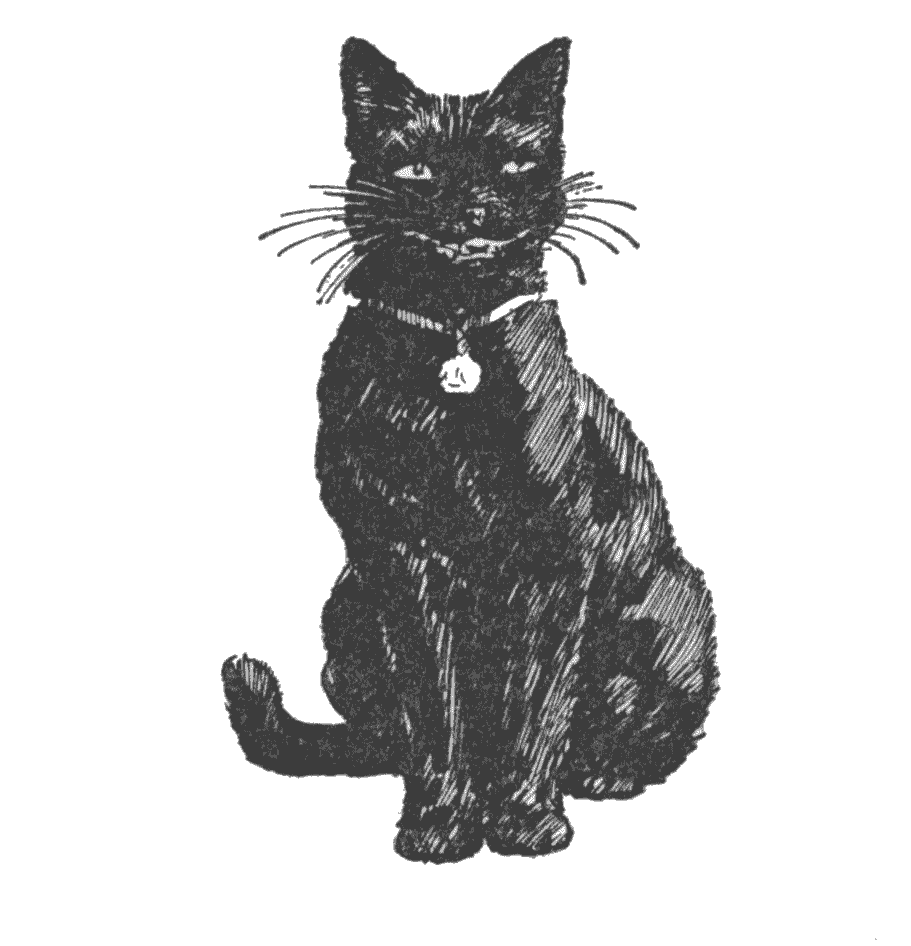
“Taken him? How do you mean? Who?”
“The Nazis. So naturally my people don’t quite know what to do—except that I shan’t go back,” said the boy. “He was a pretty fine chap too and they came and took him—just like that.”
The episode had evidently shocked him badly, as well it might. He had seen at first hand the dawning horror that was to engulf so many innocent people, and perhaps by now is in training to avenge his friend.
Sam, faithful to his preference for the sex, would sit at the lad’s feet as he gazed about him, lost for occupation and companionship and wishing, as he put it, he had never set foot in the beastly country. He was at the wrong age to be changing schools, and we felt full of sympathy for him, marooned among elders with no one of his own age in sight.
There were some American children in one of the flats, but they were a host in themselves and rumor put their numbers at anything from six to twenty. When they left for their own country every one breathed a sigh of relief, not for personal reasons but from their hair-raising escapades. Their bedrooms looked on the area where, according to eye witnesses, they used to hang head-downwards over the window ledges like a row of little eels with no visible means of support. An awful tragedy was confidently expected but never came to pass. We had to close the garden gate against them after one, aged about six, had shown an obstinate desire to climb down the face of the building, and we can only hope they have not gone to live in a skyscraper.
And then we saw our first gas mask. A young man stood on a platform wearing it for the instruction of a large audience; a lecturer explained its functions and a local Jack-in-office took the chair. The Civil Defense Services were in their birth throes, and citizens, men and women, old and young, were urged to attend a course of lectures to be ready to serve their country should the need arise.
It was not a very bright or promising function. Toothless old ladies who could never be useful were permitted to sign on, and when someone asked if glasses could be used under a gas mask the Jack-in-office replied crushingly: “You needn’t worry about that. There’ll be no time for reading novels during a gas attack.”
It did not seem to occur to him that there would be lives to save by citizens with defective sight.
Yet in spite of these beginnings something was done, for when the Munich crisis brought us the imminent danger of war, there were gas masks, and there were at least a nucleus of trained volunteers to fit them and give them out.
There was no time for anything but the immediate problems, the hasty communications with friends, farewells to those who were crowding the shipping offices, anxiety for others abroad who might not get home; night calls from the country asking us to see school girl daughters into trains: indignant and rather contemptuous amusement of the young persons in question who had rather hoped to “see the fun”; our Irish lassie who should perhaps go home; our Samuel Penguin who must not be left orphaned and alone.
She would not go, the girl from Eire. She was no coward to be running away, she said, and S. Penguin’s safety should be her affair.
As to putting him to sleep as some were doing, it would be murder and she couldn’t bear it. Neither in fact could we.
The gas masks were distributed at centers all over London. I can see still the patient queues of men, women, and children assembled for this ghoulish purpose, moving slowly in, being fitted, signing their names and passing out.
“Is there anything to pay, Miss?”
“No, nothing to pay.”
The girl student at the desk had been answering such questions for fourteen hours a day until the crowds, she said, approached and receded in her dreams all night.
A young man loomed up behind her.
“Come out to dinner with me, Valerie,” he pleaded.
“Can’t possibly. I shall be here till half past nine.” And then in a somewhat critical tone: “Where have you been?”
“Digging trenches in the park, the last twenty-four hours.”
“Oh!”
She had melted. Someone took her place and she was persuaded to go. Today she is in uniform doing highly technical work for the guns and he is in the Middle East. They were married after his escape from Dunkirk.
The crisis passed, and the world breathed a sigh of relief. Had it not passed we should have gone to war without arms, and civilization by now would presumably be dead, so let us cast a veil, as the Victorians used to say, over the flood of abuse which later arose from some quarters against the man who gave us that year of grace. History will deal with them.
There are even yet people here and there about the globe in safe armchairs who seem to think war is a game of Halma, unencumbered by mere oceans, mountain ranges, and living pawns to be fed, moved, and equipped. They make one think wistfully of “the Mikado,” whose object all sublime was to make the punishment fit the crime—“something lingering, with boiling oil in it,” or let us say a compulsory trip in a mine sweeper, or a day or two in a desert sandstorm with the temperature at 127° in the shade; or even a turn of fire-spotting in a church steeple. The possibilities are almost limitless, to cure these self-appointed advisers to the men who are doing the job and carrying the burden of responsibility.
Samuel Penguin, always a talented cat, celebrated the end of this period of tension in international affairs in a most fitting manner. Believe it or not, he smiled.
Young Ireland had won his heart completely. She smiled and he smiled. At the sound of her step in the room he would awaken from the deepest sleep, lift his head, and gaze at her with lips parted and teeth showing, in a smile far superior to anything the Cheshire Cat accomplished.
This is still his invariable greeting to her, for she stayed on, through the I.R.A. disturbance, through war and raids, gallant as the best of her people, and in a few weeks will leave us to serve this country until the end of the war.
No reproach has ever come from her family at home either, only a brief note of praise: “I’m glad you have your mother’s spirit;” and another of warning, “Now you are joining National Service, take care of yourself.”
Sam will be desolate.
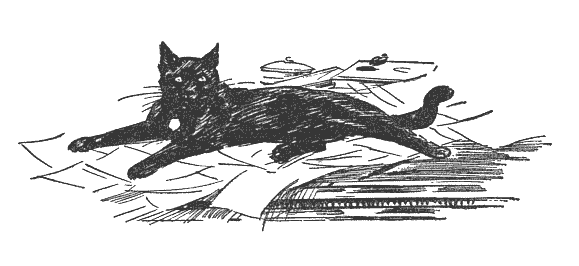
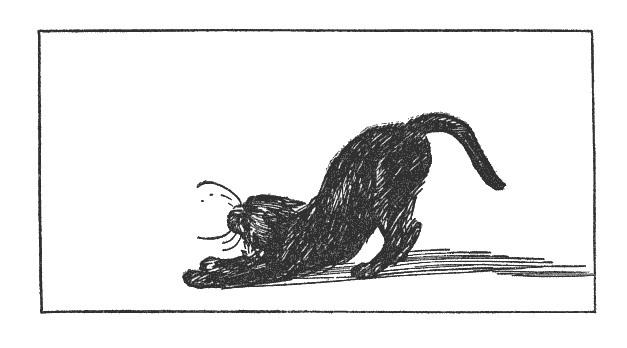
 re-war, how long ago it seems already, the
second pre-war period we remember, and
how insouciant was the first in comparison.
War came thundering suddenly at the gates
in 1914, as far as our generation was concerned, and
perhaps we were luckier than the young of this, who
saw it coming for so long. The worst of the little
wretches is that they never tell their thoughts, but then
neither did we. Let us above all things keep our memories
oiled and greased and in good running order.
re-war, how long ago it seems already, the
second pre-war period we remember, and
how insouciant was the first in comparison.
War came thundering suddenly at the gates
in 1914, as far as our generation was concerned, and
perhaps we were luckier than the young of this, who
saw it coming for so long. The worst of the little
wretches is that they never tell their thoughts, but then
neither did we. Let us above all things keep our memories
oiled and greased and in good running order.
Those who omitted these simple precautions must feel rather small when they see modern youth, so recently reviled, leaping about the skies or performing prodigies of valor amid falling bombs.
“Aren’t you frightened?” ask the noncombatants, endeavoring to express admiration in a suitable manner.
“Terrified,” say the little devils in that cheerful tone which leaves you exactly where you were, hoping for their own sakes that they are lying and for yours that they are telling the truth.
They look in, when they are on leave, and we try to grasp the fact that these imposing warriors are really the children we knew only the other day. Fantastic pictures return to our minds.
John, a fair-haired angel lying in bed, lazy and smiling, not in the least talented, declared his modest mother, but rather a darling; John at a children’s party, carrying off all the best prizes to everyone’s stupefaction a year or two later. John at his public school coming to tea on Sundays and making much of Sam, pretending to have no views on what he meant to do, silent as the Sphinx, but mopping up honors behind our backs, reading highbrow books and going to highbrow concerts.
And now this authoritative gentleman with a Commission in His Majesty’s Army telling unblushingly how he nearly jumped out of his skin when he heard a big gun as he crossed London last night!
We don’t believe a word of it.
“And how is Marjorie?” we ask.
“Oh, she’s all right. Working ten hours a day, so she says, but she always seems ready to dance all night with that pilot fellow when he goes on leave.”
No, no, not his cousin Marjorie. Why, she was a bookworm. Weren’t we there when she almost wept because they insisted she must learn dancing at school? It was Tommy Rot, she said,—only the other day.
But in time Marjorie, herself on leave, looks in politely, a ravishing young woman of twenty who says, of course, nothing of pilots. She has apparently never heard the word. She mentions, however, that John seems to have so many hussies desiring his photograph that she concludes he means to join the Mormons.
There’s Michael, too, who was nine not so long ago and demanding a typewriter from school because writing home was such a strain; and he’s a sergeant-pilot with a decoration, which he says they must have drawn lots for. All the planes he has shot down were “sitting birds” and you couldn’t miss ’em.
He was one of a group we tactlessly offered to take to “Alice in Wonderland” one Christmas, hastily choosing a different play at the sight of four blank infant faces.
“Don’t you like the book then?” we ventured to inquire.
“Never read it,” announced one.
“Its a classic,” with great scorn, “and we are never going to read any classics as long as we live.”
They are probably all steeped in learning by now, to judge from their letters.
There is nothing like a good large war to teach the knowing how little they really know of friends, relatives, neighbors, and the people they pass in the street every day.
The golden-haired young man, for instance, looks like a wilting lily, yet he has been seen clambering over housetops under a hail of incendiaries, his peacetime profession of dancing having made him supple, he says mildly, as though in extenuation. There is a tale too that he picked up a bomb while authority railed at him for a fool. Still it had to be taken to safety and in short he took it, to where in due course it exploded with a beautiful bang and did no harm.
No one could have expected either that the pleasant and popular middleaged woman would do nothing whatever but bemoan her lost comforts and luxuries and treat the war as a personal affront, or that the dullest and most listless of girls would suddenly exclaim: “Isn’t it marvelous? My age group is being called up on Saturday. In a few weeks I shall be off.”
In the months after Munich well over a million volunteers attended training in Civil Defense, that new and still experimental fourth arm of the Service. Ten lectures on bombs, gas, and air raid precautions generally, introduction to the gas chamber, an examination, a silver badge, a brief first aid course, and they were passed on to their own district to join others already there and continue to learn by co-operation. People of all kinds assembled, the barrister’s wife, the milliner’s apprentice, the Bishop’s son, the University lecturer, the house painter, the working man, the artist, the theatrical manager, the old parson, the naturalized German, the quick little Italian, the Russian Jew, the Polish lady, and the woman who had been in the Spanish war and never let you forget it, the doctor’s wife.
This was a nucleus of an Air Raid Wardens’ Service, the composition of which changed and expanded and retracted as the months wore on. They mapped their area, learned every house in it, every hydrant, and every industry; they had mock raids to test their memory and wits, sometimes indoors alone but sometimes out of doors in conjunction with the auxiliary fire services. Umpires loomed up and said that this or that point had been theoretically bombed or set alight and they were expected to get the appropriate rescue services to the spot in record time. Next night a solemn postmortem would reveal strange things. Why did the warden at such and such a point pass the casualties lying in his path, instead of rendering first aid? Why, when informed a house was on fire, had another warden replied haughtily, “Well, I can’t help that!” Unnatural young man! He should have jumped on the footboard of the nearest trailer pump and directed it to the scene, a joyful privilege surely. The women, busy at the post telephoning hair-raising messages of synthetic damage, would have loved this opportunity.
Then there were lecturers, facetious ones who talked of “the fair sex,” Jacks-in-office who knew everything but mustn’t divulge a word; sensible men like the police inspector, with whose men the wardens would in due course collaborate.
“Never alarm a crowd or order them,” said this wise man. “Jolly them. Say ‘Come along, now, Ma, there’s a good soul’; and you’ll have no trouble.”
They worked at odd tasks in the oddest places—a disused barracks so incredibly old that you pictured soldiers in tight red jackets and tighter trousers swarming up the iron stairs; in the back room of an ancient book shop after hours; in the fine modern Town Hall of the Borough; or in a clinic full of children’s toys. Space was used where it could be begged or borrowed.
They learned in theory how to crawl into a burning room, face ten inches from the floor; and to rescue, still in position, an unconscious casualty by tying his hands, hooking them round their necks and dragging him out of danger.
One speaker even had his own infallible theory for stemming a panic. You simply seized the first panicky person by the leg and brought him down, he said. It is possible this simple expedient might paralyze the rest, in sheer astonishment and admiration, but fortunately it has not yet had to be put to the test.
Another man knew for a fact that Germany could send over 500 bombers every quarter of an hour for twenty-four hours at a stretch; a second declared it was considered very doubtful that they would ever reach London at all. One amateur school of thought said a single high explosive would obliterate a whole shopping street; the next that there was a Ray. This was of course a profound secret, but “my brother-in-law told me out on a country road at dawn the other morning an intimate friend of his saw this and that.”
There was the gas mask census too, when, without being intrusive, they discovered the whereabouts of the very young and the old and infirm, and made amusing contacts. The woman with the incredibly theatrical name proved to be a learned expert on Byzantine art, and the man who looked like a revolutionary gave all his leisure to the poor. Some thought they wanted to sell a vacuum cleaner; others were offended because they had not been “approached” before. This man didn’t believe in either wars or gas masks; the next one said they were wonderful to bother about him and his safety. They met countless cats and dogs and at least one dear old soul who knew for a fact that there would not be war because she had a great friend in Germany, a most charming woman, and she had assured her in confidence Hitler was dead and they were keeping it quiet.
“So don’t you worry, my dear. We shall see what we shall see.”
Thus by trial and error the Wardens’ service was born; and with their different problems, the auxiliary fire service, the civil ambulance brigade, first aid, demolition parties and the rest. Much theory was to be disproved by practice, thousands of the volunteers to pass into other forms of war work or into the Army, Navy, or Air Force, yet the fact remains that some millions of Britons all over the country gave their time without pay or allowances and learned to work together. Few could have shared that experience without seeing in anticipation horrors undreamed of by other civilian generations—streets full of wounded and dead at the very least.
Yet at this time foreign visitors were always warning us that we didn’t understand the danger or appreciate the German might. A covert and no doubt unconscious admiration for this “might,” due after all to torture, murder, wholesale burglary, corruption, and lying, has been Hitler’s best ally.
And now it is June and a blazing summer morning. Prince Samuel Penguin has even discarded collar and decorations and lies, as naked as nature permits a poor fur cat to be, spread out in the coolest corners he can find. On a distant tower a watcher is combining business with pleasure and enjoying a sun bath in a deck chair. He should be a nice mahogany shade by nightfall. George the balloon cannot bear it; he has been up and down six times at least; but the crew is being firm with him. This is no time for malingering or deserting his colleagues far up in the blue. Ever since dawn above the roar of London’s traffic we have heard the constant hum of planes, but they travel high and out of our sight. They will be talking to each other as they go, relieving the tedium of routine with airy nothings perhaps, appropriate phrase, and unconscious of the world below wishing them happy landings.
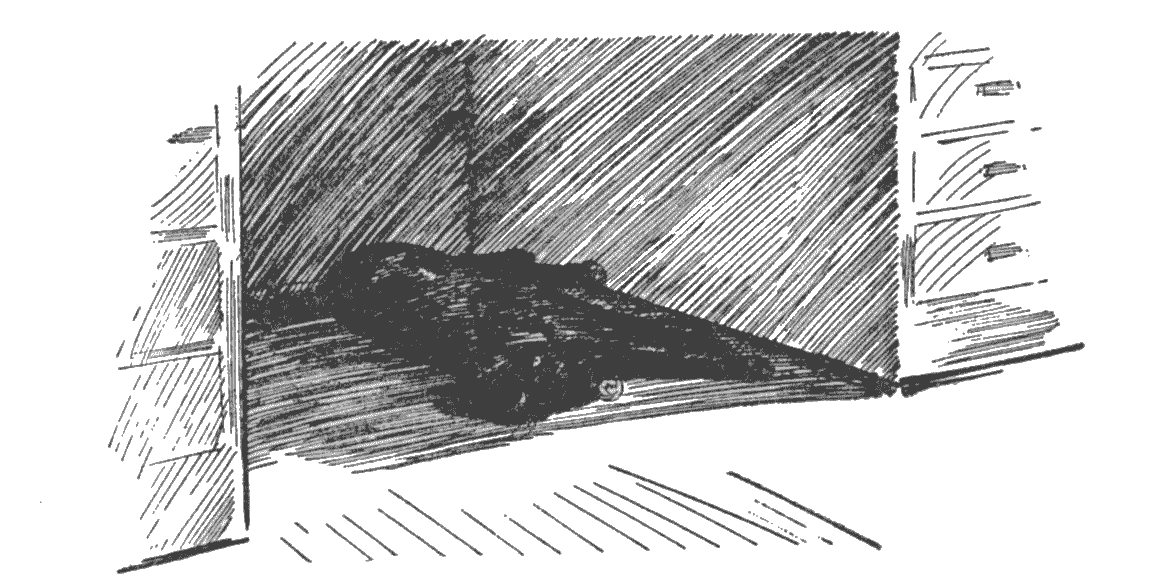
“There goes Sergeant Buzz-Fuzz,” says someone, or “I wonder if that is Tom or young Percival?”
They were schoolboys only the other day.
And now the sound of their passing is lost in something nearer—an Irish Pipers band, playing “Believe me if all those endearing young charms” and the clop-clop of marching feet. Perhaps they are playing in the park this Sunday afternoon to the thousands who will be out after a hard week’s work, cooling themselves under the trees or beside the Serpentine.
The girls have discarded stockings for comfort and coupon-saving combined, and those who may have replaced uniforms by cotton frocks. There will be color in the parks today and, among the dogs, one invalid from the Animal Post. He is a terrier pup about eight inches high, suffering from rickets and needing the sun. Three animal lovers have taken him for the week-end to help the cure. His enormous bark will probably electrify their neighborhood.
Yesterday the Animal Guards saw themselves on the screen at the news cinema. One busy day months ago a young man appeared and asked permission to film them as they worked among the cats and dogs. They had almost forgotten the incident when someone recognized the place, with others serving the same purpose in a current picture.
And there they are, the host of charming patients, Tony the Tabby; the Black Persian, the fast little tortoise-shell, irresistible as she washes her nose, the spaniel, the friendly sheepdog, the mongrel, and all the company. They have been through great tribulations, been wounded, shellshocked or merely deprived at a blow of all who loved them. The badly hurt were put kindly to sleep, but the rest are in the world again, some with their old families in new homes, the others with new families in quiet places.
Thinking of these random things, the bands in the Park and the girls on the grass, the young film-maker, the cinema, the Animal Post, even the traffic in the streets and the roof over our heads, and Samuel Penguin, stretching his paws beneath the writing desk, we know that they owe their continued existence to Sergeant Buzz-Fuzz and his companion, past and present, living and dead, and to the men who gave us Spitfire and Hurricane.
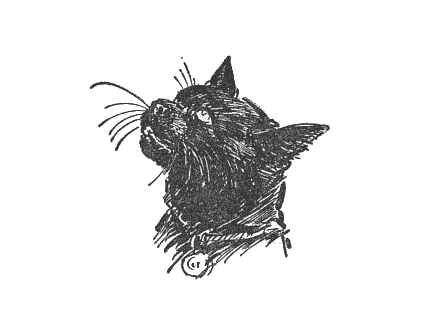
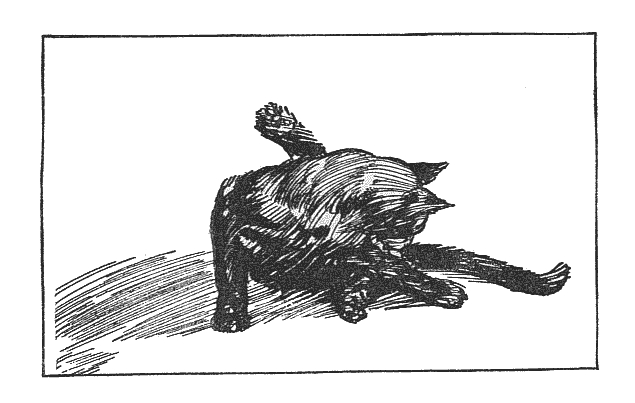
 uring the Kaiser’s war there were twenty-five
German air raids on London, “footling
little raids,” we should call them now,
though none of us thought so at the time.
The first by Zeppelin occurred at midnight and a young
artist neighbor awoke us to announce the fact. We had
a small walled garden then, and we joined him to sit on
the grass and listen to the bangs, accompanied by the
cat of the house—a gray striped warrior who was not a
sheltered cat, like the present holder of the office. Somebody
made tea.
uring the Kaiser’s war there were twenty-five
German air raids on London, “footling
little raids,” we should call them now,
though none of us thought so at the time.
The first by Zeppelin occurred at midnight and a young
artist neighbor awoke us to announce the fact. We had
a small walled garden then, and we joined him to sit on
the grass and listen to the bangs, accompanied by the
cat of the house—a gray striped warrior who was not a
sheltered cat, like the present holder of the office. Somebody
made tea.
Later when twenty-five enemy planes came over at mid-day we watched them with many wiser citizens from the street, not without admiration for the picture they made. But they bombed a school, and admiration turned to fury and disgust. People took cover after that. Maroons announced the coming of the enemy, but he was slow in those days and citizens had at least twenty minutes to seek a place of safety. If no other shelter offered you knocked at the nearest door and were hospitably admitted, to play a round of bridge perhaps or exchange experiences with your stranger hosts until the din of battle subsided.
There was no blackout at night in London and cars with an illuminated “Take Cover” ran round the streets to reinforce the warning. The “Raiders Past” was performed on bugles by cycling boy scouts.
“All Clear,” sang the bugles, in a tone of triumph, and soon you would hear late buses and taxis racing by, the drivers often distributing misinformation as they passed.
“Five of the blighters down in Trafalgar Square.”
“Waterloo Bridge smashed.”
They never were, of course. These were just the grandfathers of the rumors which go round the moment a bomb falls today.
Our warrior cat showed no perceptible fear of the din of gunfire and bombs in those days, yet some sixth sense informed him, we discovered. Up till then he had been an in-and-out door cat, who always expected to walk abroad when he so desired. One evening, having made his wishes known and had the hall door opened for him, he suddenly turned tail and raced back indoors. Thirty minutes later the raiders were over London, after which for the remainder of his life, well on into the years of peace, he never went into the outer world again, except to take the air on the leads above the bathroom, to which a convenient window gave access.
He had come through another window in the first place and taken possession. We were at dinner one night and looked up to see a wide tiger face with magnificent whiskers anxiously measuring the narrow space between sash and sill. Invited to enter he squeezed through the opening and ate ravenously whatever we would provide. Nobody claimed him, and he remained for good, moving with us in due course and finding his way about the new neighborhood with the greatest acumen.
A cat of character like the present incumbent, he was more free of speech and when we returned home after holidays would stand four square and meow his reproaches for five or ten minutes on end.
Recalling the good old warrior’s retreat from the milder bombing of long ago, we had many anxious consultations about the Penguin when the order to stand-by announced the almost certain coming of war. To make sure there was someone near at hand to bring him a swift and kindly death if necessary was all we could do. Would he be terrified? Should we? The question is one that cannot be answered until the hour strikes, but perhaps it must be always in the affirmative if we are honest with ourselves. Some are terrified at the moment, some before or afterwards. The bravest admit it frankly.
New signs had appeared in every street, directing the public to Air Raid Shelters, First Aid Posts, Trench Shelters, etc. Trailer pumps, piled with stout hoses and ladders, even fully equipped Mobile Medical Units, stood ready to move off at a moment’s notice, in their appointed areas; public hospitals were sending all movable patients to the country in order to make room for air raid casualties. The civil ambulance units were assembled, volunteers for this service having learned to drive by map through pitch dark streets, even in gas masks. A.R.P. posts had sprung up in all districts, and through them moved men and women wearing tin hats with civilian clothes, getting accustomed to the weight of the hats and the stares of their fellow citizens. Buildings were sandbagged, and hundreds of thousands of children were leaving daily for billets in the country.
The civil defense services were “settling in,” and arranging rotas of duty. Auxiliary police were out, to help the regular force.
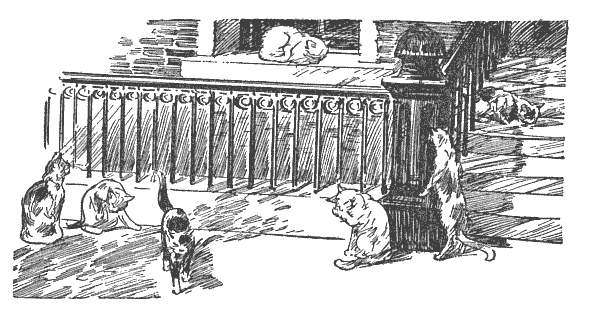
Such was civilian London on the eve of war, expecting attack, and awaiting the prearranged signal for action.
The balloons were up, and for long we had been accustomed to the hum of our planes overhead. (Once, and how sad in thought it is today, bomber squadrons from friendly France had filled the skies, sweeping down above the housetops in salute.)
All these preparations had been made freely by free people without compulsion of any kind, while the “clever Germans” acquired efficiency by the aid of the Gestapo, the spy, and the rubber truncheon. No one knocked at an English door to demand if there was a warden on the premises and if not why not, or to bully and coerce; and if we were less ready than appeared on the surface, let us still rejoice that we held fast to our own ways, instead of becoming cogs in an infernal machine. There arose everywhere, in the hours of imminent danger, an immense fund of kindness and energy and good will, and these things have endured and multiplied under disaster. They are not made to order.
One post I know of was in the wine cellar of an old Georgian house, and the assembled wardens found only a telephone to greet them. If every one grumbled, exercising this popular English right did not stop them from using their ingenuity. Emergency lighting was put in by one, tables and chairs were given by others, a gas ring appeared. Then a smiling stranger looked in and said: “Shall I come and run a little canteen for you until one is provided?” Volunteers flocked there daily to offer full or part time service; messenger boys signed on, if only for the grandeur of wearing a tin hat; citizens appeared to say that they would be in their cellars if the houses should be bombed above them. “So you will see that they dig us out quickly, won’t you?”
London waited, quiet but vigilant, that autumn of 1939 for the blows which did not fall upon her. Many children and households and firms had gone; there was less traffic in the streets and few idle people. We worked and even slept with ears alert for the sirens—strange memory of this strangest of wars.
Now though the blows have been many and hard, it is possible to sleep through bombs and gunfire, provided they are not directly overhead and to miss the sound of the sirens altogether. By day when heavy clouds sometimes permit a raider to slip through, Londoners take so little notice of the sirens that you frequently hear the question: “Has the ‘All Clear’ gone?” and the answer: “Was there a warning? I didn’t know. Look at the nearest policeman.” (If his gas mask is worn at the alert there has been a warning and the raiders have not yet passed.)
It isn’t merely, I think, the fact that life must go on and that human beings can adjust themselves to anything when they must. Spitfire and Hurricane again have given the ordinary citizen confidence. They began, those little fighters, very early in the war, bringing down the much advertised German might on our coasts, but the outer world took little notice or preferred to disbelieve it. They knew everything, they said loudly from time to time,
“Sitting safely on the fence
To watch the game without expense.
Very wise and bright and brisk,
Easy when you take no risk,
Easy when your girls and boys
Seek the safe familiar joys,
Not where death and terror wait
Watching early, watching late.”
If there are any know-alls left by now they must indeed be incurable, for never have prophets had such disastrous seasons.
As though to prove this point of the total unexpectedness of everything, Samuel Penguin has just created an uproar in the home, reverting to nature after a blameless and birdless life.
The gardener, coming off duty, brought with her in a cage Childe Harold to spend a day or two on the roof garden in the interests of his health. He is a young sparrow, rescued by a kindly hand (from one of the Penguin’s fraternity, I regret to say) and taken to the Animal Post. He could not fly and refused to touch the food they offered. He needed worms, said the bird expert, to increase his strength and permit him to continue his pilgrimage.
Young Harold chirruped noisily, and this so incensed the cat of the house that he flung off his languor and showed every intention of leaping on the singer. The cage was lifted to the table; he rose on two legs and hit it. When pushed sternly back he stood his ground, forelegs well apart and with all the airs of a mighty hunter.
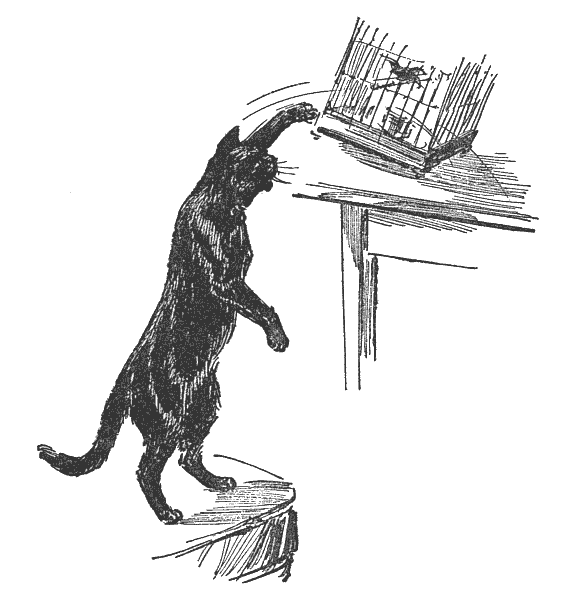
This is a sad come-down after a life of virtue, and he is not in the least repentant either. Harold, without his company, was removed to the garden, but whenever he enters the room he lifts his head, sniffs the air, and positively swaggers.
Up on the roof, meanwhile, the gardener dug for worms and soon produced two juicy specimens for the refugee. She had to spend some time overcoming his natural fears but at last he had dined and celebrated the fact by jumping on and off his perch. It was evident the little fellow was unhurt.
An hour later he had gone.
This would have been splendid had not his lamenting cries reached her from all directions.
We hunted among the chimneypots and across the whole roof in vain. Wherever we looked his voice reached us from another direction and we could see no sign of him.
Young Harold was calling up reinforcements and in time he got them. A neighbor saw the empty cage in the garden and the disconsolate infant screaming his head off on the ground. She called us up, but by then his rescue had begun. Somehow he had been piloted across the road to another roof top, where he sat waiting in the gutter. The mother bird was fussing round him and presently the father arrived. One on either side, with bobbings and argument, they seemed to be urging him to try again. Harold wept, but at last made the effort, only to drop like a stone to the balcony below.
Evidently we keep the best worms, for the little chap was not killed. Soon we saw him through the stone pillars peering out, fluttering and protesting as mother and father came backwards and forwards with sympathy and advice.
Childe Harold’s pilgrimage is now continuing, presumably, for all three have gone and we hope the elders have taken him home to bed.
Old books and newspapers picked up at random throw an amusing light on the fallibility of prophets. One I came across recently was dated a few years back in the mid-thirties and quoted from a pronouncement by an Irish-American. He spoke of “what I regard as the inevitable struggle for the freedom of the seas which must shortly come to pass between America and Britain.” Now this sounds all very solemn, until you begin to consider the facts, for why should any sane country struggle for something she already has, with another country which has no desire to take it away from her? The freedom of the seas is enjoyed by all who keep the laws of the sea, surely, and is not a kind of perquisite or trophy. The writer then went on to say that it would be immoral to “buttress the falling British Empire” and “intolerable to the liberty loving peoples of the world.”
At a moment when the very existence of these same peoples depends upon the valor and endurance of the “falling” Empire, his gems of thought seem worth preserving.
In truth, of course, in September 1939 when Hitler set out to enslave the world, every British country or island, large or small, far or near, went to war voluntarily and immediately in defense of liberty, which is more than anyone else can say (except poor France, who was, if we are to believe her present rulers, persuaded against her will).
The fact seems to have received little notice abroad, in the press of more exciting events. Or is it just that the world had fallen into the habit of regarding England as a kind of Universal Aunt, to be abused in times of peace and plenty, but expected when trouble comes to rush off in all directions (like Stephen Leacock’s horseman) in defense of everybody?
Under the Union Jack many diverse peoples pursue their own way of life, keep their own nationalities, customs, religion, and laws in freedom and security. This is the perennial answer to those who from time to time set envious eyes on the red places on the map and begin to parcel them out in anticipation. They are up against a force which does not diminish, but grows, and a freedom which is worth defending to the death. Freedom after all is only a word unless you are willing to die for it.
But perhaps, who knows, the poor man who wanted to go to war for the freedom of the seas, had merely been affronted like a friend of mine by the singing of “Rule Britannia.”
“Britannia rules the waves, indeed?” she exclaimed indignantly. “I never heard such boasting.”
She had, however, mistaken the refrain, which is an invocation and not a ghost of a boast.
“Rule Britannia,
Britannia rule the waves!
Britons never never never shall be slaves.”
Though it was written two centuries ago there is a verse significant to this hour, which runs:
“The nations not so blest as thee
Must in their turn to tyrants fall.”
The poet was wise. He recognized that land frontiers are the tyrant’s joy and opportunity, but the seas his nightmare. He was just warning us.
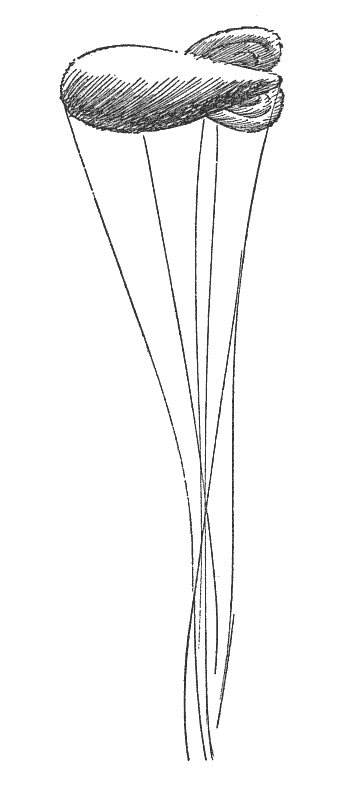
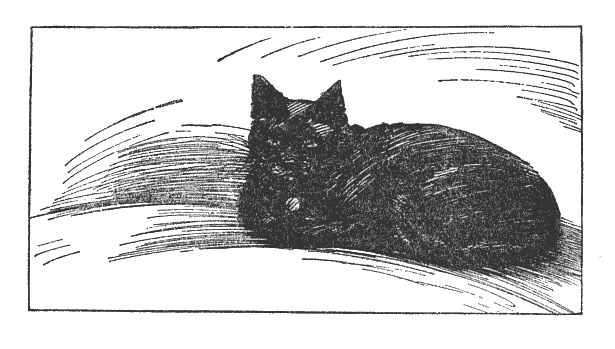
 amuel Penguin is of course an Imperial cat.
You may have guessed as much.
amuel Penguin is of course an Imperial cat.
You may have guessed as much.
He saw the gathering of the clans with his own eyes in the early months of the war, when young strangers from far afield passed in a steady stream along the road beneath his favorite window, sometimes staid, sometimes singing their own songs, or playing jokes on their English cousins who watched them with amused and curious eyes.
A lame man was grinding out the latest popular tune on a street piano one morning when a mixed group from the Leave Club sauntered up. A tall fellow lifted the player aside and continued the performance, while another took round his hat, dexterously catching the shower of pennies from neighboring windows which resulted. When the spoil was satisfactory, it was poured into the player’s cap, his piano restored to him, and the procession moved on.
And then there was the diverting picture of a solitary lad from beyond the seas offering his bottle of beer to a strutting pigeon and quite hurt when the bird remained firmly teetotal.
None of them with whom the cat of the house became personally acquainted went to such lengths with him, but some of them offered him chocolate cake at tea and the sugary portion of buns, which like a perfect host he accepted.
The cat, it seemed, was developing a sweet tooth, and now expects such refreshments occasionally. He likes currants too, but fortunately has not begun to demand other fruit. One of his long-ago predecessors used to go out and eat the apricots which fell from the trees in our Australian garden, and we also had a tomato addict in the family (who was deceived perhaps by the meaty color of the vegetable).
Sam grew more intimately acquainted during these months with two pretty girls from Australia who treated him from the first with proper attention, never forgetting his existence, like some. The cat preferred a settled world and now his old familiar friends rarely had a free moment to come and see him. It was true they inquired for him by telephone and one even wrote, addressing her letters to
“Sir Samuel Penguin, Bart.”
but he was no reader. Life was rather beset by people who rushed in and out, sometimes with dogs or leggy children, and never so much as looked at a cat.
Alison and Biddy were different. They appeared out of the blue and sat down in a civilized manner and shook him by the paw, with none of the frenzied haste which seemed so prevalent.
They had been on a visit to Europe and were supposed to have sailed for home on September 2nd, so we were surprised to see them.
“No, we didn’t sail,” said Alison. “We went along and joined the Civil Ambulance Brigade instead.”
“Having given away most of my winter clothes because we were going back to summer, I am rather done,” said Betty, “so do you mind if I knit?”
They are resourceful, the girls of Australia.
Samuel tucked in his toes with a luxurious sigh, recognizing the signs of a quiet hour or two in congenial company.
They were not in the least disturbed that it might be difficult to get money from abroad in war time and, having a pleasing sense of the ridiculous, gave us an amusing picture of their ambulance station.
The training was fairly stiff, for besides being good drivers they had to know their large district so intimately that the blackout would not impede them. They had to keep their cars in order and even scrub their quarters, turn and turn about, a task which had proved strangely difficult to some of the volunteers, who tried to do it standing, pecking at the floor with the scrubbing brush and soap in turn. These incompetents were not the more highly born among them, either, but the “betwixt and betweens.” The society of the station was diverse and to our young guests highly amusing.
There had been a practice emergency call-out before one of the Big Wigs, they told us, and everything possible had gone wrong. Cars refused to start, people lost their heads, in fact they had never had such a fiasco before. But the Big Wig was delighted.
“Splendid!” he cried, and congratulated all concerned on their speed and efficiency.
When the first Canadian troops were about to set sail for England, the German propaganda machine broadcast a warning to them that they would never reach these shores alive. When they did so without a single loss, they naturally brought with them a hearty respect for the British Navy which can hardly have been what Dr. Goebbels intended. In fact the wholehearted collaboration of that great Dominion and gallant little Newfoundland, both by geographical position more assailable by the Nazi lies than the more distant countries of the British Commonwealth, might have been counted a major defeat for the enemy in a fairminded world.
Goebbels immediately tried again. India would do nothing, and the Australians would stay at home, he said. As though at a signal Indian troops disembarked in France, and Australian airmen appeared in London.
“Oh, but the Germans are so clever. You do not know—you do not understand,” cried the charming foreign member of our working party in her excellent though stilted English, when the rest of us made fun of the Nazi lies. She wanted Hitler’s gang defeated and did not see that, by believing him invincible, she was helping his cause.
The Nazi intelligence service is still lauded to the skies and ours treated with withering scorn, yet two giant ships were finished, launched, and reached America before anyone knew of their existence, except the men who built and served them and held their tongues. A capacity for silence may in the end prove a better weapon than the lie rampant, though of course much less entertaining to the onlookers and hot-news vendors, who still try to argue that the cause of decency and civilization needs advertisement.
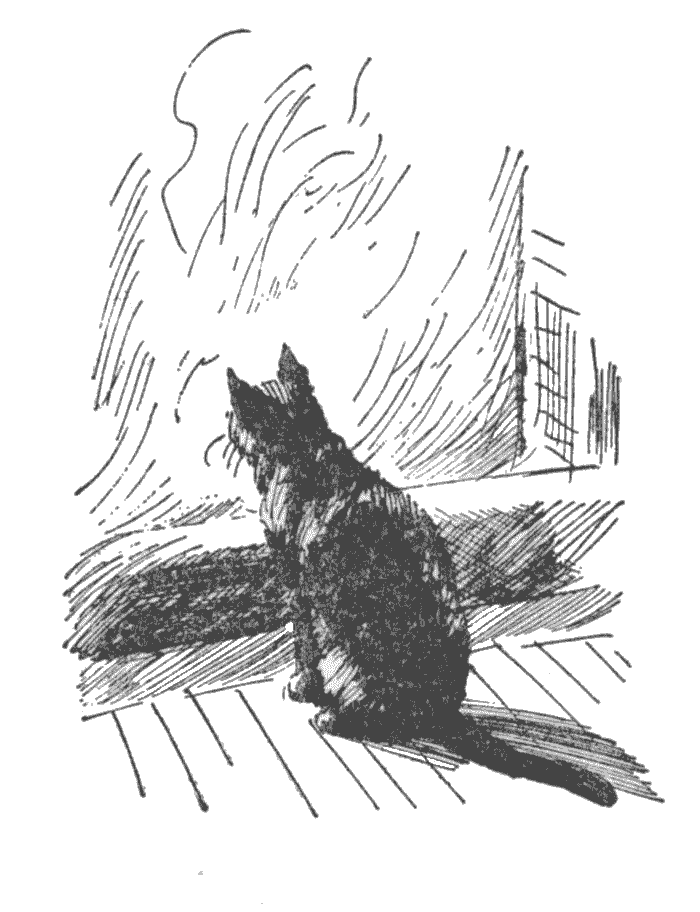
Samuel Penguin was soon sitting at the feet of these young soldiers from across the world. If he showed a predilection for the Australians it must be said in the interests of veracity that they came in lesser numbers at first and left him an easy chair to sit on. From this vantage point he would watch them with great affability, head turning as they moved, to catch the attractive flash of the firelight on their bright buttons. They were airmen come to join the Coastal Command and range over the Seas in the great Sunderland Flying Boats. Used to vast distances at home these gray-eyed men have good sight for this important work, I believe. Their bright darkish blue uniforms were strange to London. Very smart they looked too; and they told us with glee that people in the streets took them for foreigners and made audible comments, believing they wouldn’t know the language.
The Coastal Command is an exacting service without the popular appeal of the bombers and fighters, yet what stories there must be to tell of it. Every day these great flying boats are out across the oceans, for ten hours or more on end, guarding or meeting convoys, hunting raiders and submarines, keeping an eye on the ships that come and go, bringing swift help to the shipwrecked. More than once a Sunderland has come down in the Atlantic to pick up a drifting boatload of U-Boat victims, forty or fifty in number; when that is impossible they drop food and cigarettes and stand by until a rescue ship is at hand. It was one of these which discovered the boatload of children who had been drifting for days after being torpedoed on their way to Canada and the United States. To incoming ships they are the first sight of England and home, and it is from men of the sea that you mostly hear of them.
The R.A.F. is such a silent service that even if you have a pilot in the family you are no wiser than the general public; so I am told by the families in question.
“What have you been doing, Jack?”
“Oh, just snooping about.”
“Where?”
“Here, there, and everywhere.”
“What kind of plane are you flying now?”
“Various kinds.”
“Wretched little oyster! What do you take me for, a fifth columnist?” etc. etc.
All the information we acquired from our young guests of the Coastal Command was that yes, they had done a bit of flying in the Arctic, and down to the Mediterranean on a job of work; and yes, they rather thought they had potted a U-Boat out in the Atlantic. But mostly it was just routine. There was a galley on the ship and the cook knocked up quite good meals for them.
The Canadians were soon familiar figures everywhere; the Australians and New Zealanders arrived here in numbers later, just after the collapse of France, the former leaping ashore with bands playing, the latter more sedately. The difference between these two neighboring British communities in the Pacific is amusing.
The “Aussies,” as England called them in the last war, in their familiar turned-up hats, are keen, lean, unembarrassed, disrespectful young men, never at a loss for an answer, highspirited, independent, full of initiative, and great practical jokers. They are well turned out and well paid by their country as soldiers go, and spend lavishly.
The New Zealanders are serious and full of patriotic zeal, both for Britain and their own Dominion, which naturally in their estimation is far superior to any other. This attitude is shared by the Maori battalions, a fine-looking brownskinned race who live in complete equality with their British brothers, sit in Parliament and yet preserve their own language and customs.
One of these men went into a local shop one morning and a customer said to him with a smile:
“Well, are we going to win the war?”
“Certainly,” said the Maori soldier, much shocked. “In my country we are not encouraged to ask such a question. It is taken for granted.”
An Australian, on the other hand, would have answered grinning, “You bet!” his favorite way of expressing a certainty.
The New Zealanders wear a flat-brimmed hat.
One of them tells how he was pursued by two small Londoners with cries of “Cow-boy!” He stopped to explain their mistake and said he came from the Dominion of New Zealand. This silenced them, but not for long. In a moment they were after him again, to inquire anxiously:
“Hi, Mister, are you on our side?”
That was a facer for so ardent a patriot.
“Pity we can’t tow it home with us when we go,” remarked one of the Australians after a fine summer in England’s green and pleasant land.
But soon most of these men from the South were away to join their brothers in the Middle East, to endure the sandstorms and great victories in Libya; the snows of gallant Greece, and the horrors of the campaign in Crete. Some, alas, will never go home.
And Mussolini, who for years has sat in Rome weaving plans like a fat spider to annex the British Empire, has lost over 370,000 prisoners, innumerable dead, great spoil and most of his African colonies to a force vastly outnumbered and outgunned. Samuel Penguin, being an Imperially minded cat, naturally rejoices that Australians, New Zealanders, South Africans, Indians, and Rhodesians were privileged to assist in these successful operations.
“That should teach him whose Empire is dead or alive,” he says.
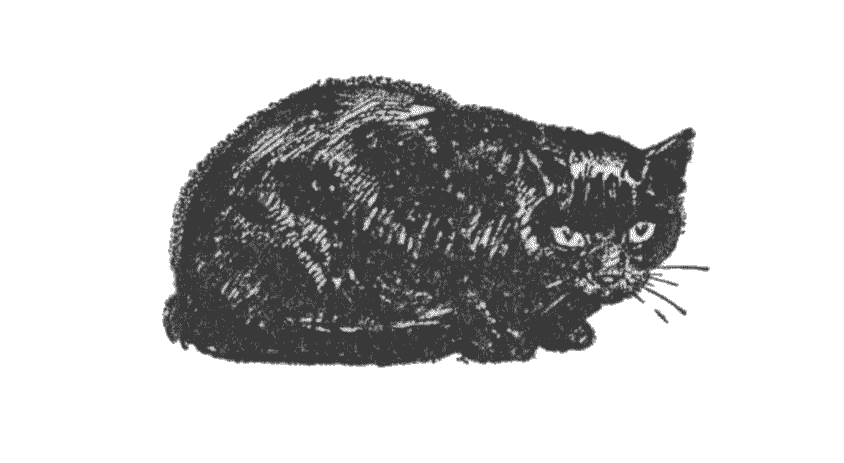
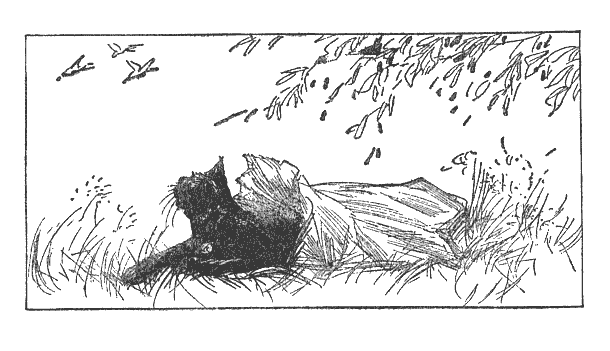
 rom being a purely Imperial City London
that summer became almost the capital of
Europe in miniature and the temporary home
of many Governments, Kings, Princes, and a
Queen, whose peaceful and ancient lands the common
enemy had ruthlessly overrun.
rom being a purely Imperial City London
that summer became almost the capital of
Europe in miniature and the temporary home
of many Governments, Kings, Princes, and a
Queen, whose peaceful and ancient lands the common
enemy had ruthlessly overrun.
Slowly, painfully, and by devious and dangerous ways came Norwegians, Dutch, Belgians, Free Frenchmen, Poles, and Czechs to continue the fight. The streets were filled with strange uniforms and unfamiliar tongues, but only a few of the perils which men and women faced in that exodus have yet been told. The British Navy and Merchant Marine brought many safe to port; some came in their own gallant ships; many set out in any little boats they could seize, trusting to be picked up halfway, or even to row to England; some landed by planes, taken at great hazard. Even lads from the naval and military colleges in France crossed their country on foot at night and are now continuing their training under their own officers in this island.
One afternoon the cat of the house met two strangers from France who came in to rest for an hour while awaiting the return home of some friends in the neighborhood. They had been many weeks on the way, and one had left behind him a young wife and a child he had not yet seen. He could not even tell whether they were alive and safe or how he would be able to get in touch with them if they were, for his country had been betrayed by evil men who were to set Frenchmen fighting against Frenchmen in the interest of the German hordes which had assailed her for the third time in seventy years.
They had already, against the most solemn pact, seized our merchant ships in their harbors and released to fight against us again hundreds of German pilots brought down by the Royal Air Force in defense of France; they were hurrying their agents abroad to whisper slanders against us who had not failed, to hide their own failures, as later they were to send food into Germany to persuade sentimental neutrals that France was being starved by the British blockade.
But the two young men, sinking into comfortable chairs for the first time for many dreadful weeks, and apologizing so unnecessarily for the state of their clothes, all they had been able to bring away with them, belonged not to that contemptible company, but to the France we knew. It was long since they had had any communications with their families; they knew that they might never see them again; and it came home to us that this was what exile meant to thousands of these strangers in our midst.
They had not come here to an island of safety, though it might seem that for a little while, but to the last outpost of the fight for freedom, to support us and play their part.
Our involuntary guests, a few weeks later, were in the uniform of Free France under the Cross of Lorraine.
Britain, most of her equipment lost through the treachery of her late ally, had to re-equip not only her own forces but those of her friends, while hastily assembling defenses against an enemy now threatening her from the tip of Norway down to Spain.
When people ask, as they do even now occasionally, for Britain’s war aims, it always seems to me that they are trailing a fine red herring across scenes of horror in which they know well Britain had no part.
Let them ask the people of Holland who mourn the fine old city of Rotterdam and are faithful to their Royal House; the people of Norway whose kindly King was pursued across his own territories by German bombers; the friends of the murdered Czechs; the people of Belgrade; the Belgians suffering for the second time in twenty-five years at the same brutal hands; the matchless heroes of Greece; the people of Luxembourg and Denmark and now Russia; above all, let them ask the Poles, slain in their millions, the people of Warsaw, the men of Gdynia, whose wives and children were turned out of their homes to walk till they perished in the winter cold, without food, shelter or transport; while Baltic Germans took their stolen homes, to gloat over the stocked larders, carpets, furniture, the nurseries, the children’s toys, and clothes.
The world knows these infamies and many worse which the Nazis have committed. The aim of civilized peoples can only be to stop them for good and all. Let us hope that wherever they have occurred, wherever the innocent have been wantonly struck down or the treasures of the past wantonly destroyed, we shall one day inscribe three words.
“Lest We Forget.”
It is an insurance all who now suffer and fight have a right to demand for their children.
While Hitler was erecting stands for a Victory March in Berlin that summer there had swum into Samuel Penguin’s ken the girl who walked down the road each morning to feed the pigeon parliament. Fittingly, she was to organize the First Aid Post for Animals already mentioned so often in these memoirs; for she and her half dozen volunteer guards had already registered, in a house-to-house canvass, the household pets of the district.
Prince Samuel wore his white Narpac disc with the rest of his orders and decorations. It was pleasingly becoming to a dark fur cat, about the size of a half crown and made of some substance light enough to hang on a narrow elastic for creatures of a lower order unaccustomed to collars. This is a democratic war.
All the Animal Societies had joined forces to protect their clients as far as possible from the perils of the conflict, but the Narpac disc has its use in peace as well, for every wearer has his registered number and can, if found straying, be quickly returned to his rightful family.
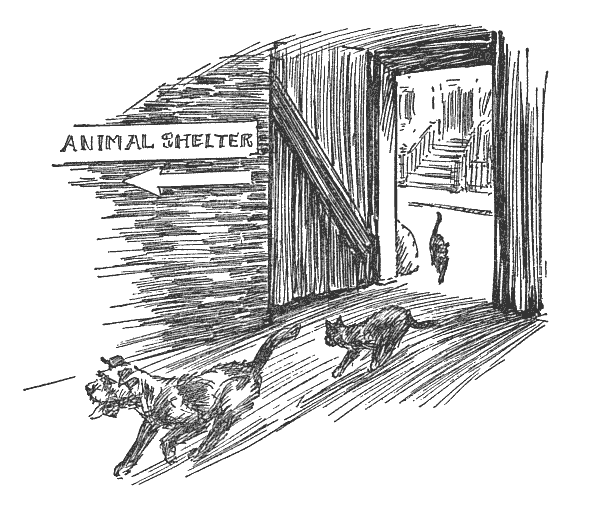
The Post was acquired and equipped mainly by the gentle art of persuasion. A property owner was approached to lend the premises rent free; the Borough agreed to forget the little matter of rates, and the pigeon’s friend remarked to this one and that:
“I suppose you don’t know where we can get a table, do you, or a chair? It’s wonderful what can be found in box-rooms if people will only look.”
The hint was taken. Tables, chairs, cupboards, linoleum, cat and dog baskets, collars, leads, drinking bowls, and cages poured in. Veterinary experts gave selected guards a course in first aid, electric fires were installed and even beds made out of large cardboard boxes, set one end in another to provide a draught-proof canopy or hood.
The Victory stands in Berlin had to be taken quietly down again, but the Animal First Aid Posts of Britain opened their doors.
A year ago today the German wireless announced that preparations were well advanced for the final assault upon and conquest of England. The B.B.C. has just mentioned the fact without comment in its afternoon broadcast to the continent of Europe. A pity they did not add that in Hyde Park this summer afternoon there is a carpet of pansies like butterflies on the grass; and that even down in the heavily raided dock areas, the roses are in bloom. It might cheer our exiles.
Even the roof garden is gay with flowers among the beans, tomatoes, lettuces, turnips and carrots; and the little urns inside the gate are filled with a charming greenery not easy to associate with a vulgar vegetable.
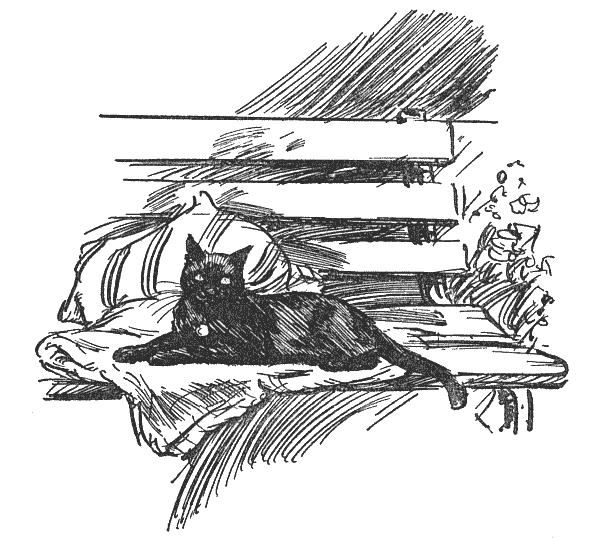
Another tenant has begun a rival garden, but the only dissension which this has caused is of a topical kind.
“Haven’t you done the First Aid Course?” I hear the gardener inquiring sternly on the telephone. “There’s a dying rose in your garden and turnips fainting in all directions. You have been warned.” She is rather like a superintendent of parks and inspects the other estate morning and evening to see if the corners have been left too dry.
Samuel Penguin meanwhile lies in a brown paper bag on his “lawn” to protect his person from the damp, the wind and the sun. He no longer cares for extremes of climate, but he sniffs the birdy air luxuriously and turns his golden eyes from time to time to where
“Afloat upon ethereal tides
St. Paul’s above the City rides.”
John Davidson’s lines would seem too flattering to our view—only the cross on the dome above a roof top—were it not for the many misty mornings after a night of raids when we have looked for it, fearful that it might, like so much else of beauty, have been struck down.
Often the intervening roof alone was visible, and then when our hopes were nearly gone, ghostly and reassuring it was there, the topmost pinnacle of Wren’s Cathedral.
In the last war I remember weeping violently because the German vandals had destroyed the Cathedral of Rheims, but there are no tears deep enough for the treasures of London shattered and broken.
Young Ireland, even after three and a half years in London, still has her difficulties with the language. She finds it hard to believe that the wife of a duke is not a duke-ess, which after all is reasonable, but her real difficulties arise with the boy friends. This we learned from overhearing the loving salutation of the milkman.
“Him and his dears,” she said scornfully.
But it seems prevalent. To the strange lads who try to become acquainted she retorts that she is just off to meet her husband, which successfully disposes of them. The others call her dear and darling, to which she says firmly she is not accustomed. The climax came however when a Yorkshire soldier, as heartfree in the matter as she, said “Where shall we go, luv?”
“I’m not your love,” said the girl fiercely, to his utter confusion. She did not know the word was just a Yorkshire expression.
They write to her from camp, these boys, and she makes them socks and sends them cigarettes, until they grow sentimental. Yesterday one on leave said to her gloomily:
“Now you are joining the Air Force, I suppose you’ll go and marry a sergeant-pilot.”
“I’ll not be marrying anyone,” said she. “Do you think I want to get old before my time?”
To which the poor lad, seeing perhaps a hope, rather than a quick-witted retreat from a dangerous subject, said eagerly:
“That’s right. Don’t you.”
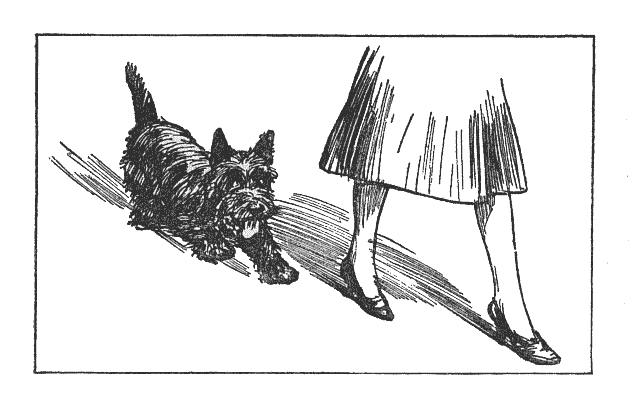
 he Battle of Britain is now history. At last
there was something which neither propaganda
nor incredulity could deny, for German
airplanes in their thousands fell, not
into the sea this time or on foreign soil but on English
earth where neutral journalists and American observers
were there to see.
he Battle of Britain is now history. At last
there was something which neither propaganda
nor incredulity could deny, for German
airplanes in their thousands fell, not
into the sea this time or on foreign soil but on English
earth where neutral journalists and American observers
were there to see.
On August 15th, instead of a triumphal march through London, Hitler lost one hundred and eighty planes against thirty-four Spitfires and Hurricanes, half the pilots of which were saved. He advanced his march to September 15th, and that day one hundred and eighty-five of his pirate planes were shot down, while we lost twenty-five fighters, fourteen pilots safe. Daily for two months though the numbers varied, the proportion was much the same, and Londoners would rush out from hour to hour to read the totals chalked on the news sellers’ boards.
“Latest score: 33 for 1”
or
“Day’s Finals: 153 for 22.
Hurricane stops Play.”
When a German fighter plane fell in a London street our foreign friend arrived at the work party with a glowing face. A young auxiliary policeman, in the excitement of the moment, had grabbed her by the arm, shouting:
“Look at that, look quickly! Don’t miss it.”
The pilot, hooked by his parachute to a building, was presently rescued and marched away through the city he had hoped to destroy. She had seen it all.
Thousands must have passed through London by now, sullen looking, dull, nearly all molded to a pattern. How rarely in the photographs do you see an intelligent face among them, yet these robots impressed the world which thought our young men soft, which shows no doubt what bluff and bluster will do.
It was about this time by the way that the Germans published a faked photograph of a British Squadron, said to have been captured in France. All the men had large hooked noses and protruding teeth, but the faking was quickly exposed. It had been badly done.
Some of Mussolini’s pet fascists joined the German hordes on one occasion but were shot down with such speed that the survivors fled back to their base in Belgium. One plane brought down on land provided some comic relief, for it was found to contain tin hats, bayonets, a large cheese, and some bottles of Chianti. The food was strange enough for men only a few moments’ distance from their airdrome. As to what the young braves meant to do with the ironmongery, no one could imagine—defy the whole population of these islands perhaps. After all, they had been taught to believe we should be easy game.
The daylight raids over London were not often near us, though we watched the fantastic patterns from their exhausts as the fighters chased them high up in space almost beyond human vision; but one day during heavy clouds, a bomb fell with a resounding swish so close that we thought it was coming through the windows. A top floor is not the best place on such occasions, and we marshaled the household downstairs in some haste. Samuel Penguin, marching ahead out of the lift with an air of pleasure, accosted a soldier passing the entrance door. The lad stooped down to rub him under the chin with a knowing finger and ask the sport in mice.
“Hadn’t you better take cover till the raiders pass?”
He looked up at the sky.
“Oh, that?” he said grinning. “No thanks. I’m off ice-skating—my last day of leave.”
London in ruins. Panicstricken people rush screaming in all directions was one of Goebbels’ gems just then.
German intelligence was not conspicuous when the Luftwaffe attacked the East End of London, certain of creating panic. The effort failed miserably for those stouthearted Londoners were simply filled with fury. It was unthinkable that the West End should fall below their standard of courage and obvious that no other city would be behind the capital in resolution. The Germans are bad psychologists. Even Scotland and the North, usually a little scornful of the softer South, paid tribute to London’s resistance. Indeed one friend of ours, moved to Scotland on business and having to apply for a new ration book, was treated as an out and out hero when it was discovered that his original book had been bombed. They waved back other applicants, brought him a chair, surrounded him with sympathy and—a grand gesture—refused to charge the customary shilling.
The East End people often refused pointblank to be moved away to safer areas, and many stories about them were current.
One old woman, her house in ruins, seized a broom and began to sweep up the broken glass from the road.
“Wait a bit, Mister, there’ll be horses coming along here,” she said to the warden waiting to take her to shelter.
Little shops destroyed reopened on the footpath or in the ruins and vied with each other in cockney humor.
“Don’t worry about this. You
should see our branch in Berlin.”
or in a windowless aperture
“We have no longer any pane;”
“More open than usual.”
or grandly:
“This establishment will remain
open during alterations to
the Map of Europe.”
The lighter side of an air raid is easy to remember on a sunny day after a restful night. The experience, however, does not grow less horrible with familiarity, rather the reverse.
When the night bombing began it was a temptation to watch the flashing skies from our high windows, but a folly, and we soon moved to friends on a lower floor, accompanied of course by Sam, his basket, and his friend, and presently lower still, both households together.
Sounds at night are very difficult to locate; the drone of engines thundered, it often seemed, directly overhead, the rush of bombs shook the building, so that we argued as to whether neighbors north, south, east or west had been hit.
And then at dawn, hurrying to the roof, expecting to see signs of dreadful devastation, we would find London still there, rising out of the morning mists, and our neighbors intact.
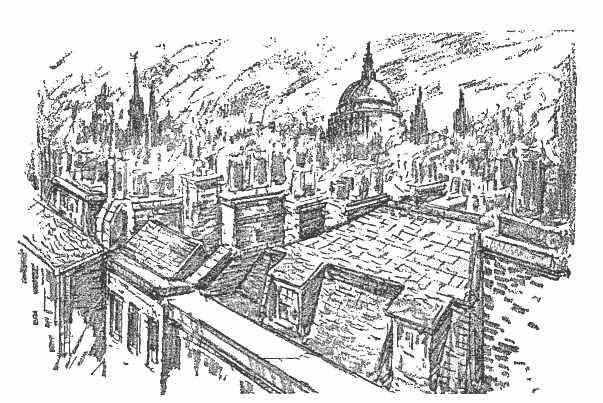
Samuel Penguin, to our great relief, sat calm, slept well, and daily insisted on his usual expeditions to the garden. Even when quite suddenly the night was rent by a din louder than ever we had heard before, the barking of greater guns, he did not raise his head. What a heartening roar that was to listening London! Next morning the postman was beaming from ear to ear.
“Everybody’s happy today, Madam,” he said. “Did you hear ’em? We’re getting our own back.”
And then a bomb fell on us. We all six heard it; we heard the building falling down, the smash of glass and plaster. We gathered ourselves up, including Sam, who yawned in astonishment, opened the flat door and emerged on the landing. Not a sound anywhere; everything exactly as usual. The victims were in fact a quarter of a mile away, and it was merely a certain amount of blast which had broken a window or so in our vicinity.
That was bad enough, however. There were doors shattered and a perfect shower of glass in the area in question and the small newsagent’s shop, so rumor said, was “down.” Nevertheless our morning papers arrived as usual, and this was to be characteristic. Throughout the months, whatever happened, the tradesmen called and life went on. No doubt it was in appreciation of the fact that one of our neighbors began to provide a morning cup of tea for the milkman, the grocer, and all the rest. She has continued the kindly custom ever since.
The little shop was not “down,” though so much damaged that it seemed at first glance unlikely to be habitable again. Later in the morning we found the good citizen who owns it busy, with her assistants, trying to reduce the chaos.
“I’ve lived here for fifty-two years,” she confessed with a smile as we offered sympathy. “I shan’t leave if I can help it.”
She is still there at this moment, carrying on, though inevitably some of her customers will never come in again.
The Blitzkrieg was on and the Animal Post had opened its doors. Cats, dogs, canaries, parrots, budgerigars, many from little battered homes in crowded streets, found refuge there. Sometimes their owners brought them, sometimes the wardens reported creatures seen in the wreckage and the rescue guards went along to lure them out. Few at first were outwardly injured but like their human brothers they can suffer from shock, and they needed care and kindness.
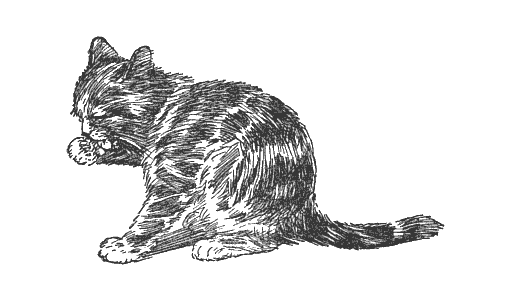
One cat was rescued after sitting for fifteen days on the parapet of his burnt-out home. His ears were singed and he was for weeks so nervous that he would climb to the mantelpiece or any available shelf to be alone. He had lost his family but in time, cured and well, he would lie happily basking in the window, toes curled luxuriously to the warm sunlight, and not in the least disturbed by his fellow inmates.
There must have been some people no doubt who, in their own tragic extremity, forgot their stricken animals, but generally even the most humble showed the greatest devotion to them and did not rest until they were in safe hands.
“My house was bombed, miss, and my two cats are in there.”
“You mean you’ve lost everything?”
“Oh, yes, but it’s not that. It’s my poor cats. Would the lady get them out? They won’t let me by, you see, the wardens won’t.”
The lady, a slender little guard in closefitting suit and hood, could do wonders and did. Both animals spent weeks at the post, regularly visited by their owner, who paid cheerfully a small fee for their food. She was never heard to mention her loss.
The district is a large one, and many animals come from fairly far afield, so that always after a bad night the guards were out at daylight, ready to take in these poor refugees. The milkman and the cats’ butcher (who delivers by perambulator) called daily, and rations for the inmates were soon increased by contributions from many households.
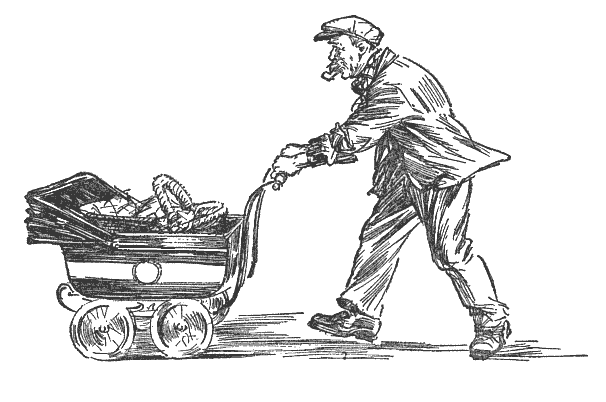
If co-operation had been general from the beginning of the war, it became phenomenal as soon as bombing began. Neighbors, who had for years vaguely known each other by sight, assumed identities, had names, became alive, and were ready for any friendly service.
The Animal Post, barely noticed before, aroused great interest as soon as its doors were open, and passersby would pause, read the notices, and nearly always walk in to offer a contribution.
Some who looked as if they could ill afford it would return weeks later to say casually:
“I’ve been putting a bit by for you regularly.”
Smartly dressed women and even men would be seen carrying bowls of bones, fish, or stew along the street, and sometimes when the rescue guards were at work in some devastated little street, coins would be thrown down from upper windows by those whose pets still had a warm fireside and a roof over their heads.
“Hey, Mrs., will you buy something for the animals?”
The inmates had their different rooms upstairs, furnished with beds and roomy cages, and every night before blackout and after their supper they were removed to the basement, where the din of battle would not distress them so much.
All through the winter months their quarters were warmed by a protected electric fire, and the cats in particular were happy then, their individual beds piled high about the cheerful blaze. Even the saddest threw off their lethargy, rolled on their backs, purred a little, or thrust out a furry arm for notice at sight of a visitor.
Some were the sole survivors of a family, and these were found new homes or, if it seemed kinder, put to sleep. Many were eagerly claimed by their friends released from hospital and there were touching reunions; others simply awaited new quarters and were faithfully visited throughout their exile.
This post of course represents only a fragment of the magnificent work being done for animals, often at great risk, in Britain’s bombed cities. Nevertheless the pigeon’s friend has already been decorated by one of the Societies for its excellent services, and we often hear unsolicited tributes to it.
The guards, in their white overalls for indoor work or wearing merely an armlet with civilian dress out of doors, have no exact official position in Civil Defense but all the services accept them and help them.
“They are a grand lot,” said the Air Raid Warden.
“Do you happen to know if that Animal Post is still all right?” asked a policeman on a distant beat.
And the nonchalant young woman coming off duty after a night of peril with a mobile canteen put her head in the door as she passed, to remark:
“Pretty good work you are doing!”
“I slept in my bed,” retorted the Keeper of the Post. “Do you have a sense of proportion.”
The truth is we are a nation of animal lovers, and probably all these people had some creature of their own endangered.
The nonchalant one has her twin brother’s Scottie to think of, for Tim is a fighter pilot in the Middle East and will skin her alive, she says, if anything happens to McTavish before he has slain all the Huns and I’tys in sight and wangled a spot of leave. She sent Mac to board in the country when the Blitz began and visits him when she can snatch a day, but that’s not too good, either.
And so the brusque retort of the Keeper of the Post comes into perspective, as the only kind of sympathy it is possible to give to one who would accept no other but has her own anxieties.
A workman engaged on demolition in a damaged street has brought in a gray kitten to the Post. It had been there for many days, frightened and starving, he explained. He had tried to feed it, but what with rations and going to work before the shops were open and the little creature’s terror, it had not been possible. His landlady, consulted, had refused to have it in the house, but he couldn’t see it left there, day after day.
“You couldn’t keep it for me till next month I suppose?” he said. “I’m going to be married and I’d like to give it to my young lady.”
So there sits the new inmate awaiting the future. In spite of nerves it was able to purr after a saucer of milk and soon, like so many of its predecessors, will be dancing about the room no doubt, punching the paper ball which hangs from the door-handle, and hitting out at its elders and betters. Someone should find it a white satin bow and a sprig of orange blossom, and fatten it up and brush its fur suit, for the occasion, as a tribute to a kindly rescue.
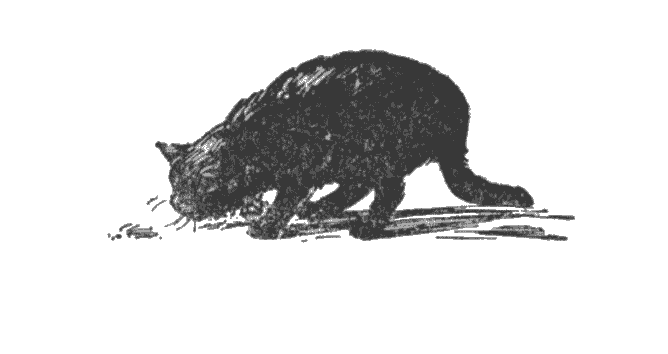
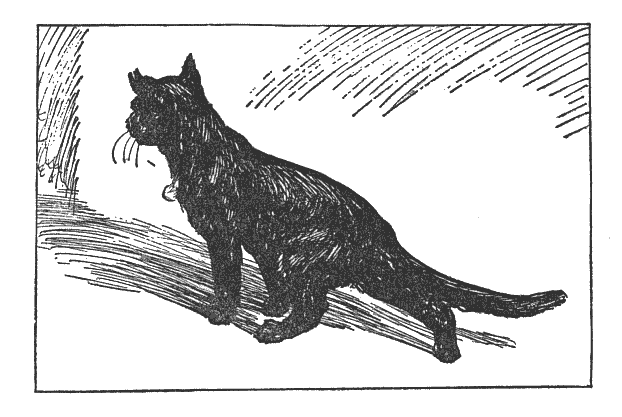
 ondon awoke to find itself famous in a new
fashion because it had withstood the onslaught
without panic, and the cities of
Britain, one by one, followed suit.
ondon awoke to find itself famous in a new
fashion because it had withstood the onslaught
without panic, and the cities of
Britain, one by one, followed suit.
It was gratifying but rather strange. No individual could have sworn in advance how he would take it, yet surely as a whole anything else would have been out of character.
Had none of our friends abroad ever seen this country in hours of crisis or moments of celebration? Had they never been present when millions of citizens united in grief or joy, crammed the streets for miles from early dawn or the night before, goodhumored, orderly, and law-abiding? Or watched the queues, whether for theaters or gas masks; or the processions of unemployed during the great depression?
Whether it be the Gulf Stream which has given them so kindly a climate without harsh extremes, or the slow march of history which has taught them the value of compromise and toleration, these are a people, I have often thought, with minds as quiet as their own green fields and lovely lanes. Maddening at times to people of younger countries and at first meeting rather slow on the uptake; in fact, like everyone else, with the defects of their qualities.
The men of all classes and ages who manned the thousand little boats and ships at Dunkirk were some of them; the men who had been sailing the Channel and the oceans and sweeping the mines and risking their lives every day and hour since war began were others; not disciplined men of war, but ordinary citizens. It sometimes seemed that mere civilians were receiving more praise than their due.
This sort of courage or resolution is not conscious, of course, but instinctive, and no doubt it was more important than it seemed, for men on active service about the world, risking so much themselves, found comfort in the fact that the people at home had not failed them.
As for the kindness and generosity it brought, in fabulous gifts not merely from all over the Empire but from the length and breadth of America, these were such a message of good will as surely no war hitherto has seen.
When Buckingham Palace was bombed, and the people in the East End could say proudly to the King and Queen, moving among their devastated little homes: “You have suffered too, just like us,” a native workman somewhere in the Middle East contributed his week’s wages “for some concrete to mend the King’s House.” There were countless such picturesque offerings, great and small, but many too sent privately to individuals in the same cause; checks to be spent where the need was greatest and meaning perhaps extra cigarettes for a balloon barrage crew; or an emergency outfit for some one bombed out overnight and needing clothes to go to work in the morning.
Many had to leave their homes temporarily and on the instant because there were time bombs in the vicinity, an alarming dilemma if you happen to be unprepared for it. Wardens took them to rest centers, where the strangest assembly later met for a hot breakfast, wearing whatever they had been able to seize as they rushed away. Siren suits quickly appeared, a kind of one-piece pajama, made of tweed, velveteen, or other warm material, and most people went to bed with a small hand case already packed, but for those too poor to spare money for extras, the rest centers provided, until compensation could be obtained.
“Why don’t you go away from London?” anxious friends in the country and abroad were writing to the citizens under fire.
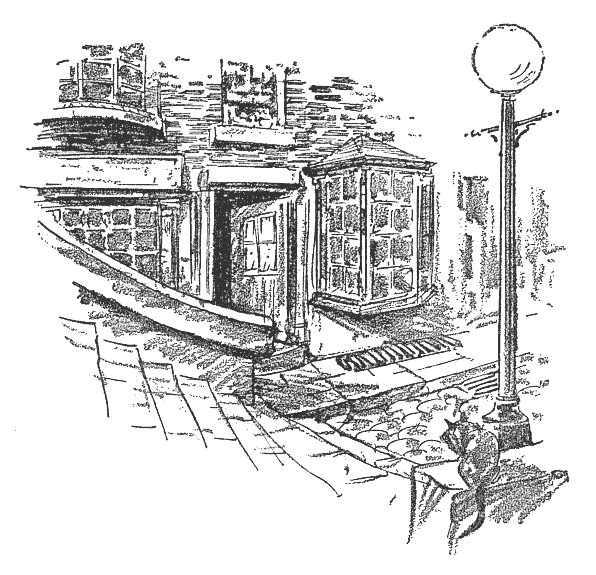
But wasn’t that exactly what the enemy desired and what had brought the downfall of once peaceful and happy states?
A story was told of an old woman living somewhere on the East Coast in view of the sea. There was talk of evacuating certain parts of the area and she was most upset about it.
“What, move for Hitler? If I have my way I’ll stay and see his Nazis flung back into the sea,” she said.
Much the same spirit animated many Londoners.
“As long as I live to see those murderers beaten I don’t mind,” said a girl one evening as the bombs were falling. And a fat old Cockney woman, surveying the length of Oxford Street next morning from the top of a bus, remarked with satisfaction to the world at large: “Oh, well, it’ll take ’im all ’is time to knock old London down.”
The frailest people of one’s acquaintance always proved staunch; only the sick or the selfish went away.
Those months, looking back, seem strange and hardly believable on a summer’s day, after a quiet night. At first wild rumors flew about. This place or the other was “flat” or “down.” Such and such a street was wiped out and spread with butter and eggs. All the inhabitants were dead; streams of ambulances had been seen leaving the spot, and so on and so forth.
In the sober light of day, however, the street in question would be seen serenely standing, except for a crack across the dairy window; the “flat” or “down” buildings would be open and doing business and the ambulance station report that no calls had been received last night. The Jeremiahs were no longer believed, though there were always some ready to announce where a bomb had fallen almost before it reached the target. The discovery that casualties were posted up daily in every district soon silenced the sensation mongers on that point.
Yet the most surprising remembrance of all is that of the real horrors and tragedies which were happening every night, so little was ever said. In our experience, the people in the midst of them did not talk or make a fuss, and that reticence was merciful.
One elderly lady whose doors and windows were shattered met anxious inquirers with the remark: “Isn’t this a wonderful time to be alive?”
Most of us felt the fact at least if not the time astonishing each morning and we began to wonder if we, like Samuel Penguin and his brothers, had nine lives.
Sam’s friend Miss Dee came in one afternoon after a long absence, to see if all was well with us. The cat of the house, curled in an easy chair asleep, awoke at the sound of her voice, cocked an ear, then stretched his head round the arm of the chair to see the visitor.
“He knows me. He has not forgotten,” she cried in delight, and Samuel actually smiled.
“A ridiculous question,” his expression implied. “You ought to know me better. Remember? I remember everything in the world.”
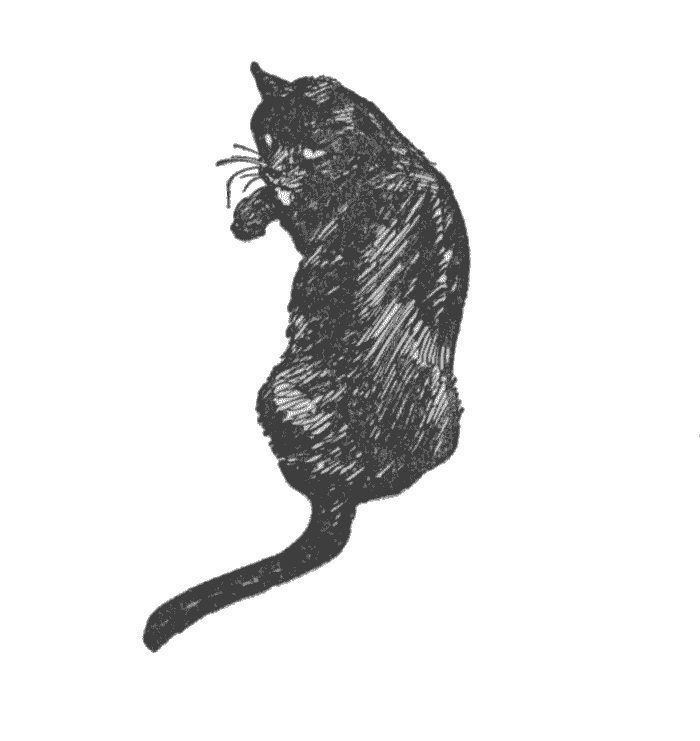
On the way here she had passed the house of some elderly acquaintances. It had been damaged by a bomb and the old gentleman was just coming out the door.
“Oh, dear, is your sister all right?” exclaimed Miss Dee in sympathetic distress.
“Why, yes, thank you, Miss Dee. But go in and see her. She will be pleased.”
The old lady was discovered indoors amidst the devastation. A small bomb had wrecked the bathroom, blowing out doors and windows. All her cherished ornaments, pictures, china, and furniture, were in disorder and strewn with dust and rubble. One might have expected her to be prostrate, but not at all. She was simply furious.
“Just look at it,” she cried to Miss Dee. “Why, it will take me six months to get straight.”
Miss Dee, no longer young and so frail a breath of wind might blow her away, recited the story in her quiet, unemotional voice, sitting very upright, and not at all aware that she herself was distinctly surprising.
She had been brought up by a heavy Victorian papa who would have been horrified to see any female of his family sit in an “easy chair.” You can imagine the old tyrant, gold watch chain and all, keeping the solid comforts for himself by the simple expedient of inventing moral axioms and of course failing to have her trained for any calling or remembering to leave her a sufficient competence.
And so Miss Dee “did what she could” to supplement her tiny income, going to church regularly on Sundays and taking a class in Sunday School. There were the old ladies in their vast house in Regent’s Park which modern servants found so difficult. They could depend on Miss Dee to come in and superintend if necessary and see that things were just so. Before every meal a can of hot water had to be carried up to each bedroom and placed in the basin on the washstand, with a fresh damask towel neatly laid on top of it. For some mysterious reason which the old ladies could not fathom, new maids strongly objected to this ritual and had even been known to suggest the use of the bathroom if people must wash their hands every half hour. In their various good works too Miss Dee was invaluable, so trustworthy and discreet, and when they went away for the summer, she would see to the proper shrouding of the furniture and dispersal of moth balls.
It is probable these were her favorites, for they belonged to an age she had known, but she filled niches in various other households, quiet, useful, and utterly reliable.
Before the war was many months old, this amazing daughter of her father joined a hospital as an orderly.
In the eyes of the Axis partners, a hospital is a military objective of first importance. Hit the weak has always been the bully’s motto. Hospital ships, Red Cross hospitals, civilian hospitals, wounded men clinging to rafts and spars in the water, homes for the aged, convents and churches, little crowded streets; and even light ships which serve the seamen of all the world, these are the targets to which German airmen are directed by the sponsors of the New Order.
They attacked many of these things in the last war, but afterwards persuaded sentimental persons to believe it was all wicked British propaganda. This time, fortunately, we have a crowd of witnesses to these and many other horrors which must not be forgotten or condoned.
Of course Miss Dee’s hospital had been bombed, twice—three times. She did not talk about it, however, except to say the clearing up was nearly done and two wards would be reopened next week. Many of the old patients had been sent to the country; some were foreign refugees speaking strange tongues and lonely. They would smile as she passed and make signs, and if there was no one by she would do what she could to make them comfortable.
“For I’m merely an orderly, not a nurse,” said Miss Dee, modestly, as though a great gulf intervened.
Samuel Penguin, after watching her throughout the recital with paws tucked in, as though for a comfortable gossip, now ambled off the chair to the hearthrug and spread himself to the blaze of the fire.
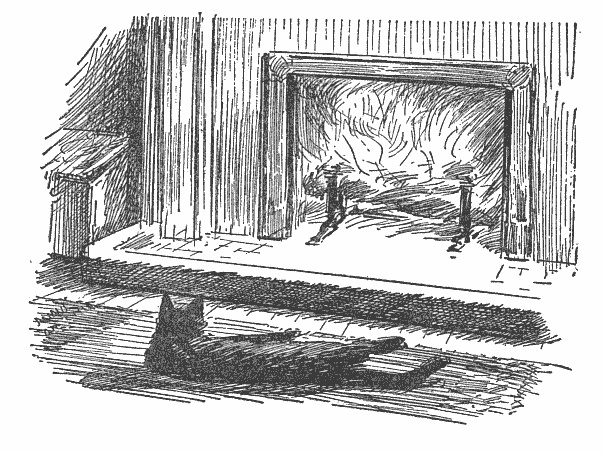
“I have often thought of you, Sammy, and hoped you were safe,” said Miss Dee.
The old cat looked over his shoulder in acknowledgment, squirming a little at the warmth of the fire on his stomach. He liked to be addressed with solicitude by a quiet, familiar voice, and perhaps for a moment savored again the days of peace. Too many voices were unfamiliar now, called him loudly by name or laughed as he passed, tail in air to the Air Raid Shelter, pausing unerringly at his own door. He did not care to be an object of ridicule, but he was curious about the shelter evidently, for a day or two before he had slipped away behind his guardian’s back, descended eight flights of stairs and been eventually found there in solitary state, going from room to room.
The girls Alison and Biddy, about whom we had been anxious, had had no serious incidents in their district on the other side of London, so they said. They dropped in after coming off duty, very attractive in their uniforms—slacks and coats of dark blue and small, peaked caps. They had brought the cat of the house a present—a piece of liver, very soothing to the palate and certain augury of sound and happy sleep.
Alison had seen the Queen, who was looking lovely, and Biddy had lost her rug. The two items of news had no connection of course. Only a few from each station had been present at the Queen’s visit to headquarters, and Alison had been sent with one of the cars.
“But where did Biddy lose her rug?”
“I didn’t exactly lose it. It went to hospital round a fireman,” explained the young one, as though the rug had legs.
The story was arrived at by extortion at last. Off duty at their lodgings they had heard cries for help during the night of a raid and had rushed out in their pajamas. Two firemen had been injured by blast, and the long and short of it was that Biddy’s rug went to hospital round the one who was badly hurt.
Incredible world! There they sat, the two unknown figures who had heard that cry in the night and leapt from their beds to answer it amid the din of battle, faces unseen on both sides in the blackout, and merely a rug, bought for a young traveler crossing the world, as a link between rescued and rescuers. They would never even know if their help had come in time.
The nights were full of great deeds of heroism and devotion, few of them in the stress of the moment seen or recorded, yet there seemed to us a special valor about this one because it had not been done on duty when nerves are steeled to the task by training and anticipation.
But they were more interested in their news from home.
“We’re all in it now,” they said.
Even their father had gone back from retirement to help the Government; the baby of the family was in the Royal Australian Air Force; and the eldest had his commission in the Indian Army.
Empires are certainly useful things to have about.
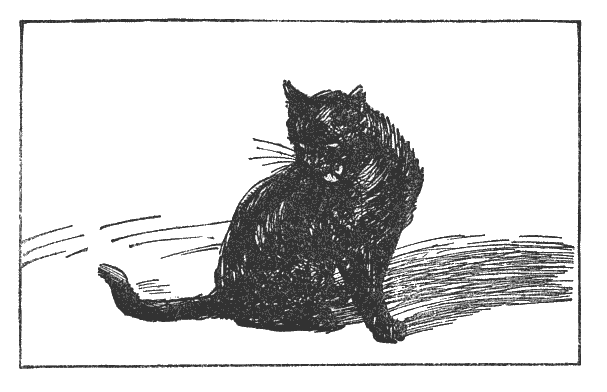
 t dawn one morning we heard thrushes
singing in the trees as though the country
had invaded London overnight.
t dawn one morning we heard thrushes
singing in the trees as though the country
had invaded London overnight.
At a time when all life moves to a single purpose and one’s ordinary ways and occupations are pushed aside, many things become visible and audible. No doubt the thrushes had always sung so and there was nothing magic about it, for this evening we can hear a whole chorus of birds. The road is closed for repairs and traffic diverted, and the children, who normally would be shouting out of doors, are away among the fields and woods. We should not have been up at dawn to hear that crystal song in ordinary times. Hearing it in these gave us a mixed feeling of delight and pain.
The flower of our young men were dying, on land, about the oceans of the world, and in the air, and the thrushes became one with the nightingales of Heraclitus,
“For Death, he taketh all away
But them he cannot take.”
There are utilitarian sounds, too, which can move one suddenly in this strange era. One midnight when some of the first enemy planes were growling overhead I heard a train whistle and then, far away, like the echo of ghostly steps, the slow regular “chuff chuff” as it strolled out of the station. There was something very reassuring about this. It was so deliberate, so insulting to the menace in the skies—a dignified refusal to hurry. It reminds me of the tale of the railway porter who said to one of his regular travelers: “It’s just as well you caught the early train, sir. There’s a D.A. bomb on the roof and it hasn’t gone off yet.”
It was always a delayed action bomb of which stories were told in the early days, on the principle perhaps that if “my sister’s husband’s grandfather” had seen a bomb, it must naturally be the largest in the world.
Another favorite legend was the aerial torpedo actually seen by various imaginative folk until it became known that it is a weapon not used in land warfare. When brave men removed the huge time bomb which was endangering St. Paul’s, some of these knowing amateurs explained to each other:
“You see, it was a torpedo and was burrowing under the foundations, so they had to hurry.”
With an enemy bent on murder rather than military advantage, the noises in the night were soon too widespread for such talk to be received with patience, and soon it ceased.
The crash of a falling building is a peculiarly sickening sound; the thud of a bomb, even at a distance, can shake the dust and plaster from the walls, bring soot down chimneys and fill the world outside with a prolonged tinkle of broken glass.
Only the thunder of the guns was comforting, the louder the better, and at last the clear steady note of the “Raiders Past.”
Life was fantastic, as night after night the din went on, sometimes for twelve or fourteen hours at a stretch. Dinner became a movable feast and sometimes missed altogether or finished in the air raid shelter.
The Penguin’s was prepared beforehand and accompanied him downstairs. He quickly learned to recognize the sirens and to hurry importantly to the door, awaiting transportation. Having dined, he would sink to rest, or accompany his bosom friend to a fireside in another room until bedtime. Only when the danger came too near was he put in his basket, but he was still fond of it. The sides supported his back and a little change was always agreeable to a cat. The night when Fluff the Persian and family were hurried in, he sat looking over the top of it with sympathetic interest at this poor shivering creature who would not be comforted; and a night came when he even shared his room with a dog, without raising the least objection. The dog, on the other hand, if we are to believe his owners, had a nervous breakdown afterwards. The outrage was more than he could bear.
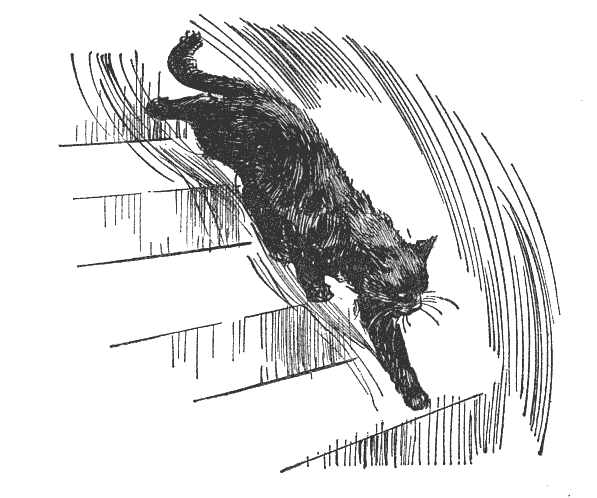
By day people snatched a moment to telephone anxiously to their friends, and after the dog incident, which had followed a bad night, Samuel’s friend David Garrick forwarded a handsome check to the Animal Post, in celebration of the fact that they were both standing up to the ordeal in tolerable health and spirits.
The communal dining-room which had opened to provide meals for bombed-out families, began to send over savory scraps to the inmates at the Post, and the local restaurant did the same. Home Guards undertook to watch the building in case of incendiaries and release the animals if necessary.
We had become a village where suddenly every one knew every one. The girls in the little faithful shops, anonymous for years, acquired Christian names; bowls of flowers stood on the counters, a gift from some customer who had had them from the country.
The little shops, like the little ships, won their spurs in the Battle of Britain, if our village is any criterion. Their windows smashed by blast, sometimes with fires and damage all too near, they cleared up smartly and carried on, wrestling with coupons and rations, trying to play fair with every one when goods ran short, ready with suggestions for the harassed housewife, providing substitute lunches in place of vanished pastries and ham sandwiches beloved of girl clerks; always ready with spare papers and periodicals, or a tin of biscuits or cakes of chocolate when soldiers’ parcels were in question.
“Shall we be able to have any meat today, butcher, because if it’s difficult I’ll manage somehow.”
“Well, we did have part of the roof blown off last night, Madam, but that’s all right. You shall have your order.”
The butcher, third of his line to serve the district, is a Home Guard after hours: so is the bank cashier. The house agent, in the same corps, is becoming a crack shot—nineteen bull’s eyes out of twenty.
The small, rather special circulating library was found one morning with the daylight pouring through the roof and the books in confusion.
“Oh, dear, I suppose you’ll have to close?” exclaimed a customer.
But the librarian, calm and smiling, didn’t think so. She was awaiting the landlord and in due course with amateur help, because labor was scarce, she moved across the street.
The word went round that the tall girl in So-and-So’s was married to a man in the Merchant Navy whose ship was missing, and that bright little Nancy had been killed with her invalid mother who was too ill to be taken to shelter. The woman who had made herself so unpleasant to the Guards because the dogs barked became suddenly gracious and full of smiles, for news had come that her son, lost at Dunkirk, was alive and a prisoner of war.
Somebody’s refugee maid caused deep suspicion among her fellows by laughing loudly when the R.A.F. raided her home town in Germany, merely a forlorn attempt perhaps to prove herself one of them.
“It’s not natural,” declared one young woman righteously.
But there could be nothing natural about her whole situation, and the righteous one received no encouragement.
Incendiaries fell with a tinny sound and flared up swiftly, and then the steady hum of the fire hoses would become an accompaniment to the din unless the wardens had been in time with sand or stirrup pump.
They were heroes now after long months of ridicule, because their services were not called upon and they were so trying on the subject of lights showing. It had been hard to persuade the citizen that his small chink could do any harm and it was by no means so easy as it might seem to make the blackout perfect.
“Of course I have double curtains. It must have been the wind,” the indignant sinner would exclaim.
“Then you must close your window.”
“Do you expect me to sleep with it shut? I must have air in the room and I always read in bed.”
“I’m sorry, but there is no must about it,” the patient warden would reply. “You can’t endanger other people’s lives.”
“It’s perfect nonsense. What, a little chink like that? My brother has been up in an airplane and he says you can’t see a thing.”
In less polite neighborhoods a derisive shout of “Put out that light” used to greet the warden, before the bombs began to fall.
Not afterwards. Whatever else we criticize, there is no praise too high by common consent for wardens, ambulance drivers, and firemen.
It would be a rash person in this war who handed a white feather to any one, if that contemptible sport had not been killed by scorn in the last war.
Why, you might wonder, as a dance band drones out some dreadful cacophony by radio, aren’t these players of fearsome instruments doing useful work? But probably the leader goes off at midnight to a warden’s post and the drummer is a shelter marshal and the saxophone player takes a spell of duty with the Auxiliary Fire Service.
The girl, who seems to be doing nothing, gets up at five a.m. to help serve breakfast at a leave club; the girl who shampoos your hair spends three nights a week at a canteen; the very smart woman has been seen calmly carrying salvage saucepans and kettles piled up in her handsome car.
A diversion has just occurred, due to a great shouting out of doors. It proved to be a mock battle between the Home Guards, with rifles, bayonets, hand grenades and other deadly weapons. It was, like the Wars of the Roses, between the reds and the whites, and a sergeant of the White Army performed wonders, lying hidden and hurling hand grenades at the advancing foe and spotting snipers with great speed. While it is pleasing to know we have these defenders handy, we have seen some of them before, not merely drilling in their lunch hour from shop and office, but during the worst air raids this year putting out incendiary bombs and bringing cars to safety from a burning garage, while a girl sat at the wheel. She was not on duty and had no call to go, but she went. At dawn she was out with every one else taking tea to the auxiliary firemen, wet through and cold in the chilly air.
They were civilians too who had given their leisure to train in the months after Munich in a service which has already taken many lives. In the distance a blaze was still burning unattended, but it proved to be a condemned building bombed last year and now set alight. There was bathos in the double event, as it endangered nobody and even perhaps to a large extent saved housebreaking. The firemen gave it the coup de grâce before going home.
The mock battle is over now, and I see McTavish is in town, trotting importantly as only a Scottie can at the heels of his master’s sister. The nights are so short at the moment that she can risk his company and consolation for a little while. Tim has been posted missing in Greece, and she and McTavish must face the agony of despair and hope which may be more cruel than certain knowledge.
Against the background of the threatening sounds of the night were others more reassuring, the rush of a passing car, to the scene of some “incident,” as they call it all too mildly, or the steady footsteps of patrolling wardens or police. Sometimes latecomers hurrying home would break into a song or an argument among themselves, and a voice indoors would remark:
“Ah! There goes the panicky British Public.”
And then there would be the racing fire engines with their clanging gongs; and hasty visits to the entrance door to peer out for the red glow in the sky. I have never shared the enthusiasm of the fire fans who in peacetime liked to watch these disasters. Now they are more than ever horrible, an illuminated target for the bombs of the Hun, often a death trap to the men who fight the flames. It is said that the thunder of the water from the hoses drowns all other sounds for those who wield them; so death, when it comes, is mercifully sudden, but how can we know? Brave men are full of comforting tales for those who do not share their risks.
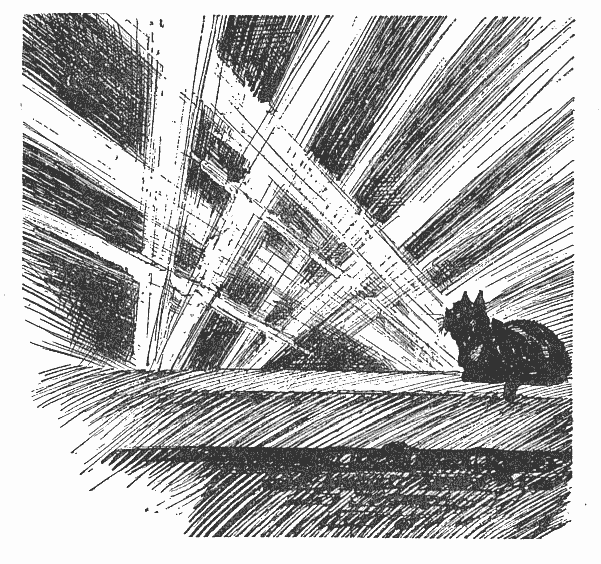
We passed a burnt-out house the other day, full of charred beams and twisted iron and so completely gutted that no floor was left. A printed notice by the local authority announced that:
“This building has been condemned as unsafe and it is illegal for anyone to reside in it.”
We could laugh comfortably at this pompous warning, for the thirty-five occupants had escaped unhurt, and no high explosives had fallen here. It had been a women’s hostel and next morning, after one of the worst raids in history, the girl secretary was dashing cheerfully about seeking temporary shelter for such furniture as had been salvaged. It was a Sunday morning and not far away one of the little shops was loading goods damaged by water, into a van for the inspection of the Food Ministry. Furniture was another matter and somehow, single-handed, she got it tucked away. Her large “family” were safe at the rest shelter, she said in answer to inquiries, “not even a scratch among them.” On the outbreak of war she had offered her one free afternoon and evening a week to the Warden’s Post, and she wore a tin hat on the back of her head. Some days later she was seen again, this time dealing with a number of pictures and ornaments which, by a freakish chance, had been found unharmed on one of the walls. Whether or not she climbed in and got them herself I never heard, but I wouldn’t put it past her.
There must, no doubt, be frightened girls who hide themselves away, but we haven’t come across them.
In a vulnerable area a warden knocked at the door of a young soldier’s wife one snowy winter night and advised her to go at once to a shelter.
“And give the baby pneumonia? Don’t be silly!” she retorted, and shut the door in his face.
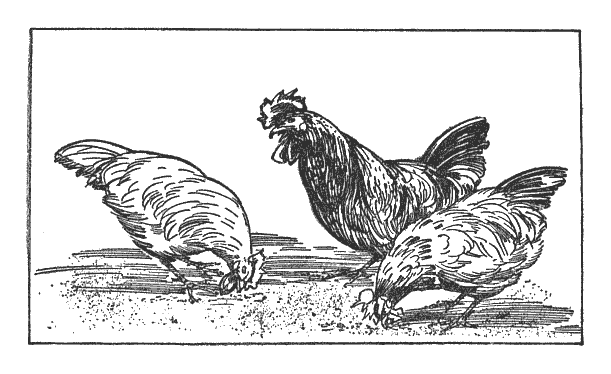
 fter a really bad night raid Samuel Penguin
slept like a log all day, thoroughly
worn out. No doubt the constant footsteps
and voices or perhaps the communication
of human unease had disturbed his rest. Even we slept
one afternoon early in the blitz, against all precedent,
from three to seven p.m. and were only awakened by
a visitor, who announced brightly,
fter a really bad night raid Samuel Penguin
slept like a log all day, thoroughly
worn out. No doubt the constant footsteps
and voices or perhaps the communication
of human unease had disturbed his rest. Even we slept
one afternoon early in the blitz, against all precedent,
from three to seven p.m. and were only awakened by
a visitor, who announced brightly,
“I’m so glad the All Clear went in time for me to run round for a moment before dinner.”
All Clear? There had been a sharp raid and we had heard nothing of it.
Stranger still we slept at night, and since the attacks went on for months without a break, it is reasonable to suppose this must have been general among those not on duty, or the ordinary life of the community could not have been carried on.
People slept in the tubes, on the stairs or the platforms, until an outcry on the question of these and other public shelters hurried on the supply of bunks.
“It is quite comfortable really when you get used to it,” one woman told us. “We have nice neighbors and keep to the same spot and we don’t hear a thing.”
It was argued that there would be dreadful epidemics, but even these natural expectations did not come to pass. The general health of the nation was pronounced rather better than usual, and it may have been that the provision of doctors and first aid posts for the public shelters had something to do with this, or merely that everyone’s resistance unconsciously responded to the emergency.
The vastness of this great city came home to us as never before on those anxious mornings when we trouped to the roof and scanned the scene for fires and the places we loved. An occasional pall of smoke, a crop of rumors, gathered before the world was even awake, but London solid as ever greeted us, much of the damage done being invisible except at close quarters. We would hear all too soon of the places destroyed, old lovely buildings cherished for centuries and enshrined in our hearts and in our history, destroyed as certainly as our wealth and our young manhood were being spent because we were left to save civilization alone.
When the raid had been slighter than usual, people said to each other: “I wonder who’s getting it this time?” anxious for our cities, less vast and perhaps more vulnerable, standing up with such gallantry to blows we could not see.
American papers just then were describing the joy of new arrivals from darkened Europe at the bright lights of New York. They did not think perhaps how cruel an irony that boast would seem to the darkened cities of Europe under the Nazi heel. To us the picture of those lights seemed as unreal as so many of the words that reached us, and we did not envy them. We remembered that the men of our race from every corner of the earth were fighting the evil gangsters who had set out to enslave the world, that British designers and workshops had produced the finest aircraft, quietly and without a fuss, and that our pilots, though vastly outnumbered, had defeated the invasion of Britain. Thanks to the treachery of some and the hesitation of others, the enemy was five times nearer to our shores than we to his, and night by night civilians were being bombed to death and the treasures of the past reduced to rubble. Those who did not suffer these things will easily forget them, but they must be reminded. In the new world when peace is won, we shall have a right to demand the end of fantasies, and a return to truth which the Germans have corrupted.
Below on the road, as we scanned the panorama of London, the steady footsteps of her citizens going to their day’s work were an accompaniment to our anxious thoughts of her. Some would find their shops or offices had been hit and spend the day salvaging what they could, selling their goods or dictating their letters in the street maybe, or tapping a borrowed typewriter in some corner offered by a sympathetic neighbor.
And presently we would see khaki figures or blue, men on leave going out after an early breakfast to make the most of their leisure, sailor lads from gallant little Newfoundland which has sent us so many of her sons, soldiers and airmen perhaps who had paid their own way from distant islands to fight for a great cause.
They were a reminder of English men and women who could not, in these hours of destiny, see London as we were seeing it, but must wake each morning perhaps with a deeper apprehension for that very reason, until across the ether, across the dividing oceans, turning on their radios for the Overseas News Bulletin, they would hear under other skies, the slow, sonorous, familiar notes of Big Ben, and the announcement “This is London Calling.”
On the sheep and cattle runs and wheatlands, the orchards and hop gardens, on the pearling stations, in vineyards and sugar fields, in the bush, on the veldt, in the jungle, along the Golden mile, in the silver and diamond mines, in the banana groves and tea and coffee and rubber plantations, on landing grounds and seaplane bases as well as in a thousand cities and towns and little ports, it would be a welcome sound, to many who might never know the city of London but, knowing freedom, were enlisted in her cause.
For among these the Nazi virus had not taken, though German ships before the war sailed all the seas, dropping persuasive gentlemen ashore to buy and sell and plot in cellars.
Only the other day, it seems, my friend Frederieka had a flat in King’s Bench Walk in the Temple. Actually it is some years since she set off on a world tour, married, and settled down in a beautiful little tropic port of North Queensland. In a recent letter she tells how without warning about nine of a summer morning an Australian destroyer put in and there disembarked five hundred men and women, the rescued seamen and passengers of British and Allied Merchant Ships sunk in the Pacific by Nazi raiders. They had been put ashore by the enemy on a small atoll in the Pacific where there were only three or four inhabitants, who, however, somehow managed to send the news to Sydney.
They had, of course, lost everything and for weeks had not even had a change of clothes; so the town’s Red Cross went to work at once. Almost before they were well ashore, a shed on the wharf had been converted into a giant market and the guests were invited to walk in and help themselves. There was a complete new outfit for everyone of them, even down to such desirable items as powder and lipsticks for the women.
“I’ve been in many markets about the world,” wrote Frederieka, “but this one beat them all for fun. We worked twelve hours till nine at night when special trains carried them off to Sydney and we could easily have worked another twenty-four. I’ve never met a more inspiring company of people. They were simply grand, and all they wanted was to know when they could get another ship. There were girls among them going home to volunteer for work with the R.A.F.”
In time the other ships must have been duly found, for soon some of the rescued were telling the story in London over the microphone, beginning with the shelling of their ship by the Nazi pirate disguised as a Japanese merchantman (and the killing, alas, of some who sailed with them), to the rescue, the great reception ashore, and the long train journey south which became a veritable triumphal progress.
And all this, in the odd way things happen, links up with our village, for the tall girl in So-and-So’s is happy again. Her husband was among that company, safe and well.
Yet the voice of London calling now means something to other peoples too. It is the true voice of the Netherlands speaking to those at home who may not speak, to those abroad who are spending their treasure in the common cause, to her ships at sea, Naval and Merchant Marine, which keep the flag of their country proudly flying. It is for the time being the true voice of all the subjugated countries, and one day there will be great tales to tell of the answers received and brave deeds accomplished because it kept hope alive and courage high.
Men come at its call to swell the armies mustering in Britain under many flags, as well as ours, from distant corners of the world. And all along the coast of Europe people wave to the R.A.F., knowing that there goes a friend, and very possibly a brother. Rotterdam, Warsaw, and other once happy cities will not go unavenged, nor any stone of London. All over Belgium the letters R.A.F. are printed or painted up at night under the very noses of the Gestapo, and little girls sing to a popular tune:
“L’Angleterre, l’Angleterre
Gagnera la guerre.”
In Denmark English has mysteriously become, since the German occupation, “the only foreign language the people know,” reported a Dane who slipped out of the country somehow and came here to fight. Subtly the people of Holland have made the invasion of Britain which did not happen a joke to break the German spirit, and small boys make swimming motions as the enemy goes by.
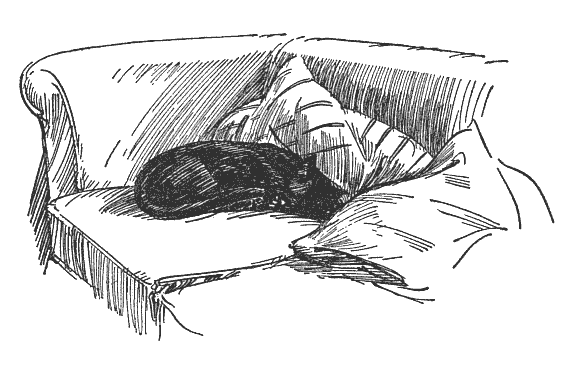
And a young soldier who called to see Sam’s friend, reported that the Lofoten raid, in which he had participated, had been just like going to tea with a friend, the Norwegians were so glad to see the raiders.
There are some who argue that the voice of London is too quiet. It ought to tell more. It ought to tell everything. And no doubt, the enemy, his ear at the keyhole, applauds the sentiment. Isn’t it possible that those who hear too much become incapable of hearing anything? The voice of London is at least authentic and neither friend nor foe can buy it.
Sam approves of it. It is quiet and does not disturb a cat. As for Big Ben, it can be confidently stated that its booming notes strike a responsive chord in his catty interior, so that he rolls over on one ear as they reverberate through the room.
An air raid warden one morning put his head round the door of the Animal Post.
“I suppose you couldn’t take in a party of homeless hens?” he asked doubtfully.
There were four of them and a time bomb had fallen in the vicinity of their usual habitation. The Post had a small yard and shed at the back of the house so these somewhat outrée guests were accepted. After all they might lay. A brisk bidding began among the guards for the expected produce, while food and strawfilled nests were made ready.
The ungrateful fowls, however, clucked and tossed their heads. They knew their rights as evacuées, and stirring a feather on behalf of those who served them was not in the program. A more self-important and censorious quartette it would be hard to find, and throughout their occupation of the premises not an egg was seen.
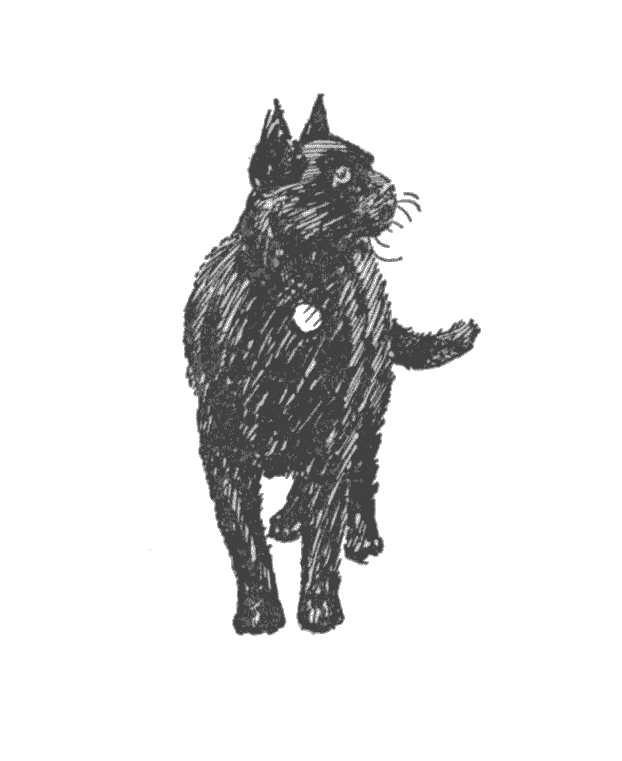
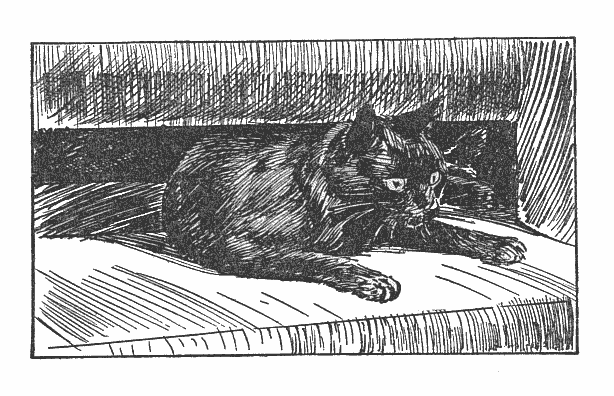
 he air was full of the thunder of guns, the
throb of engines and the thump of falling
bombs one night when a giant hand seemed
to slap the building above our heads, making
even Sammy Penguin, who had been sound asleep,
leap from his bed.
he air was full of the thunder of guns, the
throb of engines and the thump of falling
bombs one night when a giant hand seemed
to slap the building above our heads, making
even Sammy Penguin, who had been sound asleep,
leap from his bed.
“A near one,” observed somebody laconically, for by now we could recognize blast from an actual hit.
Its peculiarities are not to be explained. It may suck out windows or push them in, and there is even a tale of a wardrobe, apparently unharmed, in which every garment was found to be torn to ribbons. These are its more innocent peculiarities. With its horrors this chronicle is not concerned.
All glass had been removed from the air raid shelter supplied for the tenants of these flats and sandbags packed outside the boarded windows. At this level it was less noisy than upstairs and in some respects less dangerous, for we were protected from flying splinters and débris. We slept on mattresses on the floor, though soon a bed was put up for me behind my back because I had been incapacitated by arthritis earlier in the war. I can claim no credit therefore for the spartan existence which the others bore without a groan. I was, alas, a brake on progress, unable to open a door, run, or dress without assistance.
That night after the smack on the wall and the inevitable corollary of soot and dust, we heard footsteps running along the pavement outside and the swinging of the entrance door, always now left open.
“Dolly! Win!” we heard, and hurried out into the passage to see a party of fugitives. Mrs. Jones and the two pretty girls from one of our little shops had run this way rather than to a public shelter, and small blame to them! They were accompanied by a friend, her face streaming with blood, for she had been hit by something, though she did not know what.
In the darkness they had stumbled through broken glass and fallen masonry out of the house, but they were smiling and making no fuss whatever. While first aid boxes were opened and the injured woman taken to the bathroom for attention, Mrs. Jones explained what had happened, as far as she could.
“My husband was hurt fire watching and they have taken him to hospital,” she said. “There are incendiary bombs all down the road, and I think our shop is on fire.”
She might have been discussing the weather.
Rugs, cushions, and chairs were collected. Some one made tea for them, the first and best stimulant in case of shock.
In time everyone went to bed and to sleep, as the raid subsided. By morning our fugitives had gone, having crept off silently before the residents were awake.
We hurried into our coats and went to see how they were faring. The little shop had not been burnt and even the incendiaries had been an optical illusion. A bomb had pierced a gas main opposite, however, and a jet of flame was still burning merrily, while the service men worked fast to deal with it. The shop window had been blown in, but already glass and masonry were cleared away. Mrs. Jones, looking as fresh as the morning, was making tea for the workmen of the gas squad, and her husband, back from hospital and swathed in bandages, was getting ready for his rounds.
They are not among our old residents, the Joneses. They belong to Wales, but they came to London in the good times and will not desert her in the bad, part of the backbone of Britain, like thousands more.
If it was all’s well that ends well as far as that incident was concerned, there were many people less fortunate about London that morning, and indeed every morning after a raid. Even far beyond the actual bomb crater, which had often brought death as well as devastation, were broken windows, blown out doors and window frames, torn curtains hanging awry from jagged apertures, and stonework torn away.
Shop windows fell in showers, but soon ingenuity had solved a way to preserve some of their charm. Gaily colored posters covered the substitute material used in place of glass and small panes were inserted through which the passerby might gaze at delectable hats and gowns.
The Animal Post had lost its windows in the night, and the gardener, going on duty early, was busy brushing the glass from the pavement when a passing stranger exclaimed with sympathy:
“Oh, bad luck! I am sorry. May I contribute half a crown?”
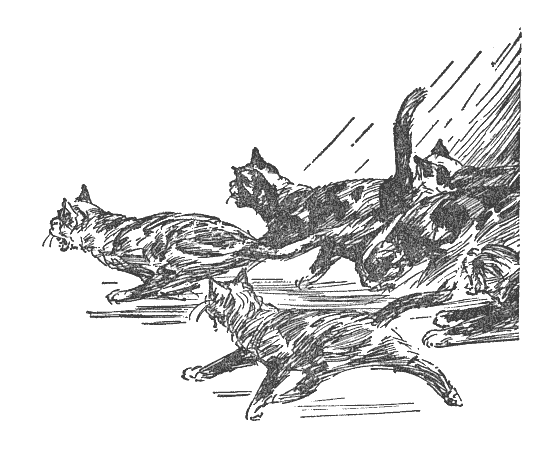
Later in the morning someone brought in a tabby cat, a handsome little creature, but clearly terrified.
The new guard recognized it.
“Don’t say something happened to her?” she cried. The messenger nodded.
“It was sitting on her knee when they saw her last,” she said, “but it must have jumped in time.”
Had it been prescience? The lady, of whom they spoke, only yesterday had given ten shillings to the Post, and begged:
“If anything should happen to me, don’t let my poor little cat be left, will you?”
It was put to sleep as she had desired.
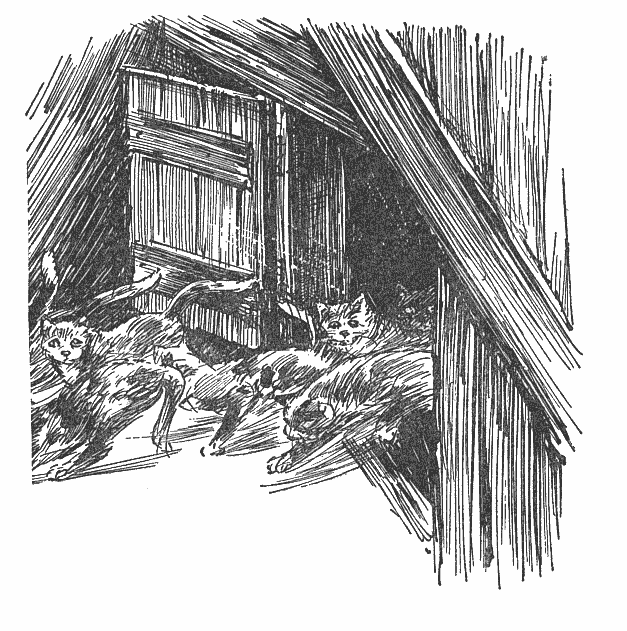
It was a pity about the window, for the canaries and parrots were accustomed to sun themselves there every morning. No one could guess how this evil warfare affected the birds, but the pigeon parliament was certainly smaller than of old, and it may have been fancy, but they seemed to huddle together in sheltered corners. Sam no longer watched for them from his corner window, for that too followed many others before the blitz was very old.
Occasionally a cat patient, fretting for its lost comforts, was brought on an experimental visit by the gardener. The Penguin made no objection, but perhaps his presence was a bar to consolation, for the visitors remained unhappy and were eager to depart. It was not another fellow’s home they wanted, but their own.
They exhibited, these refugee cats, a keen sense of self-protection. One morning after a bad raid when the guards went in to open the Post and give them their breakfast, a whole procession of them came out from under the stairs, reputed to be generally the safest place in a house. A mother cat, who had been nursing two kittens upstairs, carried them down to the basement, carefully chose them the most comfortable cage and installed herself and family there.
Sam for his part, our once strong and silent cat, developed at this time a purr of astonishing volume. He would turn it on for his Irish friend last thing at night and at such a pitch that on one occasion a sleepy voice was heard to say, “I believe I can hear a bomber.” The owner of the voice was incredulous and slightly offended to find it was the cat of the party. She gave him lip service, but there was not much love lost between them. Sam seemed to suspect insincerity and looked at her accordingly, with a dubious eye.
The change in his voice was difficult to explain so late in life. We put it down to the natural patriotism of a cat of London, and who is to swear it was entirely unconnected with the times in which we were all living? After years of peace and quiet he found himself suddenly in the midst of tumult, but still with his friends beside him and his familiar comforts at hand. His song was perhaps an expression of confidence.
That afternoon John looked in, stretched and expanded, it almost seemed, by his months in the Army. He was going home on leave and remarked in almost a critical tone,
“I thought London would be practically flat; and my train wasn’t even five minutes late.”
He unwound his enormous length on the hearth rug beside Samuel, who woke up, sniffed the leathery smell of his Sam Browne belt with evident approval and settled down again.
“Bit of a dog, aren’t you, Sam?” said the boy.
“Of course he’s a bit of a dog. Don’t show your ignorance.”
John laughed.
“Well, I’ve never seen him do that before!”
“You’ve never had it on for him to do it to. He’s congratulating you. You are not staying in London tonight, are you?”
“Why not?” The innocent angel of long ago was there, smiling broadly, sensing, the little devil, that we should be alarmed for his safety.
“Oh, I thought it would be rather dull—nothing on earth for you to do. I suppose you have very little time for fun in camp either. There aren’t any girls in the vicinity, are there?”
“We catch a glimpse of one just now and again,” said John, grinning.
His hand was massaging a black fur gentleman who rolled a little and waved the tip of his tail in appreciation.
John is an only son, and if not today, some other day, he will go home announcing:
“We’ll probably be off any time now, so they say.”
And his mother will return serenely:
“Really, darling? Well, you’ll like that, won’t you? You’ve always hoped they would send you abroad.”
There will be no word of her fears or feelings, and I remember a letter from an old friend in Australia, whose two sons had enlisted, saying, “but if I had twelve I should expect them all to go.”
The pattern of our race does not change, and there are no decorations for the courage of parents.
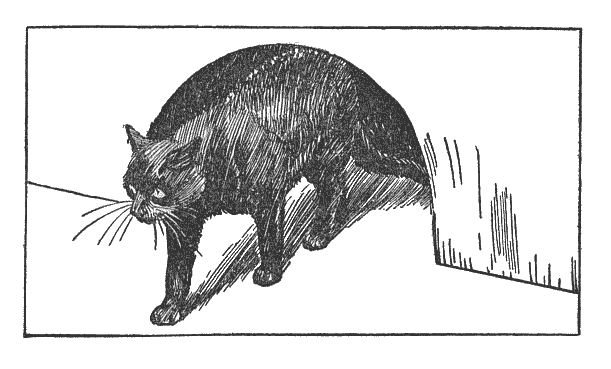
“I think it’s going too far when Jerry pursues you from house to house,” remarked one of Sam’s human friends. “It ought to be prohibited.”
She had had the top of her house knocked off quite early in the autumn, moved to a second, to have a bomb on the garage, which destroyed one wall, and to a third where “the wretched missile,” as she called it, fell in the square.
“I’m beginning to think I must be a ‘carrier,’ ” she said plaintively. “Do you believe in ghosts?”
This is not a question that usually requires an answer. You first prick up your ears, or say “Why?” in an eager tone and the story is yours.
“Our square was once open country, of course,” she said, “and it seems they called it ‘The Field of the Forty Footsteps.’ ”
“Were they spooky ones?”
“My dear, it was a duelling ground, and one morning two brothers killed each other there while the hussy in the case sat on a bank and looked on. And from that day, on the spot where they fell, the grass refused to grow.”
“There must have been two spots if they both fell,” said the gardener, who has an exact mind.
“Or perhaps you mean their ghosts walked up and down and wore out the grass?”
“I don’t pretend to account for it. I am just telling you the story,” protested our guest with asperity.
“Do go on,” we implored.
There was little more to tell, except that the bomb had fallen there, bang on the path between the grass plots. This she deduced must have been the exact spot because no reasonable person would attempt to grow a lawn on a place where grass had for centuries refused to grow.
I had a vague suspicion I had heard this legend about another district, but it was a pity to spoil her story. Any one three times bombed has surely a right to what entertainment she can make of it.
There is a saying, which may or may not be true, that you never hear the bomb that is going to fall on you. The advantage seems a little doubtful, but the theory is supposed to be comforting and is often advanced at moments when disaster seems imminent, by the men to the women of the party.
When ours fell we were playing cards and not attending very carefully to the noises aloft so cannot lay down the law about it.
There certainly was considerable blast and there could be no doubt all the windows in the neighborhood were raining down in fragments outside, but when a voice in the corridor said the building had been hit we were incredulous.
Sam, lying at his ease, did not stir, but lifted his head and smiled benignly as we trooped out to make inquiries. People were emerging from other rooms and a boy was chaffing his mother.
“There you are, mum. Didn’t I tell you this one was going to hit us?” he cried.
“Don’t talk nonsense! You can see for yourself the place is standing.”
Yet almost before she had finished speaking the wardens were streaming through the entrance door, mere girls among them, and clattering up the stairs. (By common consent the lift was put out of action at night in case the current should fail when it was in use.) As they went, it was declared by various witnesses, they had mentioned our number, but the tenants were waved back by the wardens and we returned to the cat of the house to await events.
There he lay, quite unconcerned, his friend having joined some of her acquaintances on the stairs. His supper and breakfast were safe in the basket beside him, so at least, we felt, the principal member of the family was provided for. There seemed no likelihood that we should be turned out into the night, and we were stunned with admiration for the quick service of the wardens.
The din outside had not abated, but some one had acquired information. A head came round the door.
“Fifty-five caught it. Swept clean into the street.”
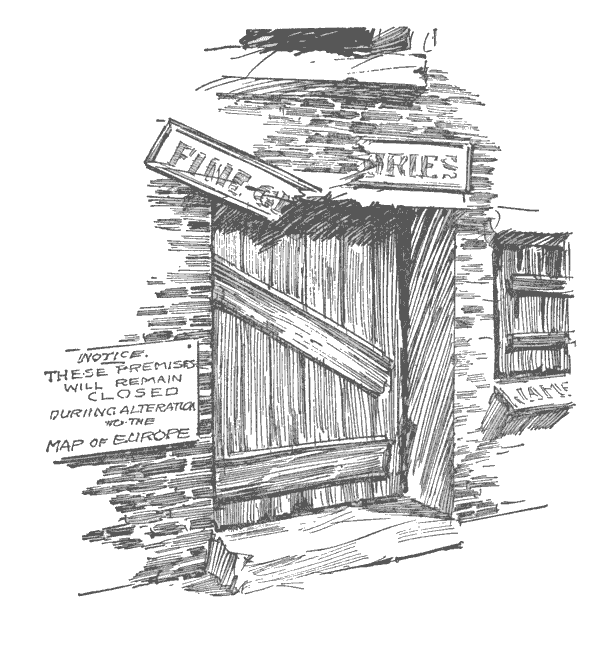
Not our flat, not even our staircase!
“Then what are the wardens doing?” we asked.
“Looking for incendiaries or victims. I cut my finger this afternoon and they tried to take me to hospital. Bloodhounds, that’s what they are.”
But the anticlimax became a climax again, when young Ireland rushed in, breathless and in tears.
“Our flat! It’s terrible. The drawing-room ceiling is down. It’s ruined, it is.”
She had been up to see.
The blast from the bomb had turned on the drawing-room lights which were blazing through the smashed windows to the sky. The wardens had called for the flat key and, having one on her, she had raced ahead, opened the door, switched off the lights and gone from room to room, looking for incendiaries.
To say that we were horrified hardly expresses our sensation. We were torn between admiration for her sturdy courage and relief that she was safe, for she had stayed with us when she might, like other neutrals, have run home from a country at war, and we felt deeply responsible.
“You must never dream of doing such a thing again,” exclaimed the gardener, a completely absurd admonition in all the circumstances, though no one even noticed that.
“No,” said the others impressively.
She was tucked in bed, given a hot drink and consoled about the drawing-room which could not be helped. There was little she could really tell us, for the first thing had been to put off the lights and she had seen nothing clearly therefore.
A warden looked in. They were going from family to family, seeking cases of shock, dispensing reassurance, and marshalling downstairs all the tenants from the lower floors, who usually remained in their own quarters.
The blitz was in its fairly early stages (for I have taken liberty with time in this wandering chronicle), and we were astonished at their competence. They had apparently searched every cranny on the roof for incendiaries and now assured us that no one was hurt and that yes, number fifty-five had caught it good and hard.
The tenant, a silent and learned lady, spent the nights with some friends of ours on a lower floor and presently the whole party arrived, with maid and dog, rugs, cushions, and suitcases.
“We are refugees,” they declared gaily. “The wardens have turned everybody out. Time bombs, incendiary bombs, I hardly know what they don’t suspect in there.”
Fortunately, one of our party was away for the night so her place was given by common consent to the chief victim. She calmly went to bed, said little and before long was fast asleep.
Nine in one room, and a cat and dog! We could just do it, though the dog protested. Beds were made up in every available space and Sammy Penguin, quiet as a lamb, but interested in these strange proceedings, slept beside me with his lead in my hand. And far away from him as the limits of the room permitted, golden “Tinky” moaned from time to time, sternly admonished by her family. She was a beautiful creature but she could not endure the cat of the house, host or no host.
The rest of the tenants as far as we could gather were holding a reception in the corridor and at the foot of the stairs. Some were knitting, others having tea, while scouts went out at intervals whenever a lull occurred to return with the usual misinformation. Once we heard the familiar voice of the old porter saying proudly that this was a very strong building. There were not many like it nowadays.
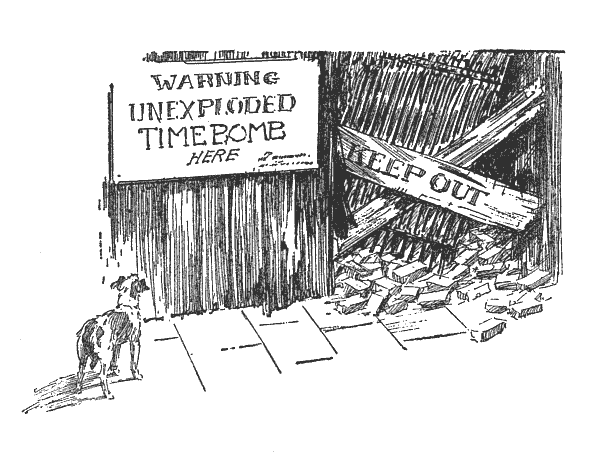
By and by the perpetual thump, thump overhead became merged in a steady humming sound and we knew that somewhere there was a fire. The raiders had gone, and in time the All Clear told us so, but it was useless to go upstairs until morning. With windows shattered and the blackout in force, we could not turn on the lights, even supposing there were any to turn.
There should be strong emotions to describe those hours when we believed our home was more or less in tatters. There were things in it long treasured, including great-grandmother’s silver and old china, but somehow in those days possessions had lost their importance to a large extent. It could not be otherwise.
We were all safe; we had had a lucky escape, and as for anything else, we did not even ask ourselves where we should go if the flat was in fact uninhabitable. Comparing notes months afterwards we discovered that we were curious rather than greatly upset by the calamity. We wanted to know the worst.
Everything is comparative of course. It would be manifestly absurd to mourn for chairs, silver, china, or carpets with the world at stake, but we were none of us being consciously logical that evening. We simply all fell asleep in due course without any particular anxiety for what surprises the morning might bring.
“We have a lot to be thankful for,” remarked some one in the passage, where the “reception” seemed to be dispersing.
“I have an aunt who always says that,” protested a young voice, “and then, as sure as eggs, she starts a family row.”
The sublime and the ridiculous!
One of our refugees turned over sleepily:
“Did we tell you our lift has completely vanished? I hope it hasn’t been shot through your windows?”
“Go to sleep! You are disturbing the dog.”
“Oo—oo!” moaned Tinky.
Samuel Penguin stretched and sighed. He much prefers one in family at bedtime.
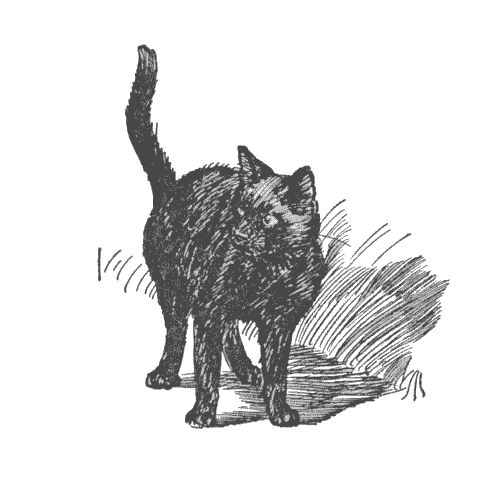
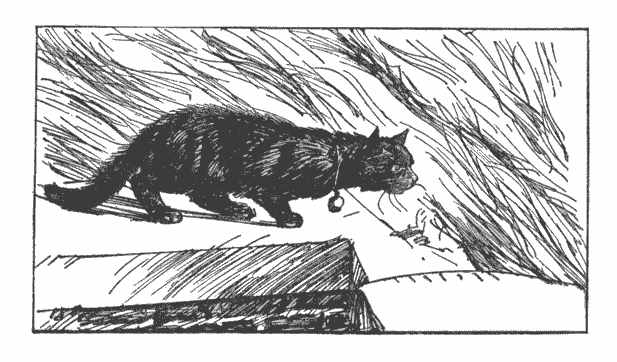
 am rode upstairs at dawn in his traveling-basket.
This marked the measure of our expectations,
for we were quite uncertain whether
there would be a roof over the cat’s head, or
a room completely whole where he would be safe from
splintered glass.
am rode upstairs at dawn in his traveling-basket.
This marked the measure of our expectations,
for we were quite uncertain whether
there would be a roof over the cat’s head, or
a room completely whole where he would be safe from
splintered glass.
At first glance there seemed plenty of this at least. The hall and passage were deep in it. A chilly wind blew through the flat which was filled with an indescribable smell of plaster and explosives. The dining-room, however, was intact, and even its windows had survived. Samuel was given a fire there immediately and shut in, a proceeding not at all to his taste. From time to time we heard him imperiously rattling the door handle.
His internment was not for long. The white tiled kitchen and its surrounding flatlet occupied by his young friend were also in good order, so he was transferred there and, having breakfasted, retired to her easy chair.
The ceiling was still where ceilings are intended to be. The white rubble which covered the drawing-room floor had come in from without and was mixed with glass, blocks of concrete, and odds and ends of furnishings and ex-curtains which had belonged to our neighbor at fifty-five. One panel of the door had been splintered and a piece of glass—neatly molded by blast, hung in the aperture. Something had shot across the room at a most peculiar angle and pierced the shade of the reading lamp; a colored Moreland engraving was in fragments, but china, glass, and the rest of the pictures stood serenely in their places, untouched.
So far good, if not utterly miraculous.
The piano, a new one, had taken the full blast and an iron bar and broken window frame had joined the concrete and rubbish on its walnut case. When these were removed it was so scratched that an army of cats might have been fighting there. Worse still, shell splinters had entered the curved back, carved off a slice of wood from inside the cover and done other internal damage which we could not assess.
In due course experts arrived, diagnosed, and carried it away to hospital from whence it returned a month or two later in perfect condition, so even this one serious casualty was not fatal. Our first impulse had been to leave it until the end of the war, but the experts said the piano would be ruined. What matter that it now stands inappropriately in the large bedroom, which was also found undisturbed against all calculations, where there are windows and a nearby radiator to keep it in a suitable temperature?
We felt that we were perhaps defying fate by having it repaired, but others went further. That very day somebody signed the lease for a flat in the bombed staircase.
When we came to our own bedrooms we discovered the measure of our escape. While there was no serious damage, all the windows were blown out, curtains and concrete and blocks of wood lying everywhere and each bed deep in shattered glass.
We should certainly have been injured if not actually killed. And the cat of the house? His favorite eiderdown had been blown across the room and pierced by splinters and a shower of downy feathers filled the air as we picked it up.
“Sam, my angel, are you mad?”
The rascal had pushed open the dividing door and now, stepping daintily but sniffing the strange smells with disgust, had joined the tour of inspection. He was picked hastily up and rode in safety thereafter. After all, it was his own house.
Where my long windows had been, opening on to a stone balcony now filled with indescribable rubbish, we surveyed our neighbor’s late premises. Even here only one room had vanished into the street, so at least her cherished library would be safe. In the ruins we were entertained to see one of the estate men wandering about with a watering can, presumably looking for fires. All the prophesies of the wardens in the dark hours of the night had proved to be mistaken. If there were any time bombs he would certainly not be there.
A neighbor arrived with condolences from the floor below.
“Jerry gave us fifty-five’s window boxes, earth and all,” she said, “a dirty trick when you have to pick them up, but I’m keeping some lumps of concrete by me to hurl at enemy paratroops. I feel I should enjoy that.”
After breakfast we remembered the roof garden. Here too wood, iron and concrete had been flung in all directions. Yet a last few autumn flowers were blooming, and bunches of tomatoes hung ripe and ready to be picked.
A strange school girl was viewing the scene with the old porter.
“Do you think it was a very large bomb?” she asked him hopefully.
“Oh, yes, Miss, but this is a strong building. I don’t know a stronger building anywhere,” he recited.
Sam entered his private lawn as usual and lay down in the sun, waiting for the pigeon parade, but they, poor lads, did not appear. We could only hope that none had slept last night beneath the windows of fifty-five.
From later experience, we came to the regretful conclusion that it could not have been a very large bomb, which would have been reassuring. Indeed to send an airplane through gunfire and anti-aircraft attack to wreak such small damage far from any kind of military objective would be inconceivable in anyone but a German, with his mad lust for destruction.
A Nazi pilot, speaking on the Berlin radio about this time, had described the exquisite joy he experienced on seeing his bomb burst on a block of London flats.
They do not even confine their enjoyment to cities, but attack solitary farms, villages, and country houses all of which no doubt are entered up as Arsenals in the Nazi library of fiction.
For a week Sam led a hunted life, shut up here or whisked up there for fear he should cut his feet.
Glass was in the carpets and down the ridges of the chairs. It had somehow entered locked cupboards and closed drawers. It clung to the walls and fell from the tops of doors or out of the pages of books. It glistened in the edges of the bridge table, or leaped out of the writing desk.
Every time the house seemed clear of it the demolition squad at fifty-five would heave something down into the road and a fresh shower would descend upon us. Then workmen appeared to block up our windowless spaces, and they took their hammers and joyfully knocked all the fragments still clinging to the window frames in all directions. Men love this sort of thing. They never grow up.
How much we take for granted! The heavy plate glass windows had not merely kept out the cold and let in the sun, but they had subdued the noises of the world so that we were as quiet as could be.
Now the wind whistled and the traffic roared and a chilling cold swept through the three blind rooms. We closed them for the winter therefore and moved easy chairs into the dining-room.
The days grew shorter, and the raids went on, night after night sometimes near and sometimes not so near, but always horrible. Many hundreds of animals passed through the Post, were calmed and cared for or put to sleep. They would hide for days among the ruins of the homes they had known or sometimes run in terror and be found far away. There were frightened cats, and cold cats who withdrew from sympathy; there were shaken dogs and staunch ones such as the little fellow who accompanied his master, fire watching on a roof top, every night and would not move from his side. He was not a refugee but merely brought in for advice, because he seemed a little out of condition, and he lifted wise eyes and looked from face to face as the question was discussed, later trotting off at his master’s heels to the Animal hospital for a tonic.
Sammy Penguin slept all day on his colored blanket before the fire and at night purred a loud good night from his pillow side by side with his young friend’s and with her protecting arm about him. When she had not come in before the sirens sounded, he would sit at the door in a listening attitude, quite as anxious as we were as though he understood the danger. With her coming he would be content and lie with his forepaws tucked in, smiling into her face.
Every night when the sirens went, he got up from his blanket, stretched himself from end to end, and walked in a leisurely manner to the hall door. He was not going to hurry for Hitler, but he liked, as the coats and suitcases were put out on the landing, to be there to superintend, to examine the buckets of sand and water, standing ready for the fire fighters, and to be first in the lift when it came up. He could count, however, as well as the next cat, and if one of the party was slower than the rest he would get out again fussily, whisking his tail.
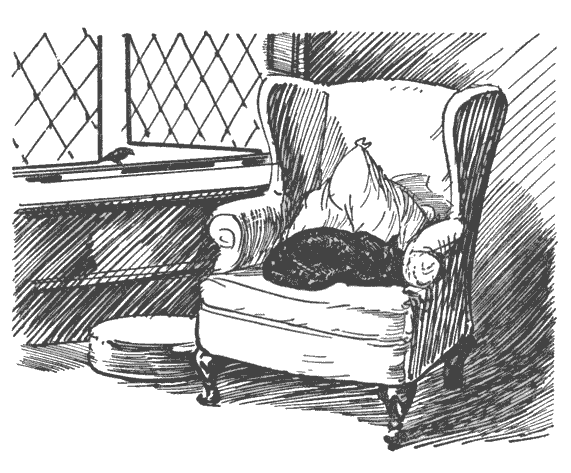
Arrived at the ground floor he rushed out in great haste, not to reach safety, but for his evening exercises on the stair carpet. This was an admirable spot for an elderly man. It was a strain nowadays to scratch splintery cupboards, and he would hitch his claws to the worn spot on the top stair and pull them out again with an air of rich enjoyment, while the procession waited behind him; then lead the way, descending with swinging gait, tail aloft.
Every night we thought of our two young ambulance drivers possibly out there in the heart of the din where the bombs were falling. Each morning we restrained ourselves from telephoning to ask how they were. Noncombatants should not fuss; the lines were bound to be overloaded with calls from anxious people; they might be asleep after a hard and terrible night.
And then one afternoon they appeared, fur-coated and in mufti this time. Alison is fair, merry, and immensely capable; tall young Biddy, clever and thoughtful. They had had a present of fruit from an aunt in the country and had made it into jam, they said, a subject so far removed from bombs and ambulances that for a moment it seemed fantastic.
“We’re getting quite a store cupboard,” they continued, “but we are tired of our present quarters and are taking a proper flat.”
They were viewing our scars of war with exclamations of polite sympathy when they made this last announcement.
“We must expect it, being at the top, I suppose.”
“Ours is a top flat too,” said Biddy.
“What?”
“But it’s so much nicer and there’s a lovely view. It is at the top of a modern block, close to our station. I think you’ll like it. After all, the war is evidently going on for some time, so we’ve decided to take it and furnish it.”
Furnish it? In the middle of a blitzkrieg, with homes being destroyed in all directions?
“Samuel Penguin, do you hear them? They are quite mad. What are we to do with the creatures?”
“Bring him to lunch when we’ve settled in.”
“We’ve seen a rather jolly cream carpet.”
“Have you come into a fortune suddenly?” we demanded.
“Oh, no, but we can manage, though the china will probably have to be from Woolworth’s. You could bring Sam over in a taxi.”
“I think we ought to send Hitler a cable,” said the gardener.
“The man’s beaten and might just as well throw up the sponge.”
Some one has sent a ham bone to the Animal Post and the inmates have retreated from it indignantly. There are no dogs in residence at the moment, and the cats sat around, voicing their disappointment in a meowing chorus. The butcher had not yet called this morning. Milk, finished hours ago, was not enough to sustain the inner cat all day.
Fluff the Persian, now plump again, had been brought in from his new home for ear treatment and howled in sympathy, under the guard’s ministering hand. He does not, it seems, assist the operator and enjoy the operation as Samuel Penguin does. He has perhaps been through too great a strain.
The gardener at last came in to ask Sam for a contribution.
“They are hungry,” she told him urgently. “Come on now. Just six little pieces.”
She exhibited them spread on a piece of paper, before his eyes and the cat of the house stretched his neck and looked them over and sniffed a little, then sank to rest again, which was taken for a sign of assent.
Now that summer is here and the nights are short, we sleep upstairs again, delighted by this temporary return to normal. The blind rooms are open and all the substitute windows flung wide. Air and sunlight pour in, and beneath the frilly green of the carrots in the window boxes masses of hydrangeas are in bloom.
From time to time when he desires a change of scene Sam slips out among them to the little balcony and lies on the cool stone floor, his eyes glowing, two gold points in the leafy gloom.
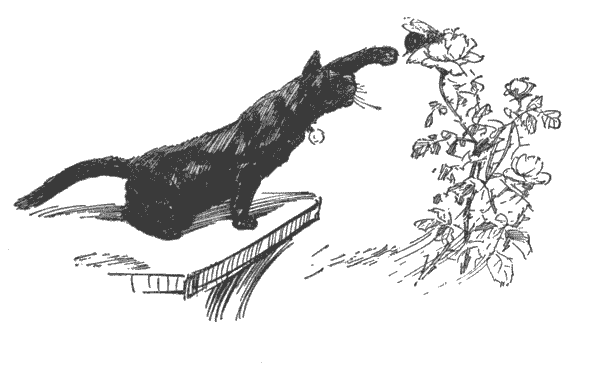
The garden at this season needs as much attention as time permits, and this suits him admirably. The scarlet runners are all in bloom and the young tomatoes showing. The onion crop, a new venture, has already provided flavoring for the cook and we have homegrown lettuces daily.
The gardener’s private bee, as she calls him, is back for the season, or perhaps he left the address for his heir before he passed to the Elysian Fields. There is at least a strong family likeness: he is a bulging fellow and the way he dives into the tightest flower head first, kicking his heels, is astonishing to see.
Sam still attempts to swat him if he comes too near and cannot be persuaded that this is undesirable.
The warm weather is good for a cat’s health and he soaks himself in the sun until it becomes too strong. How many of his nine lives remain, we wonder anxiously, noticing that he never now sits on the parapet, or leaps to the ledge of the balcony from which long ago he fell and lost, perhaps, one of them.
An old, quiet cat, we say sometimes to each other, but, speak to him, and his glance is as alert and bright as in his heyday. Two tusks show when he smiles, and after a meal he will sit down, lick his doubled-up forepaw, and carefully polish each in turn. He has not too many teeth now and seems to know it is important to preserve what remain.
He is having his coat brushed and gazes up with pleasure as his valet performs. These things in the stress of war are too often neglected. The ridge along his spine stands up; his fur is lustrous still; having had enough of the brushing, he leaps away and is gone.
An old cat? He is still young enough to sit on the gardener’s pillow at daylight and tap her face; to emulate the penguin for his cream at breakfast; and to desire a spic-and-span appearance. A favorite photograph of his friend in New York, which survived the bombing, stands in its usual place, and he is often found surveying it from the arm of a chair—taking sartorial hints, no doubt.
He is, in fact, co-operative and gregarious, up to a point and no further.
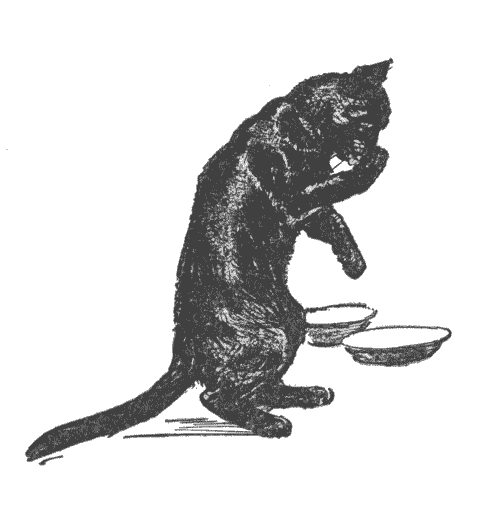
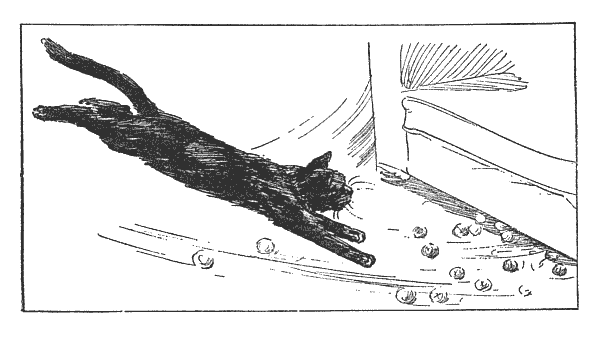
 am has had only a cat’s-eye view of the war
and what the history of his days reveals of
his friends and neighbors is devoid of great
drama or thrilling incident, yet true as far as
truth may be discerned from without. Ordinary people
came and went, escaped with their lives, suffered loss,
were terrified perhaps but did not show it, joked, grumbled,
helped each other spontaneously and looked, with
gratified astonishment, at the morning.
am has had only a cat’s-eye view of the war
and what the history of his days reveals of
his friends and neighbors is devoid of great
drama or thrilling incident, yet true as far as
truth may be discerned from without. Ordinary people
came and went, escaped with their lives, suffered loss,
were terrified perhaps but did not show it, joked, grumbled,
helped each other spontaneously and looked, with
gratified astonishment, at the morning.
Nine lives! They all have need of them.
Death was always round the corner and may be there again at any moment. Those who desire hot news of it must look elsewhere than in this simple chronicle of a cat of London up to the summer of 1941.
Written at a window looking over his native city, it has been decently clothed for the printer in another high room, with a cream carpet and a different delectable view of the great metropolis.
Learning that my friend who would have performed this valuable service for me was working fourteen hours a day for the war, Alison and Biddy seized the chapters as they were finished and carried them away. As I look at their impeccable pages of typescript, never a comma misplaced nor an allusion misunderstood, with the awe of one who regards a typewriter as an invention of the devil, I am confounded by the varied accomplishments of the pair and their energy.
They accompanied a strange warden into an empty house one evening and helped him put out a fire that was beginning to lick through the windows. They happened to be passing and it was not a war fire, but due to someone’s carelessness, they said. Had it taken hold, however, it would have made a beacon for the enemy, that is certain.
I wonder if they read Greek in the original or have a pilot’s license. I am ready to believe anything.
Their collaboration has brought Sam’s story more directly into the war zone. They have dropped the pages to go on duty and drive their chariots of mercy to stricken or burning streets. He should be a proud cat.
Other girls, meanwhile, are driving cars and lorries night and day all over these islands from which even the road signs have vanished. Sam met one of them. She came to collect a table game which seemed just the thing for one of the lonely units guarding us far from towns. They have no known address and the game was too large for the Post, so we had asked for transport. Almost before there was time for a reply a young Amazon in khaki was on the doorstep, demanding the game.
It was not packed, but she waved away such irrelevancies and seized it, spilling the silver and colored balls in all directions. The cat of the house was delighted. He jumped from his basket to chase them under the furniture and she crawled after him, fishing beneath tables, chairs and cupboards, deaf to our protests.
“Don’t you worry. I’ll get them. Come on, cat, now where did you put that one?”
Calling him by his surname indeed! Sam sat firmly down and left her to play by herself.
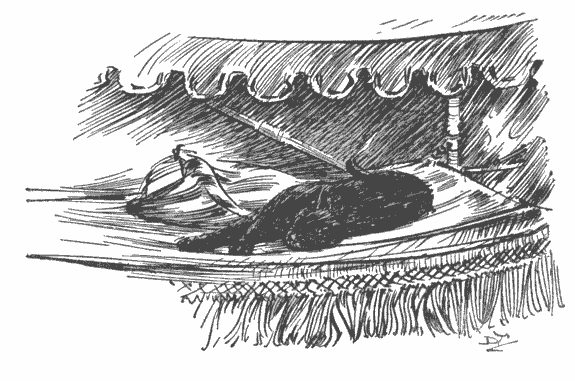
An amusing girl, she might have known us all her life. She marched off at last with the thing under her arm, Sam following her to the lift in a suspicious manner.
“Yes, you think I’m a burglar, don’t you?” she said to him familiarly.
He stretched, yawned, turned his back and ascended to the garden, lurching a little from side to side like a sailor who has been long at sea.
Stairs are tiring to an old cat, and now he always takes them easily, pausing when accompanied, to look up in search of assistance and often sitting down in the fairway if it is not forthcoming.
He reminds us of the Pekinese seen in the park one day, obstinately sitting, while his sourfaced attendant endeavored to drag him along by the lead.
“Madam,” exclaimed a passerby indignantly, “pick up that unfortunate animal. Such dogs were meant for an Emperor’s cushion, not for the race track.”
We pick up our royal cat.
Inevitably, perhaps, total war totally absorbs the thoughts and interests of those involved in it, except philosophers, cynics, the witless, and the frigid. Whether this is good or bad in the eyes of the onlooker, it is the road to Victory, the first notes of which are beginning to sound in the ears of the enemy all over Europe.
Perhaps there will be no onlooker tomorrow, except the Quislings who had sold their souls.
Odd things come back to mind, the looting Germans going from one French household to the next taking the bed linen, so mean a theft in a career of monstrous crimes. Didn’t they in the last war load up trains with pianos from the Balkans?
Then there are Mussolini’s virile fascists, who poured poison gas on Abyssinian women and children and flung Arab leaders out of airplanes, appealing to Britain to save not merely their women and children but their troops from the fury of the tribes. And being civilized, she did it. Our twenty thousand troops and sixty-eight field guns took Italy’s East African Empire, with its one hundred and seventy thousand troops and four hundred guns.
What will Vichy waters be called after the war?
Do the enslaved and plundered countries dream of a day of poetic justice when they shall swarm over Germany buying out her shops at a currency to suit themselves? Done with dignity and order it might be a salutary lesson.
“Freedom is the sure possession of those alone who have the courage to defend it,” said Thucydides. Greece has not forgotten her ancient wisdom, and the debts civilization owes to her are not all in the past.
She beat the fascist armies of Italy and now under Hitler’s monstrous New Order, they swagger as conquerors in her streets.
On the spot where St. George is reputed to have slain the dragon, the Vichy forces in Syria surrendered to our victorious troops, an augury at last!
Bombers are flying overhead, outward bound and our own, to pay a few debts abroad. They will cross the occupied countries V-formation, their crews perhaps not merely Englishmen and other Britons, but Czechs, Poles, Norwegians, Dutch, Belgians, or Free Frenchmen, brave men all, with the best reason for hitting hard.
The armies are gathering and daily now new bombers fly the Atlantic to join our own, not to aid Britain but to defend America. She is awake to her danger; so benevolence is not in question, though our citizens have had much of that too from her kindly people.
This morning the V for Victory signal, three short taps and a long one, resounded on our door knocker.
The girl who drove the cars out of a garage under fire appeared, a V embroidered on her white coat.
“I saw you had the sign up,” she said, pointing to a V on the door. “It is all down the stairs and at the entrance.”
We had not seen it, but there it was.
The cat of the house was resting after an expedition in search of salad. He lifted a drowsy head to greet the visitor and his white tie had turned into a V, or so she said, and we were quite willing to strain a point and believe her.
Poor Sam, his young friend is leaving him and he does not know.
Nervously and with hesitation because of her “neutral” country she applied to join the Women’s Auxiliary Air Force. “Are you a British subject by birth?” asked the form she was given to fill in. “Yes,” she wrote firmly.
“For there wasn’t any Republic when I was born,” she declared, “and I didn’t agree to it.”
She went for her medical examination and was passed A1, but she was still full of despondency and apprehension.
“Suppose they say it’s a foreigner I am?” she argued.
“But many of your friends and even cousins are in the army,” we reminded her. “What is the difference?”
For a little while she would be comforted.
“Suppose the war was suddenly over and I hadn’t done anything for England,” she said next. “I wouldn’t be able to hold my head high, and me so proud of staying. With Germans over there in Dublin, why wouldn’t they be treating me as a foreigner?”
“They’ll take you, but these things are always slow.”
“Will they be going over there to inquire about me, do you think? Will they be telling my mother I’m wanting to join the Air Force, and she thinking they mean to fly the planes?”
It seemed unlikely “they” would go to these lengths, or recruiting would be rather a lengthy operation, and we said so.
“It would that.”
She realized that she would be one of many thousands, a difficult feat to accomplish at any time.
And then at last the long-awaited letter came.
She had been accepted; she was a Waaf; she would wear the famous light blue uniform; some day she might even be a sergeant, if only the war lasted long enough.
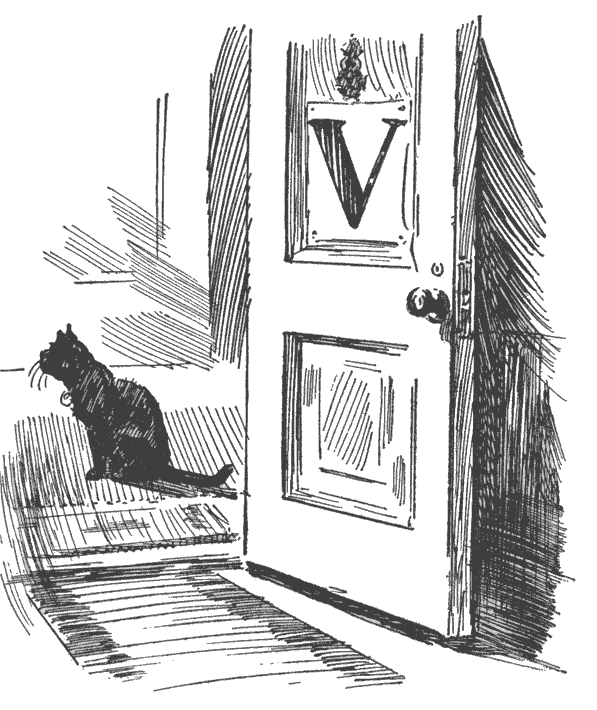
“You be careful how you treat a member of His Majesty’s Forces, Sam,” we heard her apostrophising the cat of the house, a rehearsal no doubt for her next meeting with the boy friends.
He walked at her heels, alert to the triumph of her eager voice, his tusks gleaming. He could not guess, fortunately, the secret of her high spirits and, judging her tastes by his own thought, there was liver on the premises. He stood up at last and tried to turn the handle of the frigidaire.
“Ah, it’s a clever boy you are!”
They will give her ten days’ notice and then she will go to an air field or station somewhere in England, to live as a soldier on a soldier’s pay until the war is won. This will be her home when she is on leave as long as the bombs of the enemy do not fall upon it. In the meantime she is copying all her choicest recipes in order that she may feed heroes well, for the men who fly the fighters and bombers and the men who condition them must not go hungry. She dreams of the banquets she will provide them.
“I’m not a foreigner,” she says with satisfaction from time to time.
It is fitting perhaps that this little chronicle of a cat of London should end on the eve of her departure, his faithful friend for three and a half years. He is making his sacrifice for King and Country, and if the price is high, he will bear it, no doubt, after the first incredulity when the nights pass and she does not return.
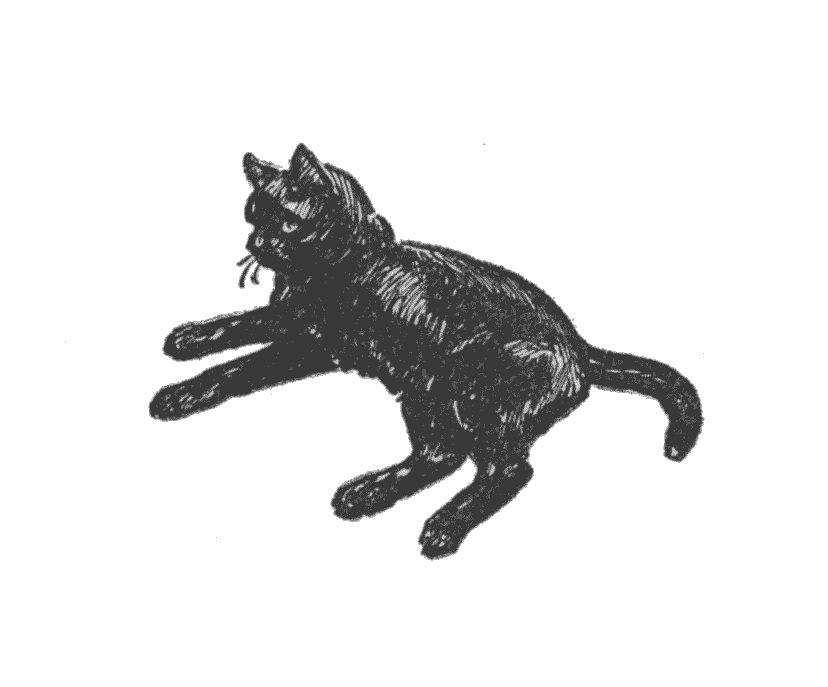
THE END
TRANSCRIBER NOTES
Misspelled words and printer errors have been corrected. Where multiple spellings occur, majority use has been employed.
Punctuation has been maintained except where obvious printer errors occur.
Book cover is placed in the public domain.
[The end of Nine Lives. A Cat of London in Peace and War by Alice Grant Rosman]